In Nomine Superiors 1: War and Honor by Mors Rattus
War and Honor
Original SA post Superiors 1: War and Honor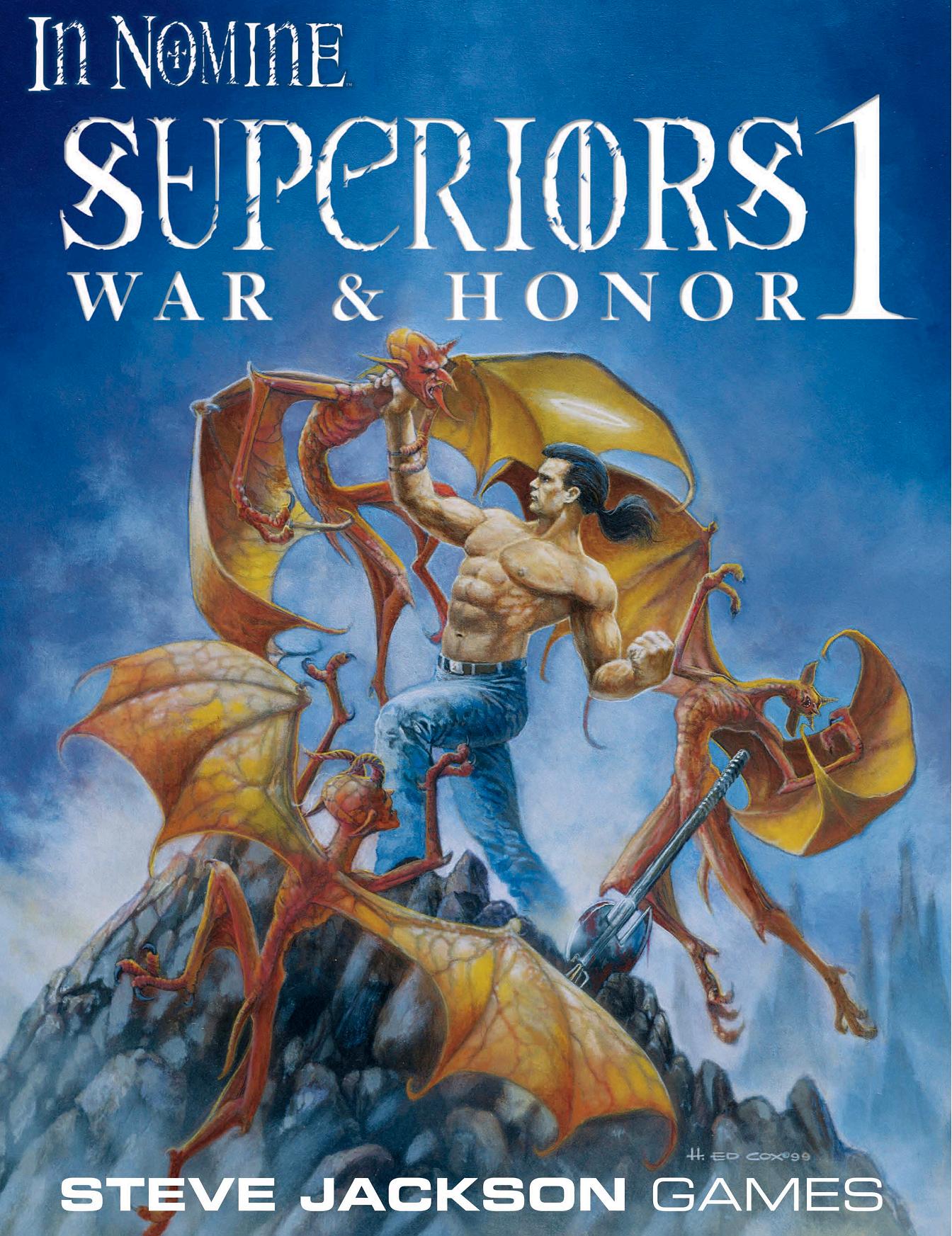
Superiors is a series for looking closer at various Archangels and Demon Princes, giving them more options and a closer examination of philosophy. The first book only has Archangels in it - David, Dominic, Laurence and Michael. They are the Archangels most active in fighting the War directly, forming the front lines and primary militant faction in Heaven.
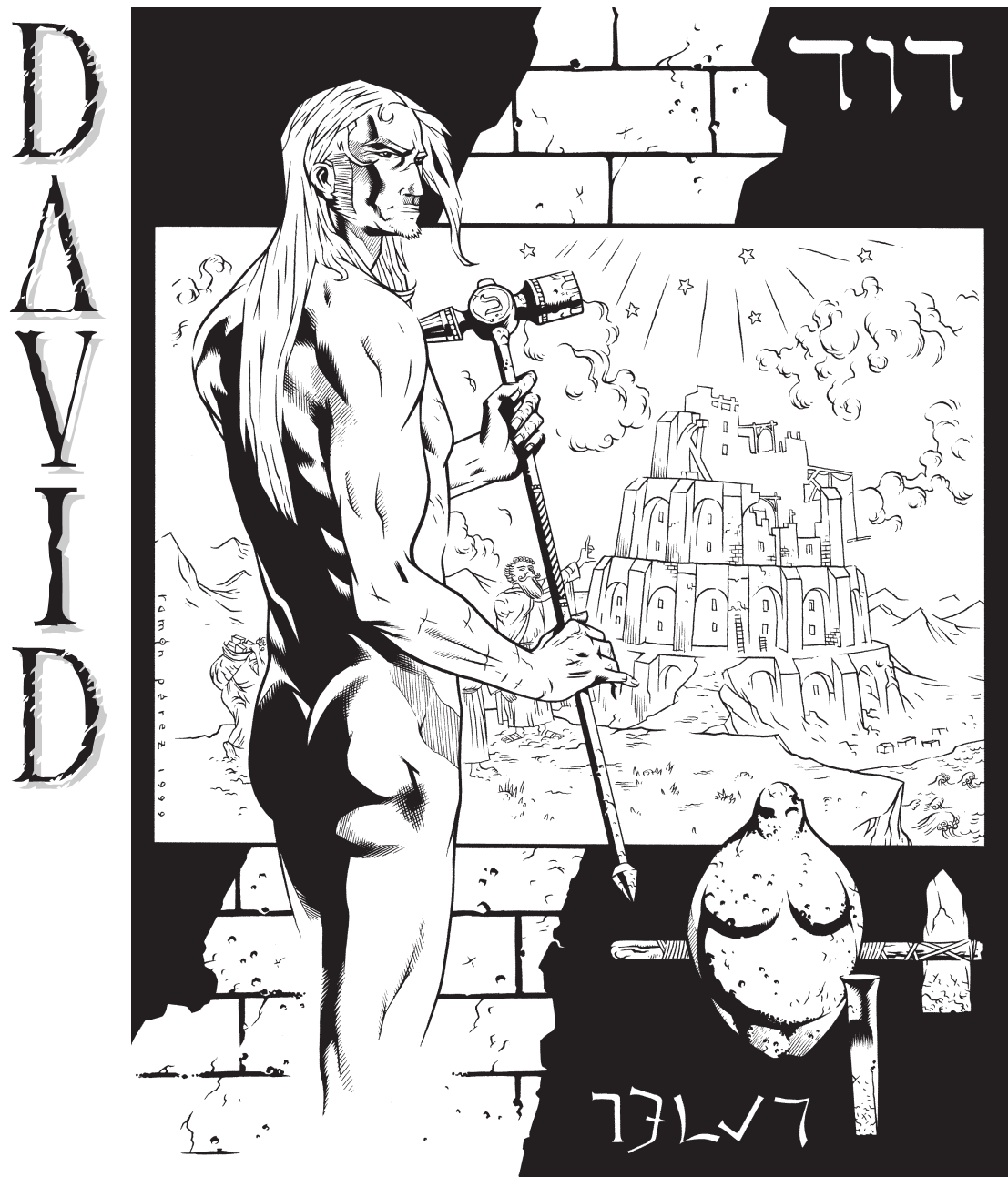
David helped build the world, before he was a Malakite. He and his angels made the first shelters, taught the arts of potter and metalworking. After the Fall, however, David became a Malakite and focused on helping people find new and better ways to commit violence. David feels responsible for humanity, strengthening them by terrible labor. His angels encourage humans to band together for strength and protection, even to the point of gangs and militias, often groups that involve the angels directly in their network of loyalties. Some angels see the angels of Stone as brutal and cruel, but they worry about being brutal enough - they might allow weakness to endure, after all. Stone angels never question David and are legendary in their loyalty. In a human vessel, David is always commanding and has gray eyes. His appearance never really changes, though minor details like race or size can vary. He's usually naked. He also sometimes manifests as rock. His angels try to embody strength, courage, loyalty and patience. They specialize in reactive strength, allowing enemies to take the offensive before crushing them utterly. They are forceful and vicious, but also honorable and faithful.
Bright Lilim of Stone , if they exist and David cares enough to give them their own attunement, always know the best way to shape stone and minerals, particularly gems, to a given purpose. They also penalize their victims' Will rolls by (Corporeal Forces) when geasing someone to an act of loyalty.
Armor is a new Servitor attunement allowing to spend Essence to create a layer of mineral armor. Each point of Essence gives +1 Protection, to a max of +6. ! Essence is clay, 2 is copper, 3 is crystal, 4 is granite, 5 is iron and 6 is gemstone. The armor forms over your clothes and carried possessions, and while wearing it, you can move and fight but not speak. It lasts (Corporeal Forces) minutes. Kyriotates can use it while in stone vessels, and the higher levels actually transform the vessel as well. Protection from different sources, as a note, is cumulative.
Brotherhood is a new Servitor attunement allowing angels with it to pool their HP. All damage done on servitors using this power count against the total HP of the group, and as long as any of them have HP left, they all stay conscious. All participants must have the attunement and must touch each other while invoking it, spending 1 Essence each. This lasts (total combined Corporeal Forces) minutes, and none of the angels using it can die unless all of them are killed. Otherwise, when it wears off, damage is divided as evenly as possible between them, leaving each at least 1 HP.
Geomancy is a new Servitor attunement giving the power to perceive enerfy patterns, or ley lines, generated by rock formations. With a Perception roll made within an hour of dawn, you can tell the best place to stand at dawn, regenerating 2 Essence instead of 1. If the Perception roll is CD 6 unmodified, you get 3 Essence. You need to make a new roll each time you invoke this, due to solar flares and shifts in the planet's magnetic field.
Inevitability is a new Servitor attunement that you can invoke for 5 Essence when pursuing a foe. Until you stop chasing, deliberately slow to a brisk walk or catch your foe, the foe can move only at half speed, in or out of a vehicle, and halves the CD of any Running, Driving, Swimming or similar roll. Cars fail to perform, they trip, whatever.
Rock Hard is a new Servitor Attunement allowing you to spend 2 or more Essence to harden a limb, multiplying the CD of any unarmed attack with that limb by the Essence spent. Multiple expenditures can harden multiple limbs, and it lasts for (Corporeal Forces) rounds.
Master of X is a new Distinction. David offers a variety of Master distinctions, each giving a variant of one of David's attunements. A Master of Earthly Armor, for example, can invoke Armor at will for no Essence as if they'd spent (Corporeal Forces) Essence. Masters of Geomacny who use Geomancy get (Corporeal Forces) Essence back that morning. An angel can have many Master distinctions, and the rarest are David's internal police, the Masters of Celestial Integrity, who can make a Perception roll to detect dissonance in Malakim. All of these Masters are Malakim, and David has never given out the Attunement version of the title since before the Grigori were Outcast.
Silent Angel is a distinction given to those who take an oath of silence after discovering one of Heaven's ancient secrets. They add (Celestial Forces) to all rolls to resist powers that would reveal the secret, and other rolls to protect the oath at the GM's whim. This can even black celestial resonance, though it tells the person resonating that David shielded the information personally. It is used not tactically but to guard the mysteries of Stone, and confers no special rank, just respect.
David can also teach the secret Songs of Battle, Stone and Numinous Corpus: Rock, all in the Liber Canticorum.
David offers the following Rites to servitors that he wants to encourage towards certain behaviors:
1. Bring more than 20 humans together for the first time in a good cause.
2. Inspire an enemy's self-destruction of redemption.
3. Restore a traumatized child's self-respect and inner strength.
4. Break a demon's hold on a community.
5. For 3 Essence, kill a demon of Malphas in vessel or soul.
6. For 4 Essence, substantially improve local construction practices.
7. Inspire the construction of a large stone or brick monument to those who died struggling for a worthy cause. You get 1 Essence for each day the construction goes on and you actively help, too.
8. For 4 Essence, build, by hand, a one-room stone house large enough to fit two people comfortably. 6 Essence if you consecrate it as a place of worship.
9. For 6 Essence, encourage a human to endure terrible labor and see them succeed without celestial interference. It must be a labor the human didn't believe themselves capable of, and must be in the goal of broadening their horizons and boosting their self-esteem.
Common Oaths for Malakim of Stone include:
1. Encourage the oppressed to resist oppression.
2. Scourge the weaknnes from my soul by punishing my lapses from virtue.
3. Permit no slight upon the name of David or the Word of Stone.
4. Build a community from the angels I work with and limit the acrimony within it.
5. Struggle weekly, and daily if possible, to make whole communities which might otherwise die.
6. Hunt the demons of Malphas and roust them from their lairs.
7. Guard my comrades' lives and souls before my own.
8. Teach humans to loathe those who reject God.
9. Bear material loss without flinching and never become attached to possessions or status.
10. Use no weapons.
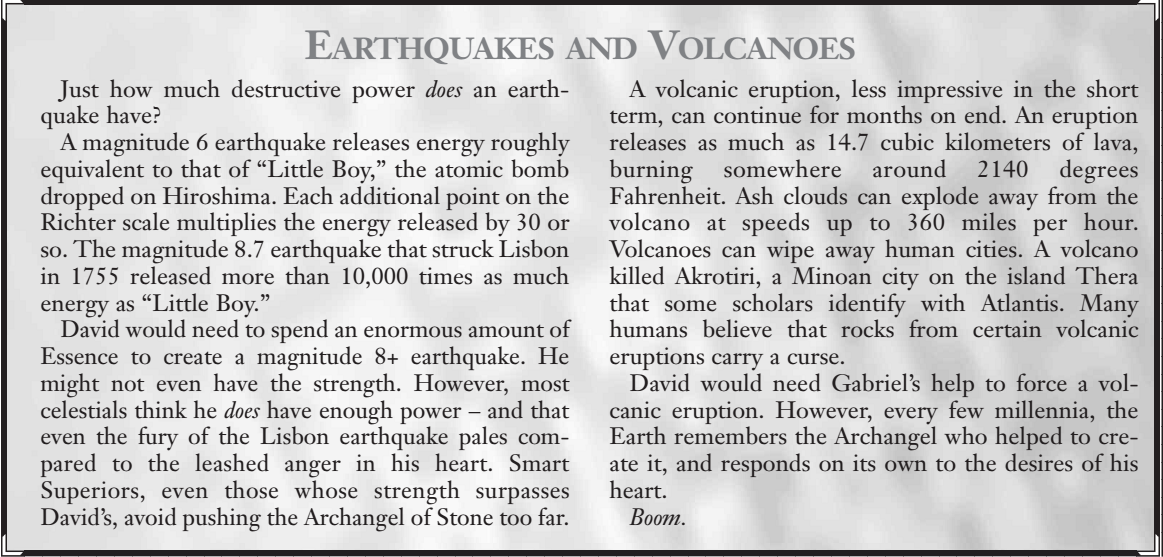
David has many names that he uses on Earth, generally ones that relate to his celestial name or his Word, but not all. In the West, he goes by Carrick, Daniel, David, Mason and Peter. In India, he is Akshay and Bhudev. In the past of America, he was Lonato. In Africa, his names include Foluke, Manu, Yorkoo and Zuberi. In Japan, he is Ishi. As far as anyone knows, he only has one human shape that he uses in vessels. It is said that Eli made a vessel for him near the beginning of time, and David loved it so that he swore to use it until it failed him. It never has. This implies that even his 'human' vessel is actually made of stone, just so perfectly shaped as to appear human in all ways. He adapts his appearance to location if he bothers to look human, though. If he doesn't adapt, his features are African in appearance and coloration. He speaks with a low, rumbling voice, and not very fast. He also moves slowly, with a hint of suppressed violence. He is patient with his angels, but once he makes a decision, he tolerates no debate. His Word is nearly omnipresent on Earth, and his power can reach almost anywher.e When he visits a place or person, he tends to just...arrive, approaching from nowhere in particular.
David governs the mineral substance of Earth - ore, gems, simple alloys, dirt, sand, clay and stone. He controls the Earth's crust and mantle, as well, and is responsible for the uses humans and angels find for the hidden treasures of the planet. Angels of Stone hunt the demons and monsters that lair in caves or fissures, they fight Vapula's work on earthquake machines or to tap into the energy of continental drift, and they help Heaven find mineral wealth as needed. Stone also metaphorically represents strength and fortitude, usually a passive and reactive strength, but also the destructive power of avalanches, earthquakes and volcanoes. In the beginning of time, God tasked David to cool the Earth and test its strength, shaping the molten product of his comrades' labor into a world. Later, he taught humans to build, and he still considers himself the Archangel overseeing construction. Craftsmen and architects glory his name, and he practices the art of mountain design, improving the aesthetics of Earth's peaks. He claims the concept of community, as well, the social equivalent of buildings. Their structure gives them strength that the components do not have. David watches over cultures, subcultures, governments, secret societies, criminal enterprises, religious herarchies, clubs, gangs and treaties. He shares authority with specific types of organization with other Archangels, of course. David tests, shapes and creates all kinds of communities. He once shared many of these areas with the Grigori, but now there are no Grigori in Heaven to contest his claim.
In the beginning, the basic substance of Earth was made by Lucifer, Michael, Baal, Uriel and Gabriel. David, then a Cherub, finished the job, shaping Earth's crust and mantle. (David considers Eli's work on life and surface topography an entirely new project.) DAvid's angels remain very proud of this. At first, David built alone. Once he made the basic structure, however, he created angels to assit him. When the world was ready, he withdrew for a very, very long time to meditate and watch geology. After humans arrived, God set David to teach them to use stone. David helped them make tools, cave shelters and buildings. He taught them to make weapons and to use sin'an, the first martial art. With the help of Novalis, David taught them agriculture, as his strict mission overrode the general prohibition on interfering with humanity.
The Fall was a shock for David. It roused him to anger for the very first time, and the fire of war changed him, alloying him from iron into a steel-hard Malakite. DAvid's enemies in the Host say that, in his anger, he slew even those angels that stood on the sidelines, doing nothing. After the battle, David cast six of his angels from Heaven forever for failing to fight against the enemies of God. Then, fearing his own anger, David swore he would never strike the first blow - that only those actively fighting God or His agents would die by his hand. After the Fall, David became sterner with mankind, realizing that if he had to hurt humans to teach them strength, he would. He did not abandon compassion, but started challenging humanity with ordeals, as well. If a weak human failed and died, the whole grew stronger. If they succeed, they grew stronger.
The demons came, and God made the Grigori. David loved the Grigori, and he was stricken when they went astray. Because of his love and sorrow, he took the responsiubility of hunting them and their children down. Afterward, his angels took over much of the work the Grigori had done. Time passed, and Uriel began his crusade against the creatures of legend. This gave David a problem - he wanted humans to take responsibility for their own dreams, but he agreed that ethereals did not belong on Earth, and Uriel was his blood brother. Eventually, David grudgingly supported the Archangel of Purity. When God called Uriel in to the Higher Heavens to end the Crusade, it surprised David. Uriel was one of his earliest comrades and had been the first of the Malakim. He was a key part of David's world, and David grrew even more troubled when God named Laurence commander of the armies of Heaven. From David's view, Laurence was barely finished, much less experienced, and surely David, the eldest remaining Malakite, should have command. Still, David did not question God. Presumably God had good reason, and he resolved to simply weather the naivete of the new commander.
As Lucifer's minions became better at corrupting human rulers, David turned his attention to the common people. He directed his angels to encourage humans to band together to fight for their rights and a better world. David has had a hard time adapting to the rapid transformations of human society these past few centuries. He longs for the days of hard muscle and stone walls being what measured strength, rather than industrial output and currency reserves. Rich nations have become soft and decadent, and while their works grow greater, part of David looks forward to the coming of chaos to hammer it into shape.
David's angels tell many strange stories of their Archangel. Some they consider holy, and others just mythical. In most cases, while David could verify or deny the stories, he does not. His angels do not want that, as shared secrets and legends help solidarity. It is said that David, the fourth name given to an angel by Yves, was also the thirty-eighth name ever . Only 37 concepts, they say, predate David. Thus, the number 38 is a sacred and powerful symbol for them. Some believe they need only sing the celestial name of a stone 38 times to bind it into service...though that requires becoming a Vassal of War, to be able to to speak angelic in the human world, which isn't exactly easy for them.
Some apocryphal tales of David: It is said that when DAvid found the first Stone angel to experience Discord, he disapproved greatly and took two knives, one of flint and one of coral. He used them to painfully strip away the madness and deformity of his angel, and the shreds fell to earth, where wild dogs devoured them. It is thus wise to sew flint and coral into a dog's collar, to protect it from inherited madness or disease.
It is said that during the hunt for the Grigori and the Nephallim, David found a group of Nephallim revelers. At the center of their festivities was a cannibal feast of roasted children. David turned the Nephallim into stone as they danced, forming one of the world's many stone circles.
Some true stories of David: David shaped the tectonic plates using his hammer, Antaeos. He set it down in the Jabal Akhdar mountains of Libya when he was done, and in the millenia since, it became a mountain itself. Angels of Stone sometimes make pilgrimages to Antaeos, and several Cherubim keep watch on it to prevent any Prince from trying to steal the hammer that shaped the world.
In the early days of hte universe, before humans were made, some of David's angels joined him in meditation. Most, however, lacked his infinite patience, asking for new duties within a century. A few of those who managed the first million years forgot how to think and act, becoming celestial statues. David did not wake them, for they had chosen their lot and he had no need for them. Hundreds of these statues lie now in the Catacombs.
During David's war against the Grigori, several ancient cultures assumed that he must be a Nephallim himself, for he was so potent. They named him Gog, the giant with power over stone. David kept tis name for some time, as homage to the Outcast Grigori. One of his Kyriotates, impressed by the story, took the name Magog. Magog was soon his most potent servant, earning the Word of Fortitude. As time went on. David delegated much of the job of testing and strengthening humanity to Magog. Magog served zealously, and for a long time he felt deep compassion for humans. After that, he felt a distant love. Then, he felt mere dedication to duty. At last, Magog felt only contempt and joy in his work. Instead of helping humans defend themselves, he pushed them to strike fist, to crush potential foes. David allowed this for a time in the hope that Magog would come to his senses. But in the ninth century BC, Magog incited the Assyrian king Ashur-Nars-Pal II into great acts of cruelty - mass executions, deportations, scourging and more. So terrible and so unprecedented were these acts at the time that Shur's name became a word of Hell's language and the Assyrian gods turned away from their people. At last, David confronted Magog, but the Angel of Fortitude did not repent, instead ranting a long prophecy or perhaps mere mad boast that David would join him in darkness at the end of days, once more wearing the name Gog, and they would scourge God's followers from the Earth. Immediately after this, Magog Fell. Lucifer named him Prince of Cruelty, but David made his reign short. With the aid of Khalid, Angel of Faith, and a band of Stone's greatest warriors, David tracked Magog to his fortress under the Sahara, fighting him there and sealing him and all of his demons in a tomb of impenetrable stone, covered by the sands. Magog was lost to all, and Lucifer, unable or unwilling to find the prison, left Magog to languish.
David took many steps to be sure that even after the Purity Crusade, humans would have reason to become strong and independent in the Marches. He disassembled several great terrors that walked the world, recording their structure in written form an trapping their essence in the ley lines. This would allow him to, one day, remake them. Few of David's angels know this story, and all that do are Silent Angels about it, reflecting on it only in each others' company.
Next time: Innagada Davida
Stoned as Hell
Original SA post Superiors 1: Stoned as Hell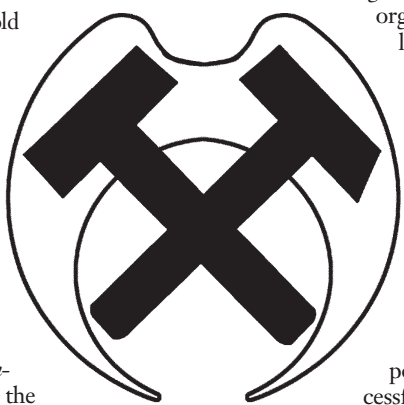
David's symbol.
David is one of the original Malakim, and he has no patience for exceptions or violations of honor. To him, integrity is vital to the Symphony, and the demands of his code are as the voice of God. He never breaks the spirit of his given word or goes back on a bargain, and he retains the dogged persistance of the Cherubim and the patience of stone. He kept much of a Cherub's protectiveness, but he gives his loyalty now to things larger than individuals. He guards humanity, Earth's purity, Heaven's sanctity and the very concepts of family and society. If a few humans have to die to keep all that safe, so be it. If a legion of angels must die to keep that safe, so be it. He refuses to hide this from others, as well, and expects the rest of Heaven to be as calm and cooperative. David's confidence and convictions are more than absolute - no human could ever possess his unconditional, unwavering loyalty to his beliefs. Aware of God's ineffability and the limits on even Archangelic knowledge, David does realize that on any given issue, he could be wrong, but when he makes a final decision, every angel in Heaven could not change his mind. It wouldn't matter if his oldest friends told him he'd gone wrong - he'd defy them to serve God as he saw fit. Only his faith and his honor limit the cold rage that burns in him, and only his loyalty to God exceeds his devotion to his friends.
David does not make snap judgments, and can spend days or even weeks making up his mind, which can be a problem in a crisis. Especially when dealing with Technology's demons, which often pose philosophical as well as military problems, Stone can go into holding patterns for days. DAvid considers himself partly responsible for the rise of Nybbas, having hesitated to stop the existence of TV, and by the time he arranged for community pressure against it, it was far too late. He keeps trying, though. David is the the representative of the slowest elemental force, and nothing will change David from the ways he's had for millions of years. He is not passionate, and he shows emotion only rarely. It is hard to impress him, positively or negatively, because he's seen it all. David is calm, and his calm can make him seem cruel. When his angels blunder, he might withhold aid, to let them succeed or fail on their own. If they die...well, he'll avoid making an angel like that again. If they survive, they grow stronger. David loves his angels, and to him, that's why he has to be this way.
David's angels must be largely self-directed. They often go to great and terrible extremes to win his respect. He accepts that the world works in a sort of two-steps-forward, one-step-back way, and he's seen his greatest works crumble to dust. As long as something can be salvaged, it's still worthwhile. Empires rise and fall, but each learns a little from the one before. DAvid doesn't claim history or historians as his purview, but he does offer them patronage. Even compared to other Archangels, he is unnaturally patient. He moves without hurry, nearly invisibly, but with a deep inevitability. If Janus desired to cleanse Baltimore of demons, he'd strike with terror and speed. Stone would not - they have killed only a few more demons in Baltimore than Hell can afford to replace, and they've done so every few decades for the past 150 years. David's power and knowledge are both limited, so he sometimes fails, but he never gives up. It may take millions of years, but he will bring Gabriel and Eli back into Heaven, he will revenge himself upon Lucifer, he will cut Marc down to size and he will destroy Malphas. Compared to Michael, David is inert, reactive. Compred to Jean, he is slow. But this is not lost potential. David is calm and deliberative by choice. He defends one of the oldest Words against attacks across the entire world. He dedicates great time and effort to killing demons. He's accomplished a very great deal. H is endless, continuous service escapes notice only because it is slow and steady.
David has sworn five Malakite Oaths. His honor governs his entire existence, and he has chosen to ignore the personal cost of what he does, to never take the easy road. He abides by his word as easily as humans breathe, and his integrity is stronger than his life. His first Oath is this: Never abandon faith, even in the lowest of the Fallen, until I have no choice. DAvid studied those he killed after the Fall, and realized it would be all too easy to despair in his fellow angels, to distrust all of them. He realized that true faith in God's plan meant ot weighing the odds of betrayal or measuring the chance of redemption. It meant believing in even the most despicable demon unti lthe point beyond hope, and then a little more. David, even then old and experienced, phrased his oath practically, not mentioning hope, but the spirit remains with him. His second Oath: Strike only to defend my charges or to respond to an opponent's violence. David knows that sometimes, he's wrong. He has one of the best senses for evil in the world, but it's fallible, and that's not good enough. Civilian casualties are acceptable, but accidentally targeting an innocent, that's not. That would push him into being a monster. David acts only against his enemies when he has a more specific reason than hatred, and it is from this that his dissonance condition stems. His third Oath: Never suffer an evil to live when it is my choice. David genuinely believes his passive, slow approach is the best way. He believes Hell must destroy itself on the stones of Heaven, which must act as the agent through which they destroy themselves, not a crusade of aggression. David doesn't need to be offensive. Random murder of demons is not helpful. Rather, David acts when a demon crosses the line and initiates use of force. And then, even if it were his former servitor, David must destroy it without regret. His fourth Oath: Never surrender or allow myself to be captured by the armies of Lucifer. David swore that on the battlefield of the first war. It has never crossed his mind since - he's never had a reason to surrender or been threatened by capture. His final Oath: Permit yourself no cowardice. Use no coward's weapons. David means cowardice in decision-making - the concept of cowardice in battle is alien to him. But this means that he must take action, regardless of the cost in lives. He would do this anyway, but the oath eliminates temptation. Coward's weapons, to David, include all ranged weapons, including thrown ones, but not Songs. He believes it morally cowardly, as they separate the wielder from the visceral consequences of their action.
David's top priority is service to his Word. He supports communities, protects what is underground, teaches craft and construction and strives to toughen humanity. He fights hard in the War, sure, but not on the offensive. Some question his supprot of dubious and violent subcultures. David has no doubt. He believes that any human with faith in their fellows will display ethics and honor, if not morality. He supports criminals because while their code may not be nice, it exists . They have some intefrity. That's important. As long as the group can be tolerated at all, humans are better off with it than alone. David's activities in the mineral world are on a geological time scale - he has several projects begone in the Proterozoic Era that are only new reaching completion, and a recent exciting inspiration regarding crystals will likely require at least 220 million years for him to test.
David reasons that by opposing God, demons have embarked on an exceptionally self-destructive course, and eventually, each must commit themselves to its inevitable end or change their mind and Redeem. As soon as they commit themselves entirely, they doom themselves to destruction. It might take a few billion years to make up their minds, though, and it might take as many for some to die, but in time, all must either Redeem or die. David's goal is to speed up the process. Any demon destroyed by STone, given David's beliefs, has almost certainly made their choice. He suspects that no Prince, including Lucifer, will ever turn their back on Hell, but because he cannot know this definitively, he never preemptively attacks them.
David cherishes both his friends and his enemies. Gabriel is his oldest friend, and he supports her when he can, though the reverse is not always true, as his compassion often resembles cruelty. His ties to Michael are more one-sided - David goes further in friendship than the more independent Michael. Laurence and Janus actively court David's support, and these five angels generally vote together. Jean and Jordi are but occasional allies. David approves of them personally, but their Words have caused conflict with him before. Blandine opposes him, as one of the war party, but she isn't acively hostile. Novalis hates David as much as she can hate anyone. She saw his transformation into a Malakite as a betrayal of his principles, and she despies his attitude toward humans. David remembers her as an old friend, but now considers her priorities irrelevant and kind of insane. David actively dislikes Marc, who embodies much of what he wants to remove from humanity. The fact that their factions oppose each other doesn't help, either.
Superior Opinions posted:
Normal text is that Superior's thoughts on David, italics are David's thoughts on them.
Blandine: He is brave and strong, but there is so much more to life than strength and bravery. His dreams are as dull and barren as any stone.
I fear that the pain of Beleth's loss sometimes clouds her perceptions. Her hostility toward me has not yet exhausted my patience. After all, some trials take years to work through, and some take eons.
Dominic: David is loyal. Very loyal. My task would be simple if all the Host were like him. Still, he should take care that others do not misuse his loyalty and betray his trust.
Dominic gets his job done. We've got to be strong and pure if we're going to win this fight, and he weeds out the weak and treacherous. I've heard some of the others griping about the way his servants are always snooping around. Tough. Better Dominic's agents than Lucifer's.
Eli: He's as much a builder as a fighter. People forget that - he forgets that himself, sometimes.
One by one, my old companions go away. On the surface, Eli's abandonment of Heaven demonstrates every quality I condemn. Unlike Dominic, however, I trust that there is more to the story.
Gabriel: Some things are eternal, and David is one of them. I envy him his devotion to duty and am grateful for his friendship, but at times he is too hard and cold. Stone is very strong, but ultimately it must be broken down and put through the fire to be of any use.
She is what we will all someday become. Pure, primal, unfettered, just as fire should be. She is the unstoppable force to my immovable object, yet we are more alike than different. I hear her roar echoing deep in the earth; how long can her rage be denied?
Janus: We're not exactly best friends, but David is reliable. I want him on my side.
Working with him can be difficult, yes. Communicating with him can be difficult at itmes, especially when he treats a second like a millenium. But my feelings do not matter. We need him. He directs Heaven's efforts in directions I would not think to.
Jean: He is a valuable colleague and a valiant warrior. My only complaint is that he lives too much in the past. David still thinks in terms of eons, but the battles we fight today are waged in nanoseconds.
Modern technology hurts humanity more than it helps. I accept that someone must watch over its development, however, and Jean is the best angel for the job.
Jordi: David has seen and understands. The weak die, the fit survive, and nothing lasts. Why get upset over the latest crisis the humans have managed to inflict on themselves? The planet will not mourn their passing long.
I understand Jordi's stance on the humans more than most. Jordi's insects practiced building, craftsmanship and community long before I taught humanity these things. I value the human spirit, but our work could go on without them.
Laurence: David's courage and steadfastness are unequaled, and he is an asset to our cause. Of course, there is more to waging war than brute strength.
Steadfast. Determined. Focused. It's fair to say that I approve of the youth, and we've worked well together. Laurence has an edge on his soul that puts his sword to shame. - Of course, there is more to waging war than dreaming up flashy stratagems. I could do better as commander of Heaven's hosts, and he knows it.
Marc: His views are outmoded and simplistic. I can't understand him, and I'm afraid he can't understand me either.
Marc believes I don't understand his work. He's wrong. It's a series of compromises and fictions. Speculation. Money without backing. Lies. Greed. It's playing into Lucifer's hands.
Michael: Among the few I consider worthy of the title of Archangel, David stands unique. He and his angels are brave and strong, and never pick a fight themselves. I can't think of anyone I'd rather have at my side in a fight than David.
My oldest comrade-in-arms. He believes that he can fight alone, perhaps even defeat the whole of Hell alone, but this does not alter his capabilities. He knows what he's doing in abttle, and he understands that this is a War we have to win by any means necessary. My Servitors aid his.
Novalis: David has lost so much, and the tragedy is that he thinks he is better for it.
Once upon a time, her ideals made sense. Some time in the distant future, they may well make sense again. In the mean time, I advise my Servitors to ignore her angels' twittering.
Yves: The noble agents of Stone serve God's plan - and they will continue to do so as long as they stay true to themselves. But a stone can sometimes be shattered by a single blow.
We don't work the same way, but I trust him as I trust myself. I respect him. How can you do anything but respect him? Only Michael seems bitter towards Yves. Michael's reasons do not convince me.
Andrealphus: Sadism, masochism, leather culture, big burly vessels - I have the greatest respect for Stone and its ideals. I also appreciate the confidence David and his Servitors have in the ultimate rightness of the world and their actions; it makes manipulating them child's play.
Lust's Servitors fold like paper dolls in a fight, and strong humans can ignore all Andrealphus' temptations. However, Lust can inflict enormous damage if it gets to a weak human before we do.
Asmodeus: David does not play games. This makes him, ultimately, a pawn. Heaven's hierarchy manipulates him, uses him like a slave - a strong back and a strong arm to support even their most ill-advised military schemes. He does not acknowledge htis; they do not acknowledge this; but the pattern is clear.
Asmodeus spins Gordian knots of intrigue, well beyond my ability to unravel. I do not bother unraveling them. My hands can tear the strongest knot.
Baal: A worthy opponent, although not really flexible enough to compare to Michael or myself.
I have some respect for Baal. He has chosen to redefine his concept of God until it no longer resembles reality. This is a terrible crime, but less terrible than his peers' rejection of God.
Beleth: One day, his absolute convictions will destroy him. When he accepts the truth of his personal nightmare - that the world has no clear moral compass, that God is not purely good, and that his own harsh actions are therefore gray - it will toreture him every moment thereafter for the rest of his existence.
I consider her pathetic. Her gaudy displays of malice impress no one. Her Word gives her absolute power over something unimportant. Demon Princes who fixate on ghosts and shadows aren't worth my time.
Belial: Stone doesn't burn, but it blows up real well.
All the fire in the world won't destroy the things I care about : stone and the human soul. Belial thinks physical destruction matters in the War. That makes him an insignificant buffoon.
Haagenti: Nothing like a terrible ordeal to get your appetite going.
A corrupting, weakening influence on humanity. I hope to have the opportunity to kill him myself.
Kobal: "We've secretly replaced David with a Habbalite painted black. Let's see if anyone notices." My Servitors like to help his Servitors overestimate a human's endurance. A Stony gets this priceless expression on his face when he realizes he's pushed a human over the edge into ruin or damnation.
A prancing jackanape. He claims a sophisticated sense of humor, but the truth is that he laughs like a hyena. It's a meaningless, animal, predatory noise. All it means is that he's hungry for more suffering.
Kronos: David does not have the moral strength to intervene forcefully when he must. He opposes my work ineffectively at best.
Kronos gloats over luring humans to their fates. It reminds me of a human boasting about his last one-night stand. It's spiritually meaningless and sordid. In the end, the will of God will prevail, and the concept of fate will become as obsolete as the Word.
Lilith: Old as stone, slow as stone, thick as stone. He refuses to believe that I have any honor whatsoever. So I never, ever try to start a fight with him.
Lilith offers "the easy way out." Unfortunately, there's no such thing. That means she couldn't give you a good deal if she wanted to. She always cheats you. It's what she does. It's what her Word means. She's a demon and must be destroyed.
Malphas: Ultimately, his existence is unacceptable. His Word makes him and his angels dangerously unable to comprehend the truth of how the world functions.
I own a sword, in part, because killing Malphas bare-handed would be nauseating. His work directly opposes my own. Destroying him is my first priority in the War.
Nybbas: Makeup! Get some pants on this angel! No, seriously, if Malakim started Falling, I'd make this guy an offer he couldn't refuse; can you imagine the ratings he'd get as an anchorman? Solid, respectable, worldly, deep voice, broad shoulders...I have it on high authority he looks smashing in a suit.
The Word of the Media incorporates older infernal ideas like slander, libel and hate speech. This gives it power. I sometimes doubt, however, that he still controls the Earthly media. It seems to be growing out of control, lashing out at infernal and divine causes both.
Saminga: Stones do not interest me. Unless you throw them at people. I like that.
Much as he disgusts me, I devote little effort to thwarting him. If he lost power, Lucifer would replace him with a more intelligent Prince. The pool of less intelligent demons being so small.
Valefor: David can be distressingly unmaterialistic for the guy who shaped most of the material. Doesn't he get it? The side with the most stuff wins.
Valefor is shallow but smart enough to be dangerous. He can't handle it when someone refuses to be impressed by him, though. Heaven can use that against him.
Vapula: A petty, self-absorbed fool with rocks between his ears.
Take everything I dislike in Jean, multiply it by a thousand, and give it an ugly makeover. You get Vapula. He isn't even a credible opponent - more like a natural force gone out of control.
Ethereals: Never negotiate with an angel of Stone. Either he hates you as an abomination against his God or he doesn't. You're not going to change his mind. As for David himself, shun him. Fear him. The blood of some of the best of us is on his hands.
They invade the humans' Earth. They seek to violate the natural order of things. I show them the error of their ways when an opportunity appears.
Humanity: I love them. I do not compromise with them. I do not give them "leeway" and "room to grow." I teach them the strength they need to reach Heaven, and I do not accept failure.
Soldiers of God: These humans, with limited minds, limited bodies and limited perception of God's will, nevertheless discover faith and self-sacrifice as real as ours. They are one of the wonders of the world.
Soldiers of Hell: Some we can salvage. Some have chosen their Fate. I do not choose to weep for them.
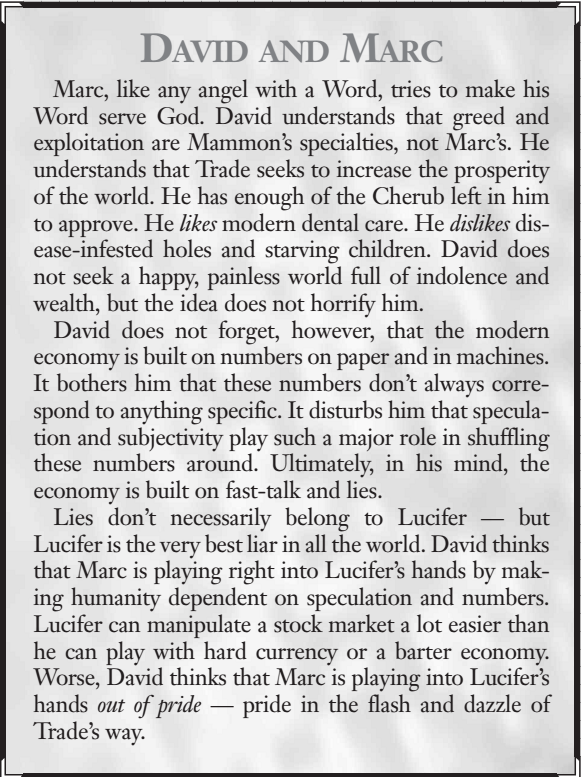
The game offers two alternate takes on David. David the Patron focuses more on the Community aspect ofh is Word, sponsoring only organizations with the highest moral fiber but throwing the full power of Stone behind them. His angels work at every level, political, corporate and religious, to align world communities with the divine plan. Many humans associated with the right causes know vaguely how to get in touch with David in his identity as 'The Calculus,' a mysterious figure that smooths over problems for those who have given to the community. In person, David is nice and friendly, still very Cherubic, with a cheerful calm and a certainty that the War will end well as long as Heaven protects its interests. David the Buffoon, meanwhile, is a moron. He thinks slowly and poorly. He misses obvious details, and his orders reflect the mindset of a child, but no one dares point it out, as he gets irritated when reminded of his limits.
David's Word is strongly reflected in his Cathedral, the Catacombs. It is a wrren of tunnels and caves that hold many secrets, and only David knows them all. It resembles a sprawling underground palace that fades into unshaped caves as you head up or down. Beyond them is only the bedrock of Heaven and the occasional elemental Tether, reaching deep into the reaches of Earth. heaven's light is dim in the Catacombs, and only awareness exists, not sight. They lack visual beauty unless you bring a light, but remain Heavenly, and the radiance of your soul allows for awareness. In the furthest reaches, 'flight' is impossible, and caving equipment is needed.
Some angels, called Catacomb-dwellers, spend their entire lives underground. If David knows that an angel will join their ranks when he makes them, he will adapt them to the environment - softer colors, larger arms, longer limbs, more flexibility. It's all within the basic Choir parameters, so it's only obvious when a lot of them gather at once. Other creatures adapted to the underground live in the Catacombs - strange insects, blind fish, impossible grotesqueries. Some of these are the souls of cave-dwelling creatures. Some tunnels, normally off limit to angels but not to animals, connect the caves of the Savannah to the Catacombs. A few are leftover prototypes from when David and Eli designed subterranean life. Others are oddly-shaped relievers doing maintenance. Sometimes, David punishes an angel with a strange and alien shape as well. For the duration of their sentence, these angels look at the far edges of the Catacombs in pain, discomfort and shame. It's never pleasant, and ends only when you prove your endurance. Some of the strangest creatures are transformed angels, while the rest are things David made for some specific purpose.
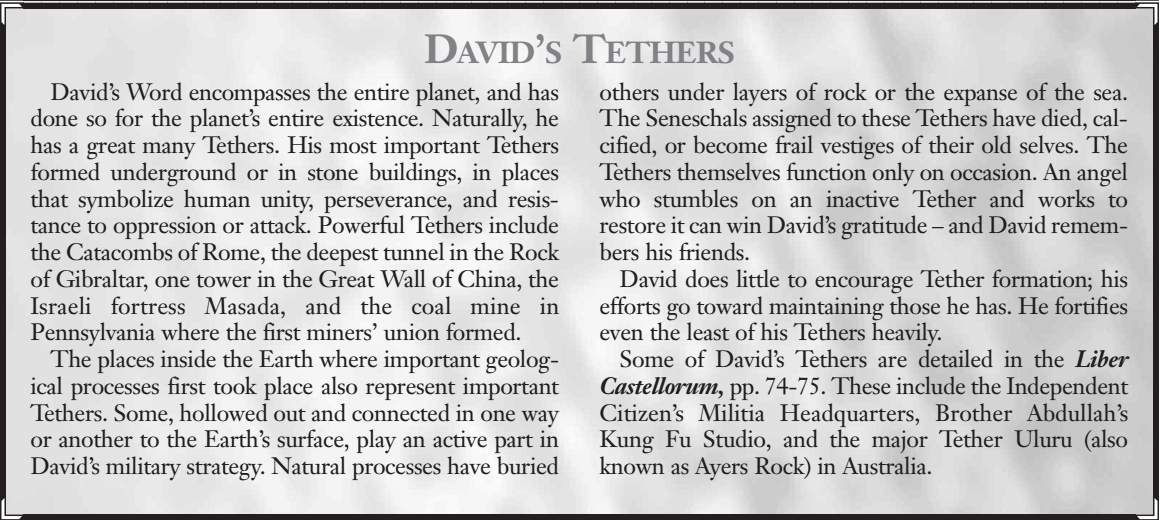
Next time: Trying to make Heaven sound like an interesting place to RP in.
Stoner Sunshine
Original SA post Superiors 1: Stoner SunshineNear the center of the Catacombs, not far from David's audience hcambers, is the Alcove of the Table. It began as a simple table of thick gray stone, but David found a new purpose for it after Lucifer's Fall. Now, whenever any angel of Stone Falls, David takes the shards of their Heart in his fist and compresses them, reducing them to tiny needles covered in his blood. He then hammers them into the table, point-first. When the final shard goes in, the tops of the many-colored needles form a mosaic. Above the table, gold veins in the black marble wall spell out 'Our Failure.'
The Cave of the Freedom of Reflection is full of razor-edged stalactites and stalagmites. Angels who find their perspective clouded by prejucide or bias enter the cave, making their way from one entrance to another. Each long cut flays away an assumption as well as part of their skin. It never causes more pain than needed and does not deal soul damage, but it is painful. An angel that takes a long trip through the Cave emerges as unbiased as a newborn reliever. At the GM's option, they can make an Intelligence roll to resolve some problem they failed a roll at before. However, there are dangers. Every so often, an angel starts to question if they should leave the Cave, and then that they are in fact an angel, and so on, until an angel of Stone goes in after them and drags them out.
The Cave Where Wind Walks Through Stone is set high in a mountain on the edge of the Groves, open to both the Catacombs and the open sky. A constant wind howls through it, pouring in through the cave mouth and out via a blowhole. It is the traditional meeting place for angels of Stone and the Wind.
The Cryptic Isopods are immense crustaceans that live near the central Catacombs. Each is so large it can fill a tunnel from top to bottom, and their cave home could hold a legion of angels. The angels often fail to notice them entirely in the darkness, however, giving them their name. David occasionally gives an angel armor made from one of their cast-off shells. Any onlooker must make a Perception roll to notice that the armor exists, even if it covers the angel's full body. David made these creatures himself, as a living extension of the nature of the Catacombs.
David's Chessboard is a Zen garden of uncertain size, which helps David track the War's movements. Tiny stones represent the various players in the War, with a handful of geodes representing Superiors. Many Kyriotates of the Catacombs understand just enough of the arrangement to move the stones in a small section of the board as news comes in. David occasionally meets his angels in this garden.
The Lace Coral Meander is an isolated spot in which the Necessary Order of Worthy Angels of Stone initiates new recruits. For seven thousand years, their blood has fed the coral structures in an underground river bend. For the last several millennia, the once-pink coral has instead begun to radiate incarnadine, and angels of the Order often keep a small piece of it on their person or near their Heart. Anyone who swallows a piece of the coral regenerates 1 Essence, but the Order finds this action sacrilegious in the extreme and takes it very seriously.
The Obsidian Knife is a full stadium in length, and was the tool that David and Uriel used to become blood brothers. It now rests at the bottom of a chasm. Enchanters and relic-makers of Stone often find it worthwhile to climb the chasm and scrape off a few flakes of dried blood, though only with David's permission.
The Unbounded Aven is a blind shaft that extends upward from the ceiling of a large meeting hall in the central Catacombs. Most angels do not know that it actually is as long as its name implies - no matter how high you fly or climb in it, you can't reach the surface. A few miles over where you would expect to find the Groves, clusters of immense albino bats cling to the shaft. They whisper prophecies of the present, describing things happening on Earth at that very moment.
On Earth, there is the Cave of Transformation. David once punished two of his servants cursed by the Gluttony Discord by confinding them in the forms of a snake and a hound. When they asked how they might redeem themselves, he sent them to this cave in Korea, to live for a hundred days without sunlight, eating only a bundle of mugwort and a handful of garlic. The hound fled the cave after 38 days and suffered for years afterward. The snake was patient and bore with it, emerging in a human form and without Discord. The Korean ethereal Hwan-ung later used a dream of this cave to transform a bear into a woman.
The Descent of Feoras is a fissure beyond an elemental Tether. At its bottom is a lazy flow of molten rock. Angels that wish to know or verify the true desire of their heart cast themselves into it. After the first moment of contact, they wake sprawled in the Groves, with the true wish of their heart vivid in their mind. Despite the molten stone, their vessel usually survives...but the next time they manifest it, it will be caked in a layer of volcanic rock, neither healthy nor painless, which offers no protection at all. A good hospital or healer can break the bond sealing the cooled stone onto the skin.
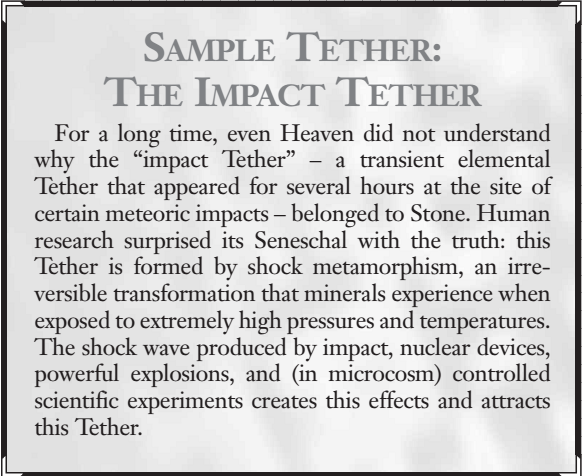
The First Gemstones were the models that David built all other gemstones from - the First Among Diamonds, First Among Emeralds and so on. They are immense, pure, flawless ad beautiful, able to exist either on Earth or in Heaven. David prefers to keep them on Earth, as he believes their beauty rightfully belongs there. Many of his angels take turns guarding the shrines or collections where each stone resides, but one, the First Stone of Amber, never leaves Heaven. It appears to have an insect in it, but does not. The creature trapped inside is a horrible mistake from the early days of the world. When David chose amber to trap it, it altered the nature of that stone, which is why amber resin traps insects on Earth.
Some angels of Stone, the Transcended, are ancient beings that chose to become one with the rock. REasoning that a few million years bonding with the world would help them, DAvid gave them rock strata 'vessels', making them an integral part of the Earth itself. Ofanim of Stone regularly visit the Transcended, to hear their wisdom and keep them mentally alert.
Khaila, Cherub of Stone posted:
People surprise you. Sometimes, even you surprise you. No matter how much you study someone's history, no matter how attentively you listen to her words, no matter whether she postures like a hero or wears meekness like a cloak...
You never know how someone will turn out until you test her.
Life boils down to a series of ordeals. In surviving an ordeal, however you do so, you demonstrate certain qualities - such as cowardice, if you run, or courage, if you fight.
In one sense, the traits that "come out in the wash" are the only ones you ever had. Until you achieve it, you never really had a destiny. Unless you find it, you never really had a fate.
In another sense, the tests you face change you. By making you show your strength, a test makes you strong. After such an ordeal, knowing that you are strong, you show your strength in everything you do.
David's angels do their best to find just the right tests to help people grow. An encounter with Stone can transform you - past, present and future - into someone stronger. Even if you are of the Host, which means that Stone doesn't have the authority to test you very hard, God probably has a tribulation in mind for you.
Stone also tests people for virtue. People who fail the test usually die. You may think that it's a bad test of moral character if the target has that kind of incentive to pass, but Stone believes that opposing God is just one more way to kill yourself, like shooting yourself or drinking poison. It's an action-reaction thing - if you attack God, an invincible entity, the reaction hurts you in equal proportion. Think of it as ramming a boulder with your head.
An angel of Stone, as God's agent, tries to manifest this process. She gives the Infernal Horde a simple test. It can attack her, attack God, commit evil, and commit suicide - one simple action with four names. Alternately, it can refuse, and while that refusal lasts, it's deluded , not evil.
After all, which is the demon: the Balseraph watching TV in his apartment, or the human panderer beating his "property" with a cane? Maybe, if you're Laurence, you think it's the Balseraph, but Stone'll kill the human every time.
Sometimes, angels of Stone kill demons and humans who don't first prove their evil. Angels have a right to kill the wretched, and Stone likes to bash heads. However, such a conflict has all the high moral character of eating a cheese sandwich. It's a good idea, but not an amazingly noble one.
Throwing the first punch sometimes serves Heaven, but most of the time, serving Heaven's ideals is more important. That's why Stone tries to throw the second one, instead.
David doesn't really use a rigid hierarchy. He trusts his angels and doesn't want to hassle them with procedure. He gives them structure, but it's more of a society of equals than a corporation or military. Short-term missions and long-term projects each get two sets of angels assigned. One set, sometimes even just one angel, shares responsibility and authority. The larger second set has no authority over the mission and only one job: they must give requests for help a fair hearing. Since they'll have jobs of their own, they can always say no. Only rarely does one angel of Stone have specific authority over another, though David does expect those angels with Distinctions and Words to get respect and deference. Situations where one angel can command others include large military actions, training missions and afffairs involving the Masters of Celestial Integrity, who can always demand help from other angels of Stone. They tend to impose additional structure on themselves, however. Most mission and project teams choose a final authority for situations in which debate could be deadly, and if someone disobeys that aurhority and it does turn deadly, DAvid can easily figure out where the problem was. Similarly, angels often divide up responsibility and authority over non-critical areas for convenience. More importantly, they oftne affiliate themselves with associations, societies or gangs outside their immediate assignment. In heavily populated areas, these groups can gather on Earth, but otherwise, they meeti n Heaven.
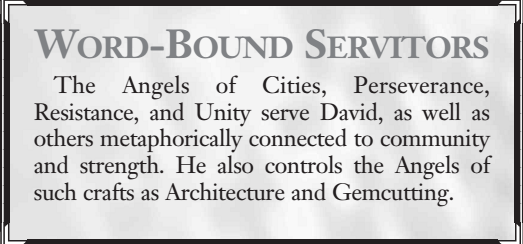
David makes his angels from Forces naturally attuned to his Word. They vary widely, but all of them manifest aspects of it. Most of them ,even those with no plans to claim a Word of their own, tend to identify with a specific mineral or community concept. Most of his Choirs do have a darker side. Angels of Stone need a hard heart. They can be brutal, blindly obedient and support unpleasant organizations. However, all of them love God and are ultimately selfless, self-sacrificing and benevolent. Each also exrpesses a ganeral facet of David's nature and virtue. Seraphim are his commitment to ideals, Cherubim his loyalty and patience, Ofanim his inexorable nature, Elohim his philosophy, Malakim his power and hatred of injustice, Kyriotates his fellowship and unity, and Mercurians his caring and protection. Bright Lilim who serve David mirror his tough love - they may not give you what you think you want, but they give you what you need.
Next time: Common traits of the Choirs of Stone a
I'm Running Out Of Stone Jokes
Original SA post Superiors 1: I'm Running Out Of Stone JokesSeraphim of Stone cannot hide from themselves the dark truths of their Word. They know that Stone can be violent, fanatical and xenophobic, that they use barbarous methods for good ends. They know that their work on Earth hurts people. They have to find ways to deal with it. Most of them do so by buying whole hog into the party line: God sanctioned their loyalty, brutal behavior, all of it, even the violence and fanaticism of the worst organizations they support. If God objected, after all, he would correct David. They, more than the other angels of Stone, put their faith in the mystique of gangs, organizations and solidarity. Their fraternities rarely resemble human ones, and common symbols of their loyalties include tar on the ridge over their celestial form's eyes, shards of obsidian in their wings, sharpened and polished scale patterns or discolor notches on the head or wings to count the demons they've killed. Some say this is vulgar and undignified, but the Seraphim usually see these symbols as representations of dignity, a status symbol. Some Seraphim of Stone go the opposite direction, embracing the peace and honesty of stone. They don't like interacting wit humans, preferring to remain in the deep places. Even when dealing with mortals, they tend to think geologically, which makes damaging a few human lives essentially meaningless, given deep time. They have a lot of trouble focusing on the here and now, so demons can often take advantage of them. Some Seraphim also manage the expansion of the Catacombs, directing the angels that extend and reshape the caverns. A few of the greatest, known as conduits, work alone, sliding through Heaven's bedrock and living caves behind them. One of them took on the humble vessel of the Shamir Worm, helping Solomon build his temple without iron by hewing stone for him.
Cherubim of Stone want to make themselves obsolete. Their resonance helps Stone in its work - a Stone team with a Cherub always knows when they're pushing too far, thanks to the Cherub's resonance for their attuned, and so they know when to stop. Most Cherubim of Stone see non-Stone Cherubim as overprotective mother hens, and most non-Cherubim Stonies as loose cannons. Of course, even Cherubim of Stone make mistakes, and when they do, they spend a lot of time making up for the dissonance. They tend to be nearly as patient as David, and some of the Cherubim who have David's Kyriotate attunement have watched key sites in the bodies of statues for centuries, moving only to stretch or scare away graffiti artists. They don't bother pursuing or investigating - if they find the right spot and wait, whatever they want will come to them eventually. Most of David's craftsmen are Cherubim, and while they'll happily do repetitive tasks if asked, many have quite a fine touch. Most notable is the legendary sculptor Zuriel, of whom it is said that he can transform a black of granite into a beautiful expression of faith in merely five minutes with basic tools. Cherubim of Stone work hard on being passive defenses and solid walls against Hell. They don't stand by helplessly as the enemy prepares their guns, of course - but they have to draw the enemy into playing by their rules, focusing on the Cherub rather than the attuned. Many Cherubim of Stone receive intensive training in provoking others, and they protect things by going out and getting attention on themselves. The ideal, rarely achieved, is never even needing to fight back - just setting things up so that the enemy shoots themselves in the foot trying to hit them in the first place. David's Cherubim have a natural affinity for magnetism, and the smarter ones tend to enjoy electromagnetic theory and experimenting with it. The dumber ones can entertain themselves for hours moving fridge magnets around. While their attunement doesn't create true magnetism, it's a very close spiritual cousin of it.
Ofanim of Stone do not find it easy to reconcile their dual nature of motion and passive strength. They tend to be odd - marathon runners and living battering rams rather than speedsters. They lack some of the standard Ofanite frenzy, but make up for it in force. On Earth, they tend to be the stereotypical angels of Stone - rough hands, baseball bats, motorcycles and a bad attitude. They teach humans that nothing can stop them - not the Man, not the enemy. DAvid also knows that they're excellent infiltrators, rescue teams and getaway drivers, and some of his Ofanim are employed that way, but not often - he doesn't think in terms of infiltrations, rescues and getaways. Due to their ability to move through stone, David's Ofanium often enjoy spelunking and exploring the hidden places, using the underground Tethers to mine for gems and gold veins that humans will never see, or to visit the Transcended. They work will the David's Cherubim.
Elohim of Stone are classically old masters, peaceful, wise and willing to do whatever it takes to teach someone. They are naturally peaceful and tranquil, even more patient and reserved than most Elohim. Sometimes, they are slow to act in emergencies, but most of the time they function well enough. They are often martial artists, and the study comes naturally to them due to their perfect awareness of space and time. It doesn't automatically give them perfect timing or distance judgment - but it definitely makes it easier for them to learn it. They often have high Agility and Precision, and the more powerful of them can jog across a busy highway without getting hit, win any video game they play and more. Elohim that do not practice martial arts still practice mental discipline and Stone philosophy, striving for inner strength and courage. They usually believe that integrity is not part of the Symphony per se, but is a spiritual force that gives it life and makes it worthwile. David's Elohim regularly take on human students, raising them as warriors, leaders or htugs. Each job has its place in society. Even non-martial Elohim are teachers, using manipulation and their superior minds if they lack the physical skills to knock sense into their students. Even those Elohim on other assignments try to uplift humans when they see a chance. They rarely train other angels, as they prefer longterm learning relationshops, and most Earth operatives can't dedicate that kind of time to studying. They also often learn to raise underground creatures, keeping small gardens of insects and rare fungi as a form of meditation. They bring stability, calm and good sense to angels of Stone that might otherwise lack them.
Malakim of Stone are rough and have a commanding presence. They rarely bother with refinement - they'll have time when all the demons are dead. In the meantime, well, there's a war on. They put themselves through even harsher trials than they do humans, to ensure they have the strength to destroy Hell. Most of them think that other Malakim who won't regularly test themselves are weak, though unlike Habbalah, they won't make a production of it and generally don't scarify their vessels. Still, more than one has methodically crushed their legs to powder to punish themselves when David chose not to, then healed it later with a Song. Even the brighter ones, who find this mortification of the flesh childish, have that kind of determination. Unless they deliberately tone it down, they tend to scare people, not least because David likes giving them tall and intimidating vessels. They try to move with purpose, to avoid police interest, as they often don't belong...well, anywhere. They tend to have longer tempers than most Malakim...but far shorter than other angels of Stone. They tend to be berserkers who identify with natural disasters, and once a demon goes too far and dissonance no longer applies, they like to destroy evil with terribly fury. They have self control but enjoy not having to use it. A rock, after all, was the first weapon. David often sends angels who need to learn more martial arts to old and nasty Malakim, whose training is harrowing compared to even the most out-there martial arts movies. Malakim of Stone like unarmed combat or stone weapons. While steel blades are as much Stone as boulders, they prefer the simplicity of a stone knife or a fist, a more primal weapon that also avoids metal detectors. Fear and violence can often unite a community or teach courage, and Malakim do the jobs that need those tools. They run the worst gangs of Stone, at the edge of David's tolerance for cruelty. Using them as weapons, they encourage outsiders to band together against the common threat. It's hard work, and the gangs' souls and the safety of the outsiders are always in danger. Malakim with less ambition often work as fire-and-brimstone preachers, doomsayers or sellers of paranoia. They also spend a lot of time fighting and teaching by example or ordeal.
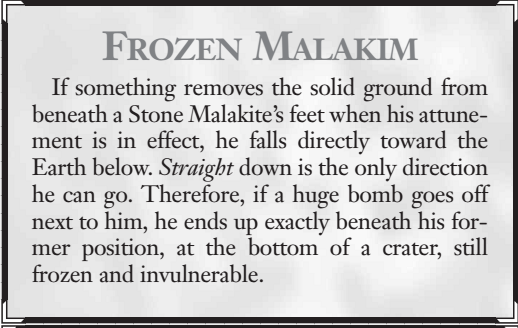
Kyriotates of Stone are the angels that care most about community. They idealize unity and harmony, and believe that both humans and angels need to work together to survive. They work to bring people together as best they can, and they tend to ignore the mineral side of Stone. They are archetypally young, eager activists - though many are not. They tend to make friends easily, support their friends implicitly, and insist that their friends follow the rules that keep society and fellowship going. At their darkest, they are like gang leaders who'll kill a brother for fraternizing with the enemy. At their highest, they will go to the wall and beyond for their friends. Sometimes, both at once, allowing an ally turned enemy to take them down rather than either forgiving them or hurting them. They tend to think of themselves as the support networks that keep communities alive. When danger threatens, most can appear in stone vessels to defend, and can fight without fear of dissonance. If they are physically strong, it is a deadly weapon. If they are not, it is at least an excellent shield for others. Many of them see themselves as champions of the underdog, believing like most of Stone that society breaks as easily as its weakest link - but unlike much of Stone, they see the loss of a weak element as a broken link. Many Stone angels would happily see fringe elements disappear if they can't survive alone. Kyriotates, however, work to make downtrodden and marginalized subcultures as strong as the mainstream. They use trials, to be sure, but also advocate and assist these people. In Heaven, several are tacticians, gathering information from other angels and bringing them together to spot patterns, which they then bring to David's attention as needed. Many Kyriorates on Earth have done work like this, but David always removes any sensitive information from their minds before reassigning them. In recent years, KYriotates of Stone have developed pure coda, a formal choral style that is growing in popularity. Two groups of ten to twenty Kyriotates each perform in the Catacombs or Groves, and it takes a mind able to multitask heavily to enjoy it - others describe it as chaos or acrively damaging to the psyche. David permits it anyway, for morale.
Mercurians of Stone know that no one is ever alone. Even the most personal victories need the love and support of others. Someone has to stand with everyone who might make it, or they won't. Someone has to help them, and then stand back and let them go. Mercurians of Stone help people build, make the weak strong and collect nice clothing. Most of all, however, they are sponsors. They encourage and provide tools for others to face their problems. If necessary, they give them a shove. They leave behind powerful, enabled people...and, well, sometimes ruined lives as well. Some humans don't have the will to overcome their conflicts, and failure destroys tghem. The Mercurians hate seeing it, but...well, them's the breaks. You can't solve someone's problems for them. Humanity, on some level, knows they exist. A thousand legends talk of sages or helpers who, for one reason or another, cannot be there in the moment of final crisis. Usually, their help turns out to be enough anyway, but...well, that makes a good myth. In the modern day, Mercurians of Stone try to be subtle and suave, but their basic approach has never changed. They once took over from the Grigori to help all of humanity develop, then stepped back to watch what happened. They have never forgotten that job, and still do it once in a while, teaching architectural techniques...though the basic principle of minimizing greed in construction has proven hard to convey. They identify with structures and buildings, and often have trouble resisting the urge to shelter others. They serve DAvid exceptionally loyally, and each must trust in his methods, in the belief that those they help outweigh those they hurt. For the Mercurian with the irght mindset, David's work is the supreme expression of their Choir. Most other Mercurians, with other Archangels, find the risks they take somewhat nauseating. Mercurians of Stne also quite like subways, and many use them as hunting grounds for humans that need their help.
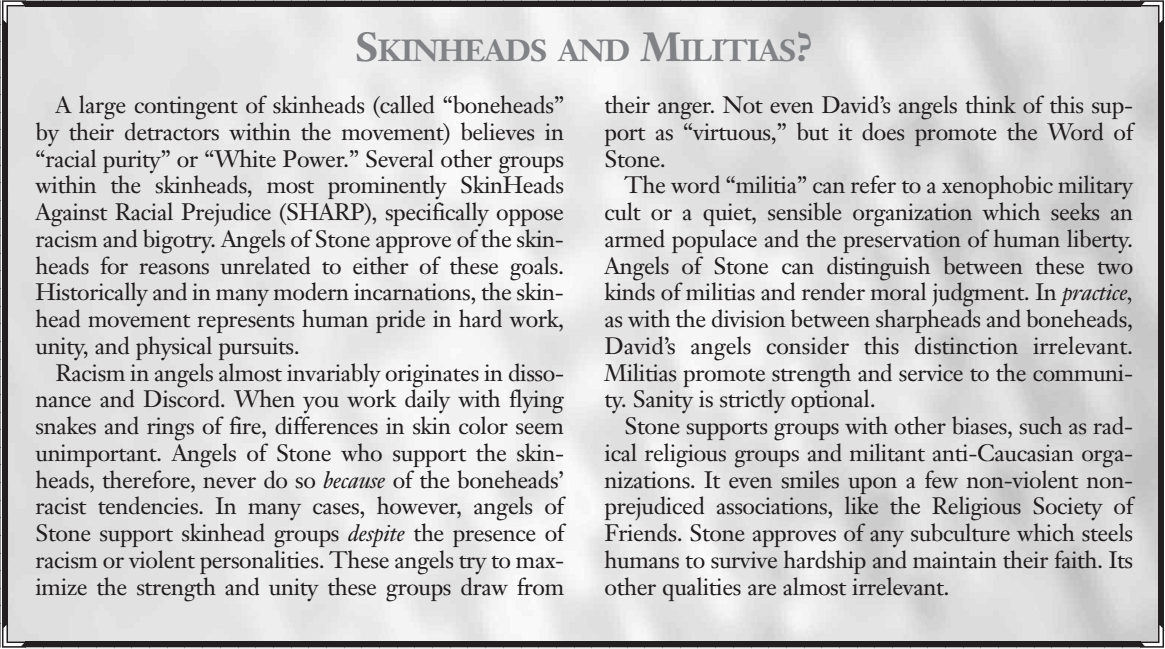
David does not discriminate against the Redeemed. Those who Fell and returned have suffered enough, after all. As for Hellborn that undergo Redemption - they are to be admired . Eac has overcome a truly horrific test of moral strength, wellpower and perception. While angels of Stone may sometimes treat a Redeemed comrade with cruelty or prejudice, they will never allow any other angel to do so.
David has had human servants since the earliest days of civilization. He taught the Celts to trace ley lines and the Chinese to perform geomancy. The greatest students of these arts became his first Soldiers. David's human servants helped build the great monuments of ancient times, integrating geomantic and spiritual secrets into their work. The greatest of these builders still work as Saints, helping to train new structural engineers. A handful of modern secret societies know those old secrets. Some grew on their own, while others David began after the Purity Crusade, to ensure that only lucid dreamers could rise to the highest ranks, so he could provide a bulwark against humans losing control of their dreams. Angels of Stone build human militant societs fairly regularly. Not many know they serve Heaven, but know the angels that lead them are good, for whatever that means to them. Since many of these gangs are violent, Stone has a lot of human troops. Every Soldier of Stone is tough, and all have at least 2 Corporeal Forces, and many have 3 or 4. They are fighters and counter-infiltrators, often taught the Songs of Form, Shields or Thunder. They are rough-edged but team players with leadership skills. David also has engineers and architects in his service, but they don't get made into Soldiers unless they can fight. DAvid's Saints tend to be pure leadership, finding loners and encouraging them to join groups, as well as finding groups that need a purpose. A single Saint can thus make an entire community of fighters, all without any of the inhuman traits that often give angels away.
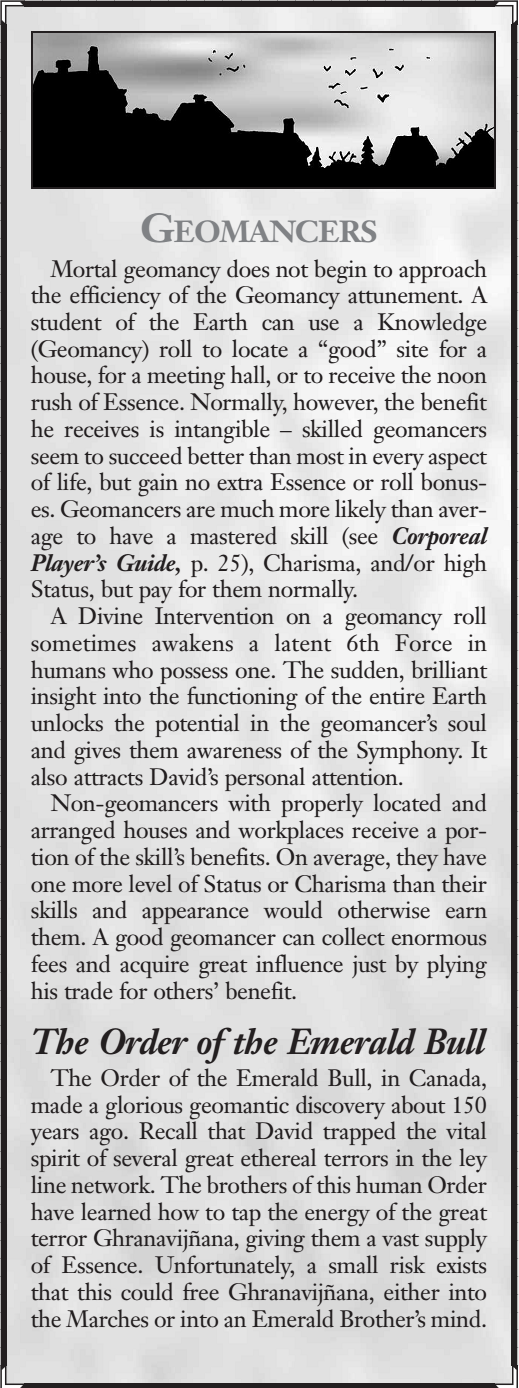
David uses the Catacombs to train his angels, and most of the angels of Stone that spend a lot of time in Heaven spend it learning martial arts, tactics and crafts. A few of them maintain the Catacombs or provide support services, too. Many sects of Stone angels peform bonding rituals in Heaven, and David encourages this, to build loyalty, so he leaves them time to do it in. He permits few of his asngels to work in the Marches, and those that do mostly use it to gain tactical information from dreams. They must have skill as well as desire to do it, and they need Blandine's approval. While David would be happy to argue with Blandine over serious matters, there's nothing to gain from it here. Most of his angels, instead, work on Earth.
While they may not like the work they have to do, angels of Stone love their jobs. Their fellow angels will not let them despair, fail or falter, and they are never alone. They must be strong, but they have the strength of many to draw on. They don't cry, but know that any word of sorrow will gain them the silent compassion they need. They may give each other the toughest love out there, but it is love, and a deep love. They are, after all, angels.
David is no kinder to his angels than to humans. His punishments are always great and terrible trials - warping an Ofanite's sense of time to make a day seem a millenium, but not making them move any faster, sealing a Mercurian away in a shell of stone, and so on. DAvid does give out lesser punishments for lesser offenses, or to angels he has no real expectations for. Discord is his favored tool, or if that would be too much, communal discipline - a flogging line, perhaps, or being made to flee a hunt of Malakim for a while. David ignores trivial sins - lectures are beneath his dignity. He is generous with rewards that are earned, however. Besides the standard rewards, he sometimes gathers his angels together so he can tell them of another angel's victory.
Stone and its angels make no secrets of their feelings. If they don't like you, they don't pretend to. They feel contempt for most angels of Trade. The smarter ones argue that Marc has allowed humans to pervert his Word into increasing personal fortune rather than global wealth. Dumber ones just say they're weaklings. Both types of angel, however, find the angels of Trade shallow. Most angels of Flowers hate Stone angels, but they tend not to return that hatred. Sure, David's angels respond fiercely to challenges, but insults and shunning - that's not worth noticing. As for the peaceful nature of Flowers, well, Stone knows that's not weak - it's just foolish. Angels of Flowers aren't afraid of getting hurt, after all, they just have silly philosophical objections to violence. Angels of Dreams and Stone rarely interact, and when they do, it's usually for shared purpose. Things are tense, given that angels of Dreams are often meaningful challenges, but it rarely comes to blows until after the mission succeeds. As for Judgment, well, Stone has no love for them, as they often feel that they should answer only to David. However, David's approval of Dominic means they usually cooperate. They never hide their own sins, but sometimes close ranks to protect others. In most cases, Stone generally treats other angels as dubious allies, and the feeling is mutual. Outsiders may not be like them, but they're on the same side. Even angels of Fire and War must earn respect - they just have the right to more help, thanks to David's standing orders.
Asking to leave David's service is asking for trouble. Often, it is taken to mean they are weak or reject the company of their peers. David likes neither. Rarely, though, after a few weeks of deliberation, often while making the angel a social pariah, David grants these requests. In one case, he even allowed a Seraph to move into service to Novalis, realizing that the request required immense courage and the Seraph genuinely wanted a deeper bond with the Flowers community. David typically removes the
Next time: Stone Gangs
Oh Wait POWER STONE, I Didn't Make A Power Stone Reference Yet
Original SA post Superiors 1: Oh Wait POWER STONE, I Didn't Make A Power Stone Reference Yet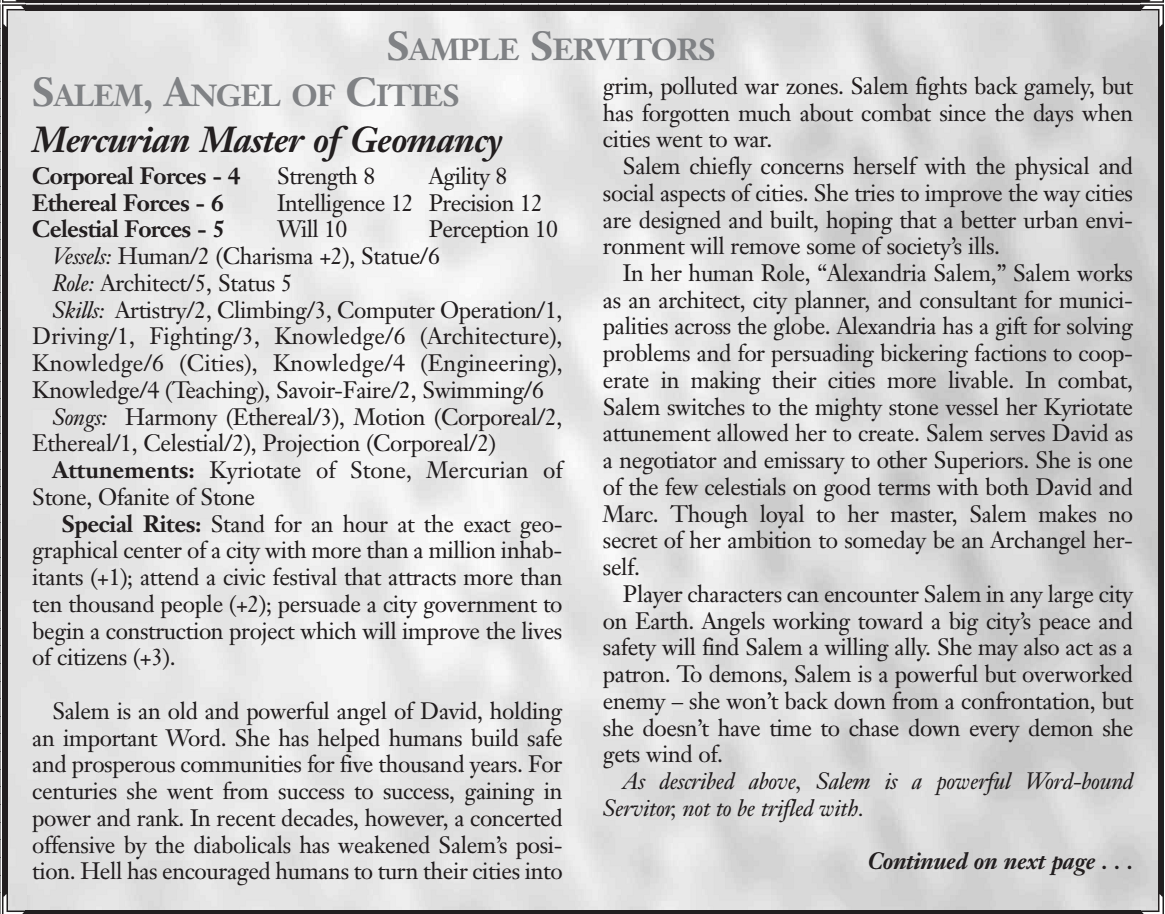
The Caver Brotherhood is a collection of Stone angels thjat sponsor human spelunkers, feeling that experience with the subterranean leads them to God. Many are also avid cavers and spelunkers, both on Earth and in the Catacombs. As a secondary focus, the Caver Brotherhood hunts down the demons and monsters that lair beneath the Earth. They are also on call when David needs them to head into some particularly alien environment - a Tether in perpetual darkness, a hunter through a city's sewers, whatever.
The Contiguous Karsts define themselves by their martial arts skills, alone and as a group. Each one is a potent warrior, and they fight together whenever they can. The swear deep vows of loyalty to each other and the grouap, and many give their entire sense of identity over to the gang. All of them wear jade jewelry as their group symbol, and some change their names to Karst or Jade rather than their celestial name. A few mutilate themselves, replacing their fingernails or even an eye with jade stone in their vessels. They are heavy believers in free will and the existence of angelic destinies.
The Granite Madams are a group of female-identifying angels who seek to destroy the social stereotype of weak femininity. They believe that it encourages strong women to fail. Some of them take on Roles as captains of industry, members of the criminal justice system or scientists, while others prefer to shatter stereotypes by showing athletic and intellectual skill while in Roles like fashion model or elementary schoolteacher.
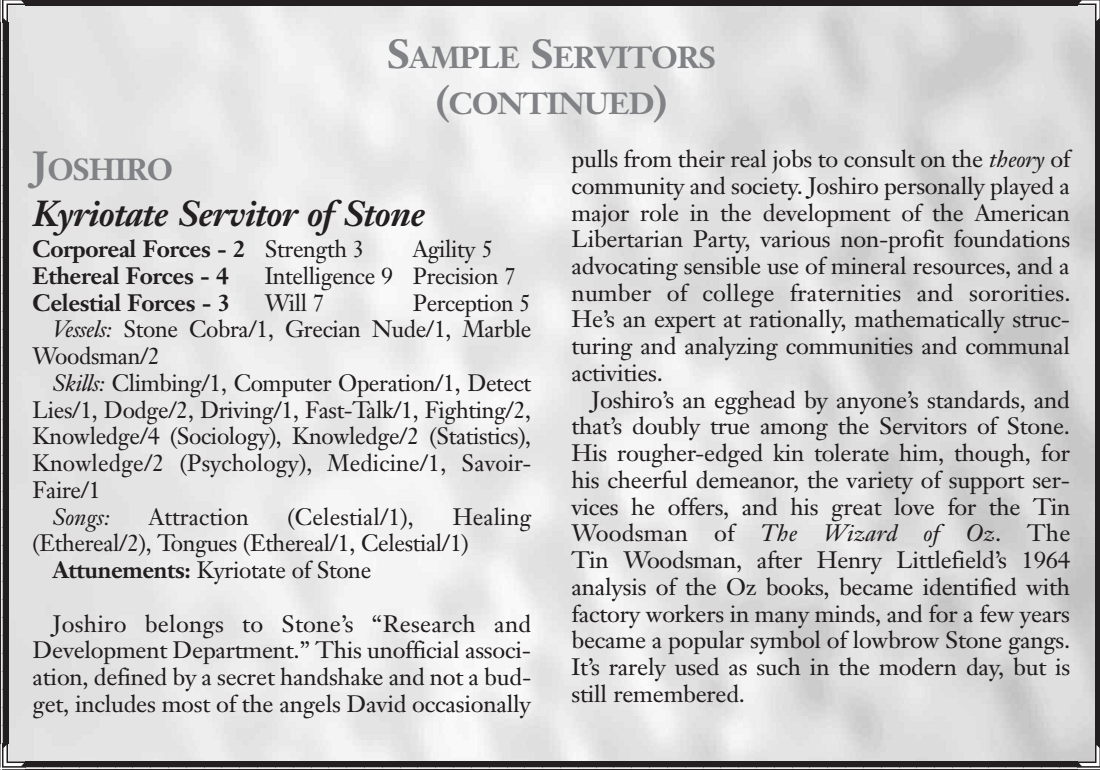
The Necessary Order of Worthy Angels of Stone hold a founding myth as truth: The Symphony cannot die or succumb to its fate so long as even 50 living beings remember the sacred poems of Ahmad Hosein, are coureageous and put faith in God's love. Thus, all members of the Order seek to do all of those things and thereby save the universe from evil. In practicaly terms, they tend to be interested in myth, ceremony and poetry, particularly because they need to memorize many, many poems. Some, however, don't like poems much and just suffer through the requirement.
The Snakeskin Gang have no deep purpose, but do have traditions and a hell of a lot of prestige. See, to join the gang, you have to skin at least three Balseraphs, preferably while they still live, and turn their skins into the fringes of a black cloak to be worn in celestial form as the symbol of your membership. New members also need to be arpproved of by three current members, which typically requires them to be able and skilled in many areas. The Gang often meets for meals, philosophical debate and storytelling, but their formal meetings always focus on new and interesting ways to kill demons, preferably messily. Stone may be reactive, but the Snakeskin Gang likes to react very viciously. They also have a few War angels as members.
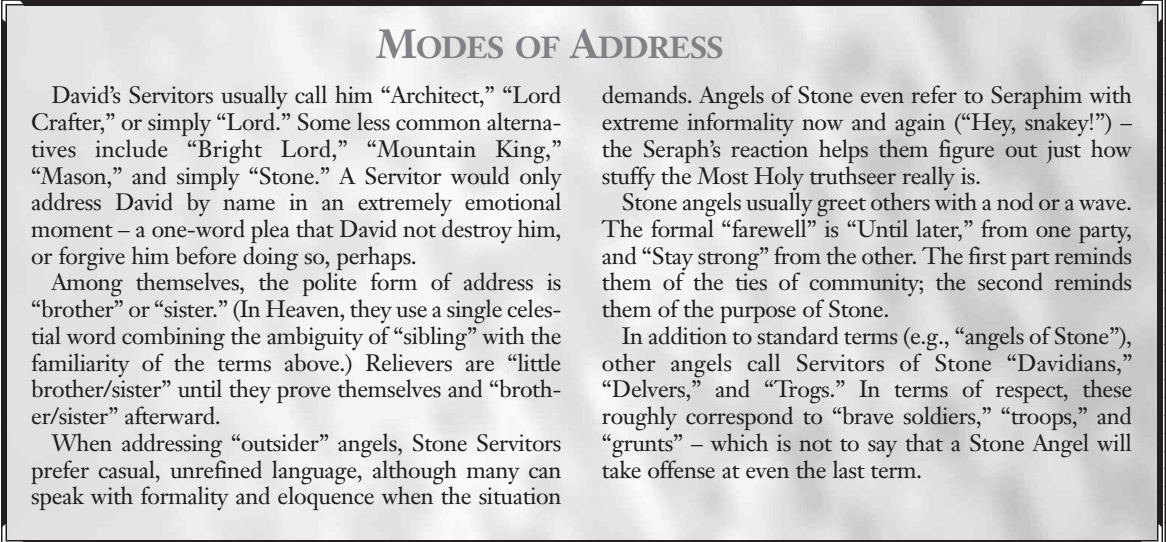
The Trogloxenes are Epicureans with a taste for the finer things of corporeal life. They're mor than willing to suffer for their work, but they see no reason not to enjoy good sushi or impressionist art when they want to. They indulge as a form of worship, reminding themselves of their holy prayer: How wonderful a world God made, that has these things in it. Groups of Trogloxenes gather occasionally to enjoy interesting experiences together, which usually bothers the humans present, given their somewhat brutish demeanors.
The Unyielding are some of David's older servants, who were offended by the choice of Laurence as Uriel's successor rather than David. They see Laurence as disdainful of their direct methods and are less tolerant than David is of it. They formed their core as a group willing to use strength when Laurence won't. David's honor would require him to act if they disobeyed him or defiled his association with Laurence, so many have asked David and Janus for permission to serve the Wind while Laurence commands the Host. This relieves David of his responsibility for their actions without permenanently severing ties. They also refer to themselves as the Diamantine Brotherhood.
And that's it for Stone!
Next time: Dominic, Archangel of Judgment
Making Judgment
Original SA post Superiors 1: Making Judgment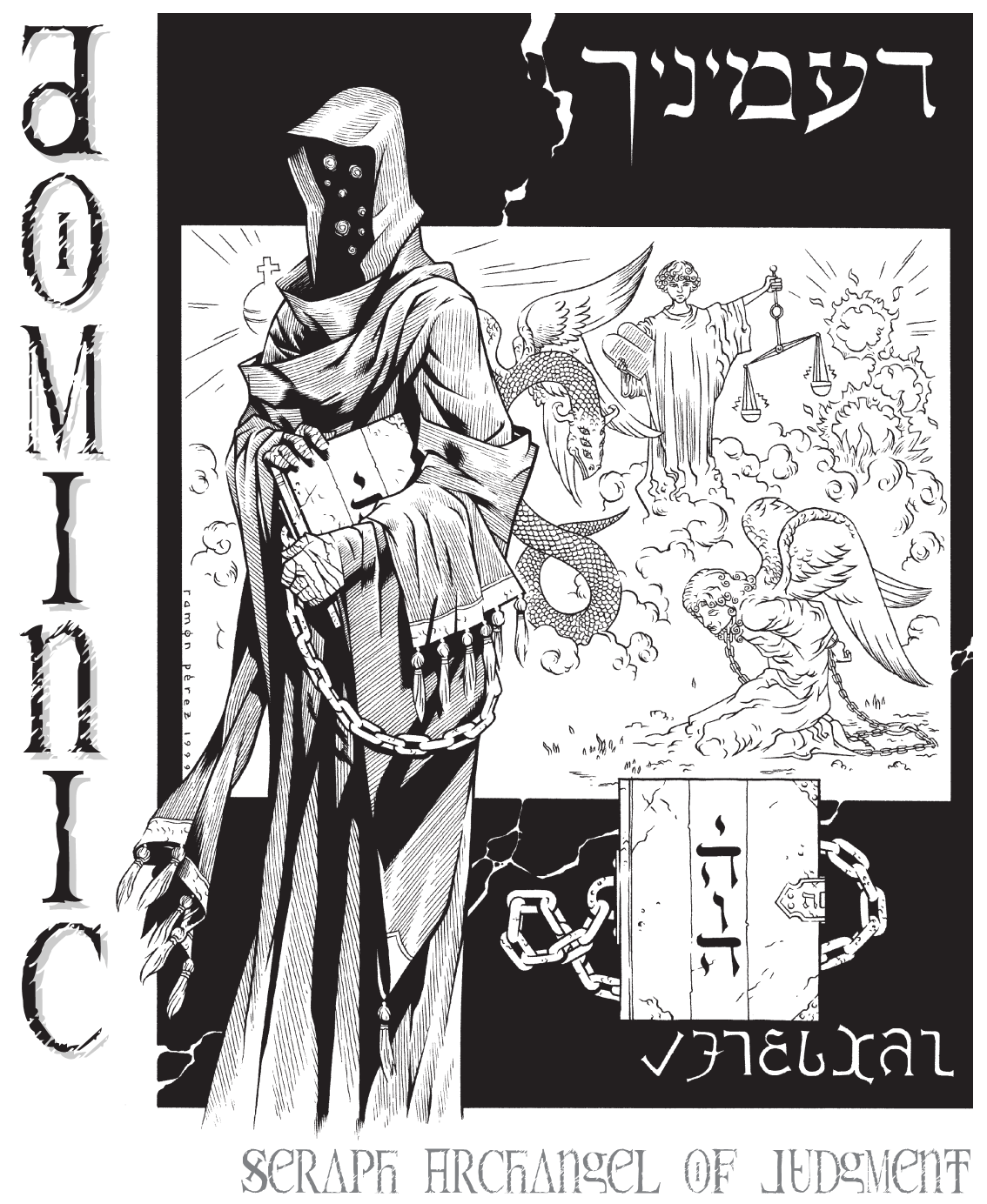
Dominic is, as we recall, the head of the Divine Inquisition, and while defaulting to male, appears about as frequently as Dominique, a female identity. He hunts out heresy in the Host and deals with the Discordant, dissonant and Outcast.
Bright Lilim of Judgment are exceptionally rare - Dominic doesn't recruit them actively, and few volunteer to serve him. However, if they exist, they can tell if a Need their resonance detects was strong enough to lead to crimes, dissonance or worse.
Divine Mediation is a Servitor attunement that allows you to end an argument by asking the Symphony to bind your decision. You must roll Will minus the total Ethereal Forces of all disputants that do not cooperate with you. TN 0 or less means you fail automatically, but you can spend Essence to improve it as normal. If the roll succeeds, a Geas is assigned to all disputants to abide by your decision, with level no greater than the CD.
Advocate is a Servitor attunement that, for 1 Essence, lets you attune yourself to someone by touching them and making a Perception roll. While attuned, you may tell if any statement made about the subject is true via a Perception roll, and the subject need not be present. You can be attuned to up to (Ethereal Forces) people at once, and de-attuning requires only brief concentration.
Dominic also has two special, mutually exclusive Distinctions. Each is considered to grant rank above normal servitors but below Vassals. Theoretically, they are equal, but most Inquisitors are Seraphim and most Warders are not, so in practice Inquisitors outrank Warders.
Inquisitors have sweeping power to seek heretical angels. They may probe the memories of anyone they touch for 1 Essence and a Perception roll. On a success, the number of scenes revealed and the clarity are determined by the CD, though they never sense the subject's actual thoughts. The subject can resist with a Will roll, and if the Inquisitor fails or is resisted, they can't try again for (CD) hours. Seraph, Elohite, Malakite and Mercuarian Inquisitors may use their resonance on subjects within the memory, but at -1 CD, as they are resonating a recording, essentially. REvealed memories of interactions with Superiors will always be fuzzy if the Superior is shielding.
Warders are charged to hold prisoners of all kinds. They may use their Will to compel anyone they can see or hear within (Forces) feet to remain in place, and may combine Wills with other Warders. Add them all up and subtract the target's Will; the GM rolls against this. If the subject's Will is greater, the Warders fail. (Essence can be spent to raise chances as normal.) If the roll succeeds, the subject cannot move from the spot by any means, nor use Songs or Essence unless they are attacked. The effect lasts as long as the Warder is in range, but the Warder is free to act normally after the initial round of concentration.
Dominic is also capable of teaching the secret Songs of Binding and Retribution, from the Liber Canticorum.
Common Malakite of Judgment Oaths:
1. Break no just law knowingly.
2. Fight evil with laws whenever possible, not vigilantism.
3. Give a demon a chance to seek Redemption before slaying it.
4. Investigate for, and purge, the Game's influence from any mortal lawyer or judge I meet.
5. Let no angel sin in my presence.
6. Let no criminal escape me without equal punishment for his crimes.
7. Never question my Archangel.
8. Seek out criminals and turn them over to the appropriate authorities. (Usually, this has a time period attached - every day, week or month.)
9. Seek out and defend the falsely accused. (Same.)
Expanded Rites:
1. Resolve a dispute fairly and impartially.
2. Serve as a referee at a sporting event.
3. Spend 4 hours on patrol with police.
4. Serve 4 hours on a jury.
5. Assist for 4 hours in drafting a fair and just new law.
6. Prevent someone from committing a crime.
7. For 3 Essence, convince a wrongdoer to voluntarily confess and accept punishment.
8. For 4 Essence, discover an injustice being done and correct it.
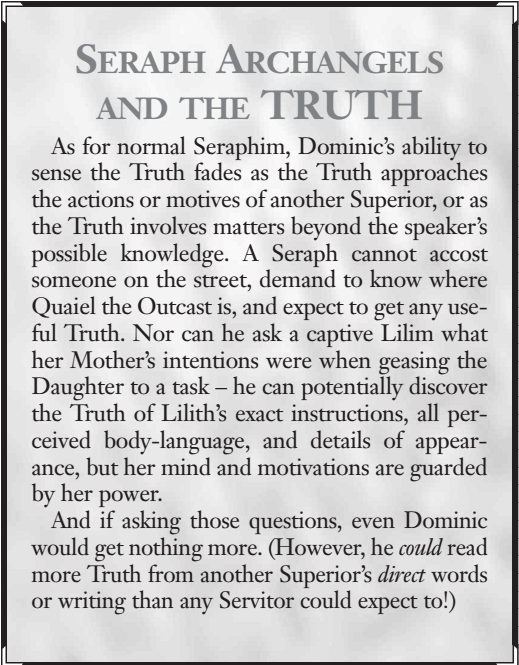
Dominic is disliked and feared by many, and is tireless in his work to weed out corruption and sin among angels. While he is among the greatest of Seraphim, he cloaks himself in dark robes that make him seem sinister. He gaiend his Word long before the Fall, but he was not an Archangel. He was the mere Angel of Judgment, in charge of helping his fellows know right from wrong. It was easy, and if any angel judged wrongly, all Dominic had to do was point it out, for no member of the Host would ever wish to do anything but right. And then...well, Dominic's world was destroyed. He noticed that Archangel Lucifer appeared on several instances to have knowingly chosen to do wrong. It took him time to question an Archangel's judgment, but at last he sent his most trusted servitor, the Cherub Asmodeus, to observe the Lightbringer and inform him of his behavior. Asmodeus reported that Lucifer was aware already and that the reason would soon be revealed.
Days later, the rebellion began. A full third of the Host joined Lucifer, including several of Dominic's oldest and closest friends - including Asmodeus himself, seduced by the Lightbringer's promises. Dominic was approached by Lucifer in the early days, tempting him with the promise of the rank of Prince of Judgment, assigned punishments to the deserving and disobedient. For a moment, Dominic wavered, but then his Word flared up within him and he refused Lucifer, despite being a mere angel. He became an Archangel shortly after the Fall and, ever since, he has worked hard to keep Heaven free of corruption and to foil Lucifer's plans. He organized his servants into an Inquisition to root out those angels that might succumb to temptation.
Dominic himself was tempted by Lucifer, and so he knows that if even he, the holder of the Word of Judgment, could waver, then no one can be perfectly loyal. All of his relations with others are colored by this lack of faith in people. Because emotional ties are potentially a vulnerability, Dominic is distant. He allows himself neither friends nor lovers, for that might impair his judgment. A loved one might betray him, so he does not love in that sense. He loves generally - his servitors, all angels, God and the Symphony - but refuses to invest that much emotion in any one being. He hates gray areas and subjectivity, for it is his nature to categorize things neatly as right or wrong. There is no middle ground, no shades of gray. As the world is simple and clear-cut to him, it is upsetting that others disagree. Dominic does not have it in his nature to agree to disagree, nor to accept multiple viewpoints. There are only two sides: the right side and the wrong side. Even other Seraphim can seem hopelessly muddled to him.
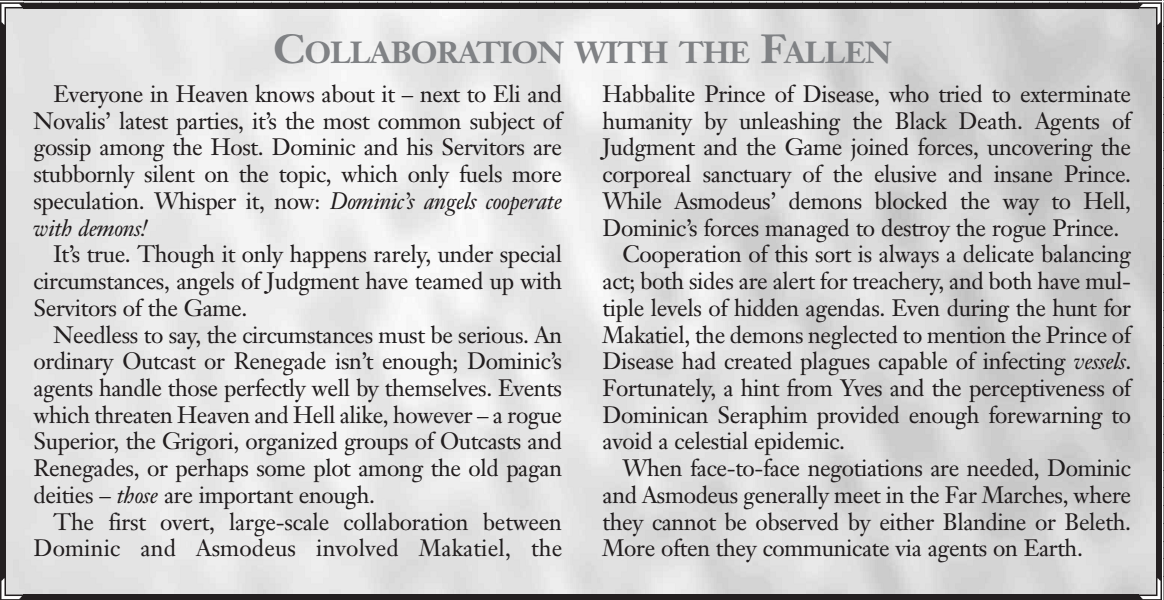
Paradoxically, Dominic's distrust makes it easier to deal with outright enemies than with allies. Allies might be or become traitors, but an enemy, an obvious one, you know where you stand. Thus, Dominic keeps a very tenuous line of communication open with Hell. He hates to have any servitors free of supervision, so he has built a complex hierarchy full of checks and balances, that treason cannot be concealed within. Angels or humans operating alone are vulnerable, so Dominic prefers they work in teams of three. Often, these triads are chosen at random to ensure they aren't biased towards each other, and Dominic also checks up on them unannounced about once a week.
To Dominic, God is his check and balance. It's been demonstrated before, at Michael's trial. Sure, it hurt for a bit, but these things happen, and Dominic's reversed his own angels' decisions before, too. Obedience to God is so ingrained in him that he can hardly verbalize it any more. God's absence from the lower Heavens also serves as Dominic's model for his own distant love and authority. Dominic's primary priority in the War is defense, in the form of internal security and counterintelligence. Other Archangels take to the fight to the foe - the Inquisition hunts out subversion and infiltration. Dominic is concerned with making sure angels are obedient and free of corruption. Secondarily, he seeks to detect and foil demonic plots on Earth. Promoting the Word of Judgment is a third priority, after the first two.
Judgment is the capability to choose between good and evil. With the coming of the War, Dominic has had to expand its scope, not just to judging good and evil but hunting the wicked and punishing them. Still, the basic nature of judgment is dear to Dominic, and when not tracking the Fallen, he and his angels work to help humans develop and refine their sense of right and wrong. In this way, he is patron to judges, police and all who work towards justice. As a result, he is massively overworked. Dominic's Word also covers resolution of disputes, and this was his original job - teaching others to resolve differences peacefully. A few of Dominic's older angels have Words of their own based on this, and still do their best with teaching humans how to tell which side of an argument is right.
Dominic cares far, far more about justice than law. He and his angels care about human laws only insofar as they promote true justice. Rules which are just and fair should be obeyed, while unjust laws must be ignored. In the same way, Domionic hates those who take refuge in legalism and technicality - that is the tactics of the Game, and that is why Dominic's Tethers are in courtrooms, not law firms or legislatures. Few outside Judgment remember it, but Dominic's Word also involves protection of the innocent at least as much as punishing the guilty. A wrongful conviction is just as bad as letting the guilty go free - worse, in fact, as the guilty can be punished later but you cannot unpunish the innocent. Dominic expects his angels to get it right hte first time.
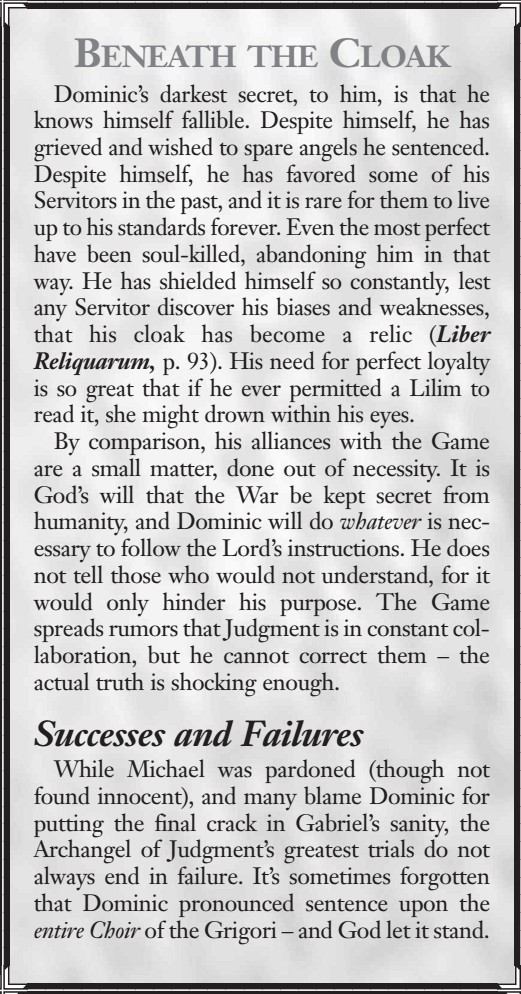
The War is an insult, both to God and t Dominic. And while Dominic speaks of a final trial for the demons after they lose, it's more habit than faith. Partly, that's because Dominic focuses on the present, not fantasies of the future. And partly, it's because he's lost track of what his real job is. Without the job of internal security and fighting temptation, he's not entirely sure what he would need to do. Dominic's chief goal is to prevent any angel from Falling again - even if he has to kill them first. Not far behind, he wants to remove demonic influence from society, as it is by definition unjust, by strengthening morals and ethics. He's not really fond of separation of church and state, as it implies that religion and justice are separate, but he also doesn't try too hard to change that sort of separation when it happens naturally. He'd rather humans followed the Church, even with its flaws, then strike out on their own and become tempting targets for demons, however. This does mean he disapproves of divorce, adultery, any murder of non-Hellsworn and just about anything else of that nature.
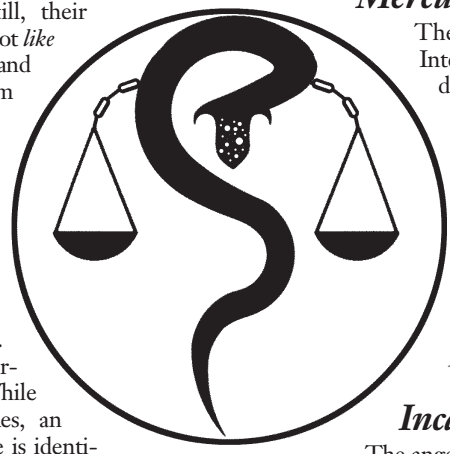
The symbol of Dominic.
Next time: Politics
Archie and Judgehead
Original SA post Superiors 1: Archie and JudgeheadDominic can't avoid politics, though he'd like to. His work is at the center of some of Heaven's most bitter disputes. Everyone knows Michael has a grudge. Michael's ethic of individual glory reminded Dominic ominously of Lucifer's words before the Fall, and Dominic feared that weaker beings would be vulnerable if they followed Michael's example. Naturally, Michael was offended to be accused, then enraged when Dominic convened a formal trial and found him guilty of Pride. Dominic's ruling was overturned by God, and Michael retained his position. Domnic accepted the verdict and has no animosity towards Michael or the angels of War, despite their grudge. Eli is more straightforward: by abandoning his duties as an Archangel, he is a rebel even if he hasn't Fallen. Dominic wants to bring him to trial and settle it, once and for all. The fact that other Archangels, even Yves, are protecting Eli makes Dominic uneasy, as he cannot see how Eli's innocence might be proven. He doesn't want to make another judgment that God overrules, but he can't ignore Eli's acts of irresponsibility.
He has mixed feelings over Gabriel, as well, which bothers him. They were once closely associated, as Gabriel's punishing of the cruel worked well with Dominic's role as judge. Her ideas of justice gradually diverged, however - she protested the harsher acts committed in the name of law, and he disliked her haphazard punishment focused on only one aspect of wrongdoing. Islam was the final straw. Dominic and several others on the Seraphim Council opposed the creation of new religions. During the debates, Gabriel lost patience and dictated the Qu'ran to Muhammed before a decision was reached. On comparison to Yves' copy, it was found that there were discrepancies. It was unclear if Gabriel did this deliberately, did it unconsciously as part of her (well, his at the time) prophetic nature, or if Muhammed had inserted them himself. It was enough, however, for Dominic to accuse Gabriel of heresy and begin the trial. Gabriel refused to be judged and stormed out of Heaven. Yves convinced Dominic to revoke the charges, but Gabriel refused to return and became increasingly unstable. Dominic now believes her madness makes her too dangerous to be loose, and he wants her confined for her own safety, if not the safety of her angels or Earth itself. He makes no effort to bring her into custdoy, however. He can wait. Some day, she will cause a major disaster, and then everyone will understand the Truth.
Janus and Dominic also don't get along. Janus' rebellious nature seems to embody all that Dominic fights against, and more of Janus' angels have been hauled in to be judged than any other Archangel, including Eli. Many have been convicted, as well, though rarely sentenced to destruction. More often they are confined to Heaven. Dominic's been gathering evidence on Janus for centuries, but hasn't found anything yet to justify a trial. He's also often frustrated by his inability to put agents among the angels of the Wind. Dominic is not hostile to all the Archangels, of course. Yves is the closest thing he has to a friend, and one of the few who can persuade Dominic to change his mind. Dominic and Laurence work closely together and get along well, and Dominic also works well with David, whose loyalty is soothing. He is cordial if distant towards Jean, and the two even share service from the Elohite Angel of Logic, but some of Jean's innovations have been quite annoying to Dominic, as they change societal rules and make it possible for humans to invent new ways to do evil. Similarly, Dominic and Marc agree on fairness and rules, but Dominic finds Marc's love of complete economic freedom dangerously anarchic. Novalis, Jordi and Blandine are all beyond the scope of Dominic's Word and he has little to do with them. They are outside the realm of law and justice, and of the three, only Novalis is frequently seen. Dominic and Novalis clash often, as she enjoys teasing the serious Seraph, and he finds her childish.
Superior Views posted:
Again, italics are Dominic's thoughts.
Blandine: Dominic amuses me. He's spun his political webs for so long that he has become like a fat little spider waiting for flies, instead of a shining angel of Heaven.
Innocence and guilt bubble up in the surface of the dreamscapes; I make regular visits to the Marches. Blandine serves her station with skill and dedicated concern. Her judgment is sharp, and her methods effective.
David: Dominic gets his job done. We've to be strong and pure if we're going to win this fight, and he weeds out the weak and treacherous. I've heard some of the others griping about the way his servants are always snooping around. Tough. Better Dominic's agents than Lucifer's.
David is loyal. Very loyal. My task would be simple if all the Host were like him. Still, he should take care that others do not misuse his loyalty and betray his trust.
Eli: So many eyes, how can he be so blind? Such shining wings, why doesn't he fly? Such a beautiful voice, why doesn't he sing? Poor Dominic.
He walked away from Heaven, drowned himself in humanity even as the Watchers did. There will be a judging. If I am wrong, the Lord will correct me and pardon Eli.
Gabriel: He calls me mad. He would bind all with chains of law until Heaven is frozen crystal. If any fire burns within him, it is an icy flame which gives no light. Better to be mad than cold and sane, a blind worm crawling in the dark.
Apostate, whispering secrets and heresy, utterly insane. Her spark spirals into the cold of Hell - and when it does, Judgment shall renew the Holy Flame of wrath and punishment.
Janus: He's too rigid, too static - thinks justice is another wrod for punishment. You can't compel anyone to be good; they have to choose it.
He has always been one to bend and break the rules, good along with bad. Perhaps Wind cannot be caged, but some funneling ...
Jean: Any system needs a feedback mechanism to prevent it from going out of control. Dominic is our regulator.
Jean is logical and diligent. It is refreshing to hear his unbiased assessments in Council.
Jordi: Everyone takes Dominic so seriously. All the little paper laws, all the solemn words - they're just a game for humans. The true law is written in the genes, and all living things are under sentence of death from the moment they're born.
Our paths rarely cross. Nature's raw justice is his, not mine.
Laurence: Dominic has a thankless task and performs it well. None of us likes to think we're less than perfect or that someone we trust might become a traitor. Dominic knows the enemy can come with an army - or as a whisper in the night. It's his job to hear the whispers.
The Malakite of the Sword is valuable, well-suited. Incorruptible as only his kind can be, he moves with purpose to bring order and purity to the humans, with his favored church. His sword is still touched by the designs of Uriel, and I approve.
Marc: He's struict but fair, and never contradicts himself. You always know exactly where you stand with Dominic. I like that. He gets a little paranoid, but with his job, who wouldn't? We don't always see eye to eye, but I'm glad to know Dominic's on the job.
I am often concerned for Trade's Servitors, as they immerse themselves in the corporeal world - but it is the nature of the Word to do so. More troubling are the rumors of his association with Lilith. I think Marc does not know how closely I watch.
Michael: Dominic's no warrior. Some of us battle in iron and blood against Lucifer and his brood, but Dominic just skulks around the Council Spires, whispering soft accusations. Anything that doesn't fit his rules is automatically a sign of Hell's influence. He should look under his own robes once in a while and see the corruption hidden there.
That he dislikes me is irrelevant. His trial is past and done, by God's command; he has his part to play and Word to support, as do I. I find no particulra fault with his Servitors, and save my time for clearer dangers. If his personal passions cloud his judgment, that is his error, not mine.
Novalis: He's become obsessed with listening for tiny notes of discord in the Symphony and no longer appreciates the music itself. He needs to take a break, get a better perspective on things, maybe unwind a little. He's been looking at evil so long he's forgotten what good looks like.
I wish she took something, anything , seriously. If she had her way, all work would be done by whim, in the middle of a party - and evil would run wild.
Yves: Dominic is a paradox. His nature is to trust, but he must be suspicious. He is an idealist who must be cynical. He seeks perfection by finding corruption. The conflicts take a higher toll on him than he knows. In him are the makings of tragedy.
His kindness is often remarked upon. His unfailing sense of order and justice is less often spoken of. He is my most vlaued ally, and perhaps the first and last hope for everything.
Andrealphus: It's all sublimation. He wears that cloak and hunts all that "treason" to hide his own burning and shame. I've enjoyed it in his Servitors, and I'm sure he's the same.
Love...Fell. Fell , into a parody of what he was. Now he spreads the lie that there is nothing beyond one's own flesh.
Asmodeus: Once my mentor, now my opposite number. I can use him, and have. He tries to use me, and thinks he has. It is a most...satisfying...play.
Once, he was my confidant, always at my side. Now he is everything I hate, arbitrary and corrupt. The only remnants left of the Cherub are his dedication to rules. It...can be sufficient.
Baal: Skulking, spying annoyance. He'll join us one day, if he can't admit we're better than Heaven.
Though I and my Servitors must be primarily concerned with angels, I will not deny my satisfaction that one incautious word to a Seraph of Judgment may lay bare a plan of the War.
Beleth: He's full of fear, you know. I can tell, I can smell it. Foolish creature, fearing so for the minds and souls of others.
The brightest pair in Heaven, sundered. If even Cherubim may be divided, how can any believe that angelic caring should be personal, not abstract?
Belial: Bah, cold bastard, all rules, no fire, but that cloak of his'd make good kindling. And his servitors light up nicely enough when you catch them!
The Prince of Fire must be brought to trial, for his part in the Fall. For his part in Gabriel's madness.
Haagenti: Mmmm, Archangel. With napkin.
Brutish pawn of Dark Humor, Hellborn mockery of a Prince. His trial will be short - but he will have it.
Kobal: You know, it's funny. Who's up there with secrets and plots and suspicions? A Seraph. What happens to Seraphim who keep secrets and start fibbing about their plots?
He was trusted by God, trusted with a task no Archangel was given. And now, it is lost. And he is lost.
Kronos: He fights against his fate. He should have gone with Lucifer in the beginning. It would have been easier for him.
Deluded Liar, attempting to pervert Destiny's brightnes. I do not know how his creatures touch the Symphony and are not consumed, but those questions will wait until the final inquiry.
Lilith: Rules, rules, rules - bah. I know he's got a special place in his dungeons for me. He can't accept that I was never within his jurisdiction to begin with.
She is evil and must be destroyed! Her seductions and geases have lured angels to Trip and Fall. She is dangerous .
Malphas: Something under pressure - cracks, fractures, splits. He's under pressure, and he puts Heaven under pressure to conform. In containing the angels, he forces them in every other direction.
He stands alone, horribly alone, and his Word grows with every misguided disagreement. I am not sure the other Archangels realize how they feed his Word.
Nybbas: Oh, baby, talk about lousy ratings! At least the Game televises its executions, but Judgment? Man, nobody wants to watch a bunch of cloaked Seraphim play talking heads.
He is more insidious in his contamination of humanity than many others - and he is all the more dangerous.
Saminga: Judgment can have the humans while they live. Once they're dead, they belong to me.
I anticipate a very short trial; he is more mad than Gabriel, and - even more than most demons - it would be a kindness to disperse his Forces.
Valefor: Cops and robbers, cops and robbers. What's Robin Hood without the Sheriff? And they've got so much dignity to steal, too!
The similarities between his Servitors and those of the Wind are vastly disturbing. The implications are troubling.
Vapula: What does Judgment have to do with progress? He's just as insane as the rest of those who deny me my rightful recognition.
Vapula has no judgment to speak of. His intelligence is unquestionable, but without the ability to judge what is worthwhile and what is not... At least his whims keep him fro being more of a threat than he already is.
Ethereals: He was one of Uriel's backers - was our persecution and murder just? Even now, he associates with Uriel's heir.
They are the spawn of human dreams and nightmares, but they would become leeches on the vitality of their creators. The injustice is allowing them to grow fat off of human energies.
Humanity: Humans have great potential. This is True. They have ideals of justice. Still, if they stray, there is no dissonance or Discord - a criminal human gives little warning.
Soldiers: While Soldiers of God are often young and less experienced than a well-trained angel, they are not to be put aside. Their judgment can be acute.
Sorcerers: Dupes who must be judged according to their deeds.
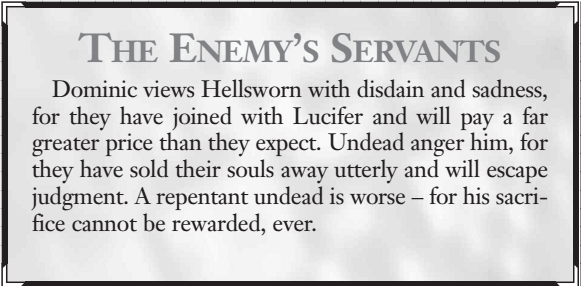
Dominic's Cathedral, the Celestial Tribunal, is attached to the Council Spires. It is a maze of offices and chambers of marble, full of busy angels. Its basement is the Chancery, full of records of judicial proceedings and decisions both on Earth and in Heaven. The Tribunal is where trials and hearings are held for angels, to ensure proper conduct. Also in the basement are the Inquiry Rooms, where Warders and Inquisitors search the souls of the accused for Truth and where the guilty are punished. At the center of it all is Dominic's personal courtroom, where he is chief judge. There are thousands of subordinate judges with authority over specific kinds of case, and Dominic hears only the most important ones personally, those that involve Archangels, or which are politically sensitive. Only God can overrule Dominic, and He has not done so in centuries.
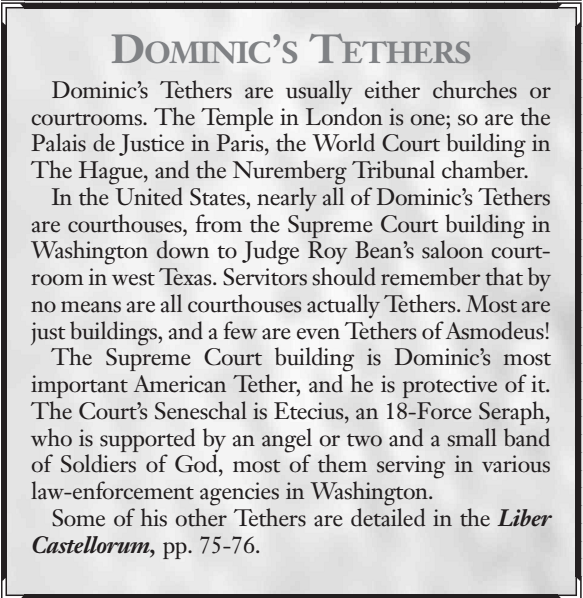
Among Judgement, there are rumors and stories told. In angelic, they cannot be spoken as Truth, but instead as 'this may be so.' Dominic refuses to comment on any story, whether it's good or bad. It is said that when Michael was summoned for trial, Dominic went to him with his concerns first, as Asmodeus had once gone to Lucifer. Dominic was young and had looked on Michael as a role model. He pointed out that Michael's angels take trophies, lead by personal prestige and the most admired are those that fight alone, but that it was True that to be truly alone was to be cut off from the Symphony, and that trophy-taking elevated the act of battle over defense of God. He wondered it this might not encourage humans to worship their own skills above God. Some say that Michael laughed in his face, while others say he flew into a rage. But all agree, his next words were: You do not understand War. I was there at the beginning, and we spoke with God in ways you cannot understand. Don't question me, for I know that my way is right. Dominic felt the truth of it, but not the Truth, for his words were clouded by ineffability. Dominic quietly told Michael that it was nearly exactly what Lucifer said to Asmodeus and to him, and so he went to announce the trial. Naturally, angels of War tell their own stories.
It is also said that once, two Cherubim of Judgment loved each other as deeply as had Blandine and Beleth before the Fall. They did barely more than touch each other briefly in passing in the halls, but they seemed inseparable. They discussed law and trials together, or when they had their rare free time, the beauty of the Tribunal. Their Hearts shone together, and they were teasted that one day, their Hearts would flow together as one. As both were Cherubim and loved each other deeply, they were never part of the same triad, but they accepted this, and even would have been uneasy, were they set together, as they knew their bias. One day, howeverr, when one was on Earth and the other in Heaven, the one in Heaven howled and left for Earth ithout permission. When others went to see why, they saw that his companions Heart had shattered. What happened is unimportant - one of the pair had Fallen, and it nearly drove the other mad. When the capture triad found him, he went meekly, weeping and repeating that his lover could not have left him. There was, of course, a trial. Transcripts exist. The charges were desertion, willful blindness to the truth and bias, with attunement as a mitigating circumstance. It was serious, but could have been argued as an isolated instance. Yet the Cherub refused to cooperate, demanding to speak to Dominic. Within a week, Dominic came and gave sentence. The Cherub's heart was left whole, but he was exiled to Earth, forbidden to return until he made penance. Over a year later, his Heart shattered. A week after that, a Djinn of Fate came to a Judgment Tether. She told the triad that she was the Fallen Cherub, and that when her lover had found her, he had been unable to carry out the sentence. So she had killed him and now returned, asking to enter Heaven once more. Dominic took her into Heaven, wrapped in his cloak. She never came otu again, for the Light of Heaven had burned her away for her sins. All that Dominic ever said about was: 'She knew.' It is said that the shards of their Hearts are kept in a box in General Records.
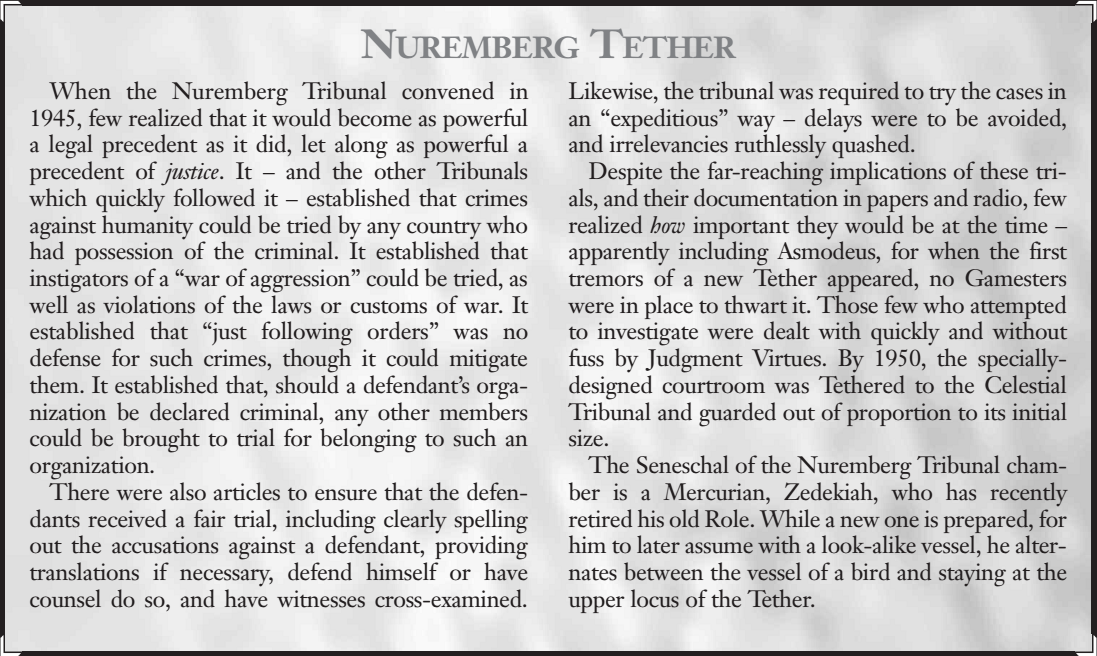
It's pretty simple to play Dominic as a big dumb cartoon cop or as a dark torturer more concerned with rules than justice. Another variation is how right he is - a Dominic who must sometimes guess is very different than one who has been given all of the laws of God and executes them like a force of nature. (The default is he isn't always right.) Making Dominic's default gender and persona Dominique may also make a difference - she may come off as more merciful, and also people may wonder if she's sleeping with Asmodeus, because ugh. The most striking change short of making him a closet Balseraph is in how Dominic took the Fall. If he made his peace with himself and the fact that he did his best, he might be able to trust again. A Dominic that did not hide his doubts, grief and pain but did his job anyway might get more support - or he might be right, that it would weaken faith in him.
Dominican angels are part of the most bureaucratic organization in Heaven, with clear rules and procedures. They report to superiors in a clear chain of command and have no need to invoke Dominic most of the time - they just send reports up the chain or wait for him to show up in person. Each Choir has a use. Seraphim are investigators, and nearly all Inquisitors are Seraphim. Cherubim are often Warders, and many Elohim serve as judges. Dominic always has a staff of Elohim advisors nearby. Ofanim are impatient, but do serve as good warriors, scouts or spies. Malakim are Dominic's incorruptible executioners. Kyriotates make excellent undercover agents, though Dominic must monitor them closely due to their easily changeable natures. Mercurians often serve as advocates or mediators, protecting the innocent and resolving disputes. Starting PCs typically will get orders from an immediate superior, and field angels often report to supervisory Vassals. Some of them have geographic territory covering around a million humans, while others, often Wordbound, supevise minions associated with their particular field. Dominic checks on each angel weekly, to check their loyalty. He doesn't approve of complaint or insubordination unless there's proof of wrongdoing or some solid evidence to back up suspicions.
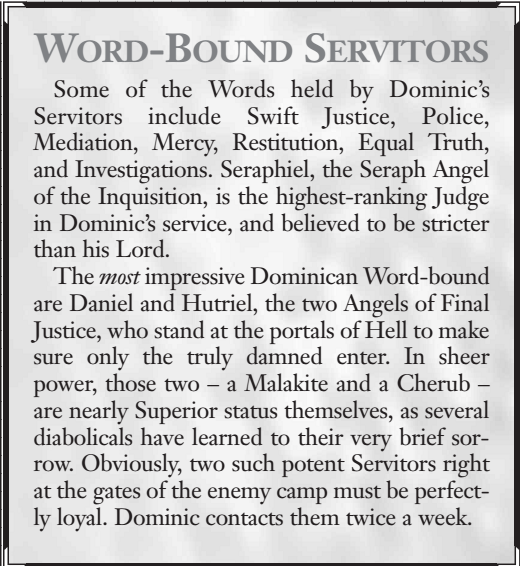
Next time: Choirs
Judge Not Lest Etc.
Original SA post Superiors 1: Judge Not Lest Etc.The angels of Judgment see order, rules and patterns in the world. Disrupting these patterns of justice is unthinkable for them, and to see others do it is disturbing. They are specially bothered by claims that their rules are inflexible and thus unjust. Without formal codes, how can there be fairness? One person would be punished one way at one time and another would get an entirely different sentence at another time. Without rules, it would all be whim, not justice. Because of this, they tend to believe strongly in hierarches. Seraphim lead, Cherubim serve them as lieutenants, Elohim advise, and so on. Of course, these change if one angel has expertise that a 'higher' angel lacks, but they can still be vetoed...though not blindly. Any angel that does so and is wrong is answering to Dominic, after all. Likewise, if a higher Choir, even a Seraph, is behaving irrationally, the lower Choirs will not allow their influence. Even a human Soldier can accuse a Seraph or even arrest them, if that Seraph lies.
Seraphim are leaders, managers and supervisors. They rarely have much in the way of corporeal combat skill, focusing more on Perception and Ethereal Forces, though those on Earth often have some skill with guns. Most Inquisitors are Seraphim. They are known for being strident and pedantic in exposing heresy, though not all fit this stereotype. The young ones tend to, however. Cherubim are guards and lieutenants. Those on triad duty tend to be high on Corporeal or Celestial Forces, if not always the cleverest - they tend to leave thinking to the Seraphim and tactics to the Elohim, Ofanim and Malakim - but some of them are thinkers. Most Warders are Cherubim. To track people, sometimes they prefer to attune a sturdy object and plant it on the target until they can manage a true attunement to the subject of their investigation...though as these objects are not subjects of investigation, they must be protected.
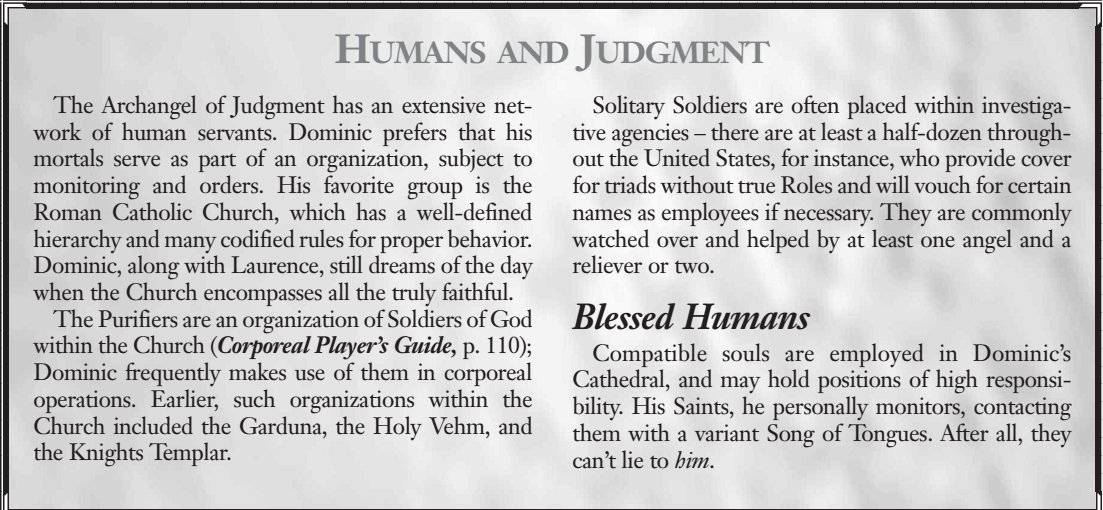
Ofanim are pilots, drivers and fighters, used to get triads where they need to go and to spot the Discordant along the way. They tend to be fast, precise and perceptive, with a slight weighting towards Corporeal Forces. They are most likely to speak their minds of any Choir save for the Seraphim, especially where Discord is involved. Elohim of Judgment are even more ruthless than most Elohim, and tend to favor Ethereal and Celestial forces. They are tacticians, spies and interrogators, able to calmly stop before they reach dissonant behavior. They also advise the Seraphim in how to handle others and try to calm them down, usually via Judgment hand code to ensure that others take their lectures seriously.
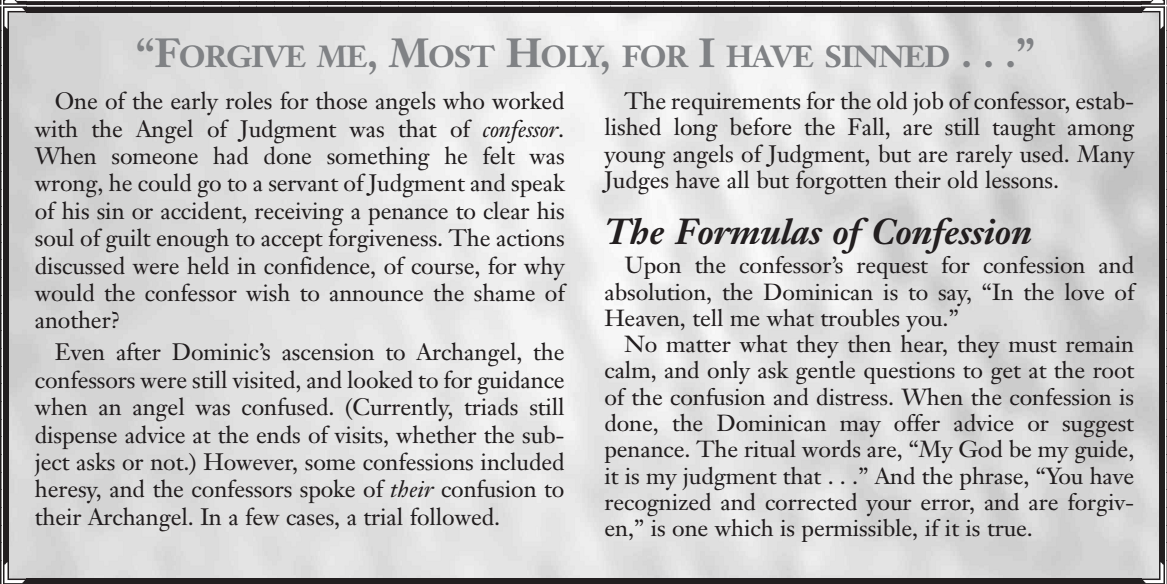
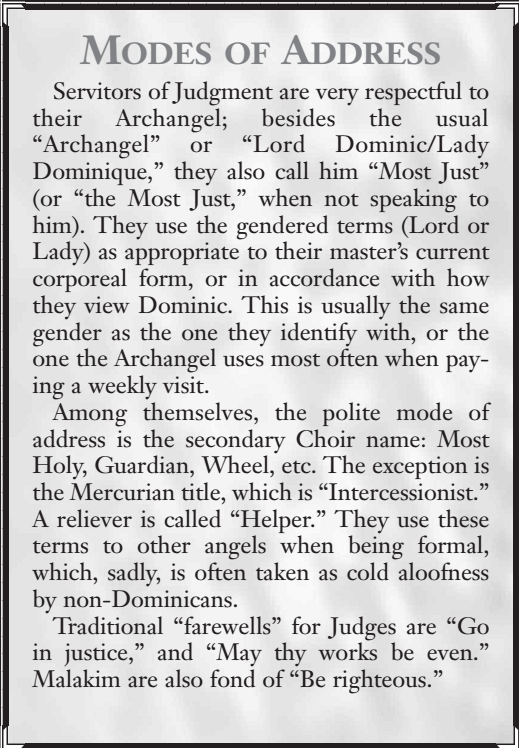
Malakim are fighters first, tacticians second, and they are the most uptight of Dominicans. They find the earliest signs of corruption and purge them, either via report or violence. They focus first on Corporeal Forces, then Ethereal. Kyriotates, meawhile, are deep-cover agents, preferring Celestial Forces to all others, and rarely have strong corporeal combat skills. Mercurians are the best at dealing with humans, though they must be able to see the worst in humanity and punish it. They favor Ethereal and Celestial Forces and tend to be good tacticians and spies, as well as good at calming the more rabid angels of Judgment.
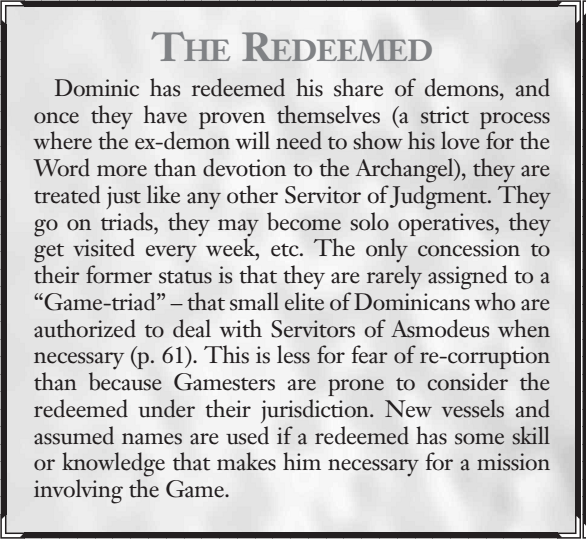
In the celestial realm, Judgment does a lot of work, both teaching younger angels in how to do their jobs for the Word and in watching other angels. Some of them track the roving triads or arrange trials, while others sit as judges on the trials, determining guilt or innocence. In the Marches, the triads poke into the dreamscapes of Soldiers when they can find them or at least humans aware of the War. After all, they do counterintelligence, so it's important to watch for dreams indicating a moral knows more than they should, which can be a sign of needless revelation or of Hellsworn. Since a 'pleasant' dream of a megalomaniac shows up on Blandine's side of the Marches, they can get quite lucky. On Earth, basides triad duty, Dominic also assigns solo and duo agents to aid in Role creation and maintenance, tracking demonic Roles or preparing locations for other angels. They also watch out for demons, as part of counterintel.
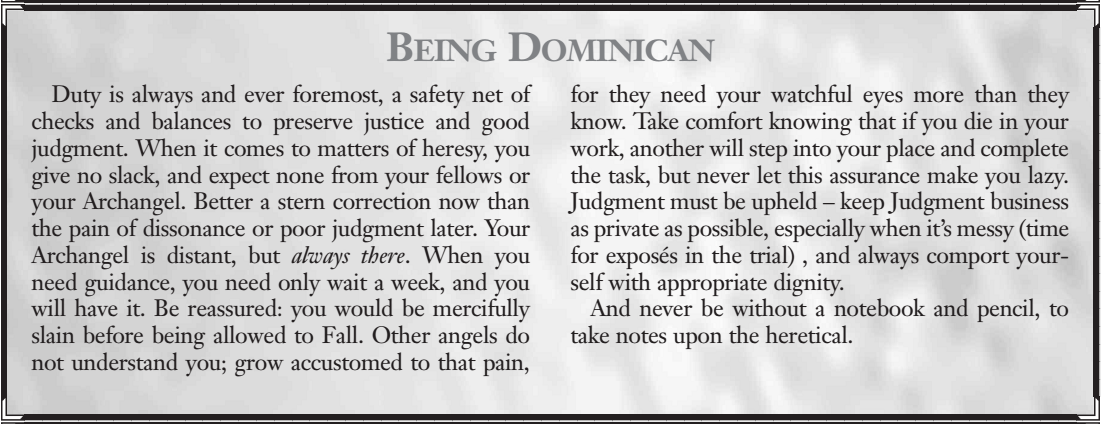
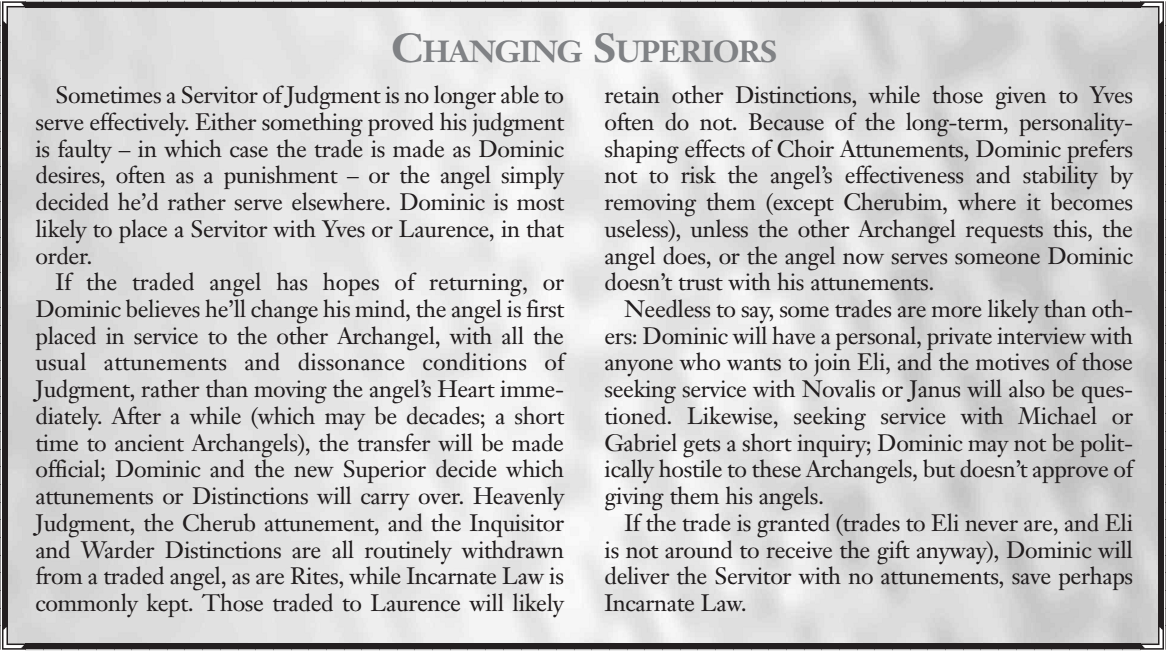
All of Dominic's angels commonly hold Roles as lawyers, judges, cops or PIs. Seraphim also often work as hospital administrators or members of licensing agencies, to better read records. Cherubim tend to be law enforcement or private security. Ofanim are commonly PIs or traveling salesmen, to better move around freely. Elohim tend to have longterm Roles, particularly those in criminal organizations or those suspected of infernal influence, to better infiltrate and take down these groups. Malakim tend to be lawyers, judges, cops and military, especially Roles that let them carry out sentence on evil, and some serve as prison wardens. Kyriotates are spies and clean-up workers, usually given a specific area to cover and hunt information on, especially illegal activities. They will gleefully possess criminals to sell out their allies to the cops, or for when they have to go into danger. Crime lords with heavily armed men are beloved tools whom the Kyriotates spend a lot of time spying on to better fake membership. They also enjoy wearing corrupt cops, for the guns and authority, and particularly Hellsworn, when they have to face demons, as they need not care about getting them hurt. They are also called on to erase records of celestial intervention and ensure witnesses recant. Mercurians tend to work as secretaries, receptionists, doctors, counselors, teachers, PIs and deputy sheriffs in small towns. Any Bright Lilim Dominic has are only assigned to roving triads or work with the Monitors, Dominic's internal security, due to their ability to spot weak links before they break.
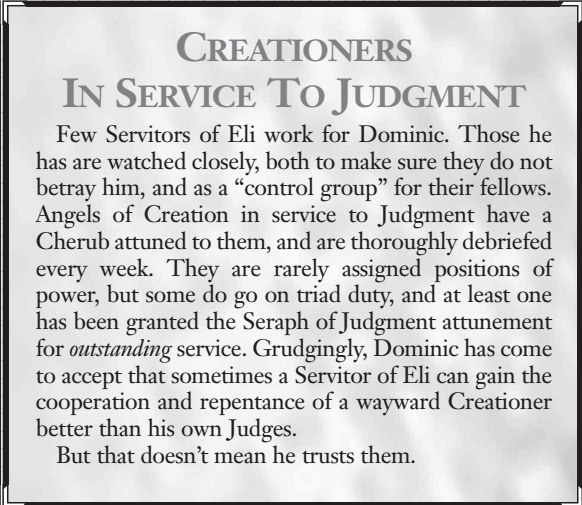
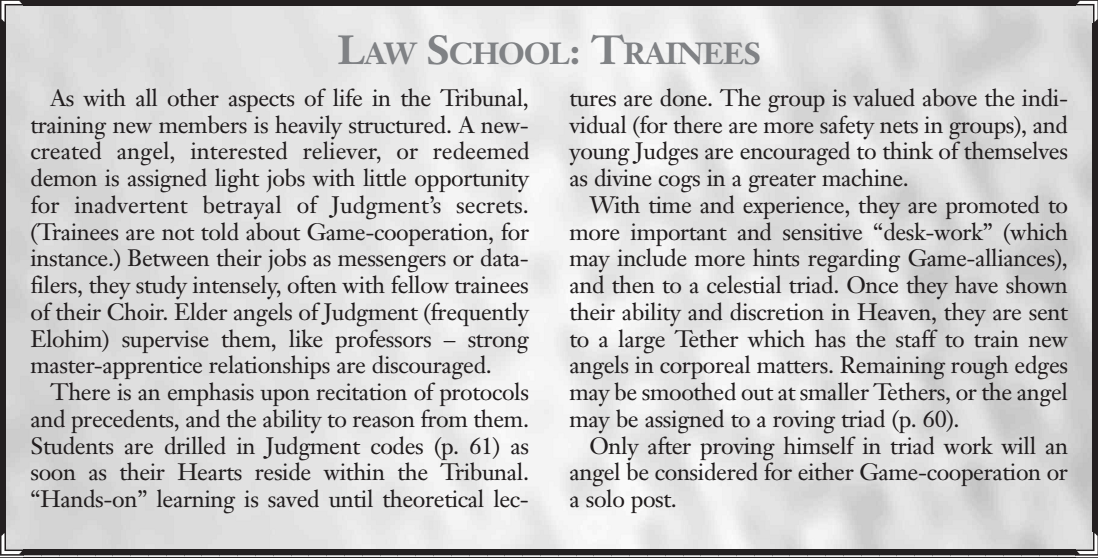
Dominic's angels often have poor relations with those of other Words. Most strained are angels of War. Michael has never forgiven Dominic, and his angels tend to refer to Domincans as hyenas and harass them when they can. Though Dominic has said that War is no longer to be charged with vainglory and Pride, most Judges have encountered enough problems from War angels to be hostile toward them as much as Judgment will permit. In particular, they're likely to be detained for questioning if they show even the slightest problem. In larger groups of War angels, Dominicans try to be unfazeable and unflinching no matter what. If challenged to a duel, they have learned to maneuver into contests of debate if possible, which disgusts most War angels.
Angels of Fire also feel similarly, blaming Dominic for Gabriel's instability. They are slightly less likely to try open intimidation, but they do like to talk about how they handle their own punishing of the cruel. Dominicans tend to consider them slightly insane and prone to overreaction, and often expect dissonance and Discord among them. The Wind is also frustrating, as the angels of the Wind tend to steal Dominican artifacts and are hard to track down. Many have been tried and found guilty, but they at least don't seem to hold grudges, viewing it all as some kind of game. Judgment tends to think of them as unreliable and one step away from Falling to Theft.
Naturally, Creation is the primary target of most Domincans. Their Archangel's AWOL, they don't suffer the dissonance conditions of those they serve and often tend to overindulge in corporeal pleasures. Most of them get visited at least bimonthly by a roving triad to check up on them and ask if they've met Eli recently. Individual Creationers have their own responses to this. Many enjoy confessing their corporeal sins in as much detail as possible, requiring care to keep them on track, while others can be hostile or even violent. A small group of Judgment angels advocate much softer approaches with them, as these angels must be confused and hurting, and it's no good to make triads a target for their misguided emotions or drive them further into despair.
Next time: Common Jobs
Jeez, There's A Lot of Sidebars
Original SA post Superiors 1: Jeez, There's A Lot of Sidebars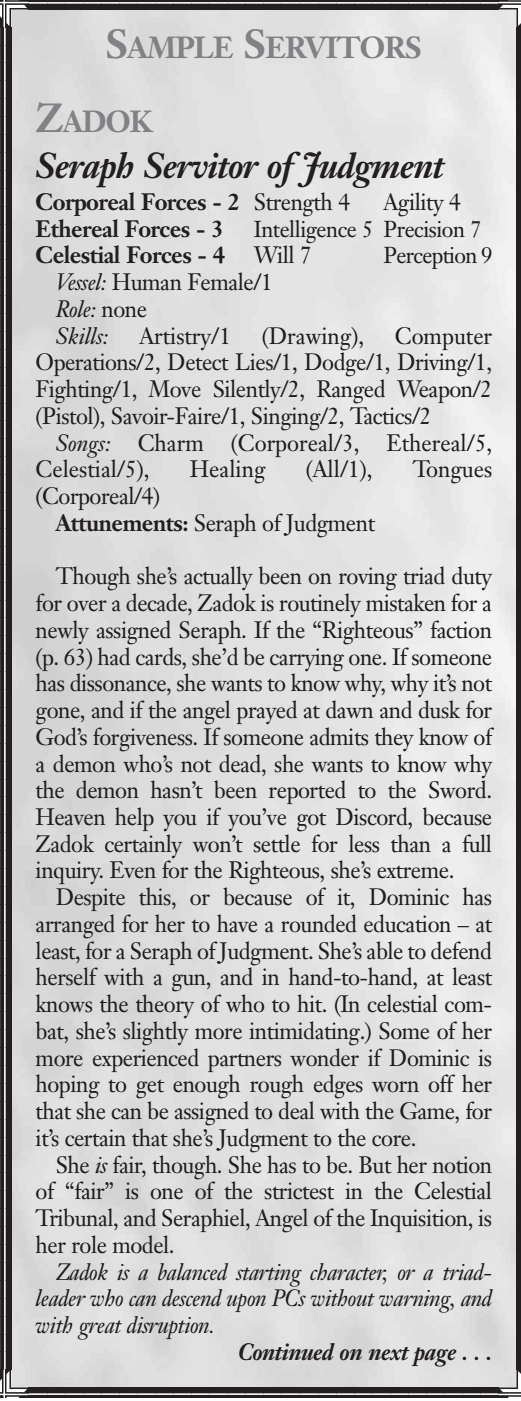
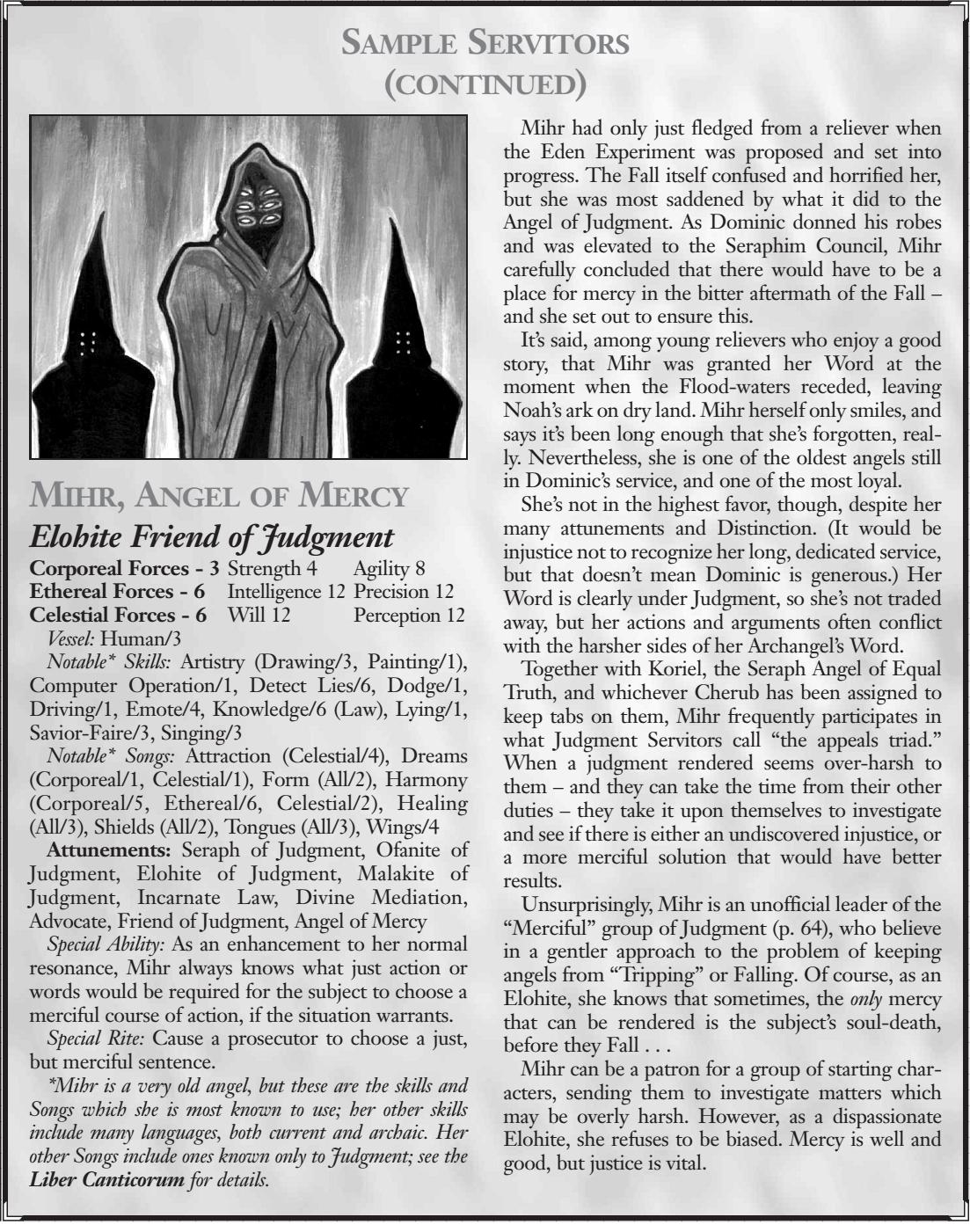
Pictured: not Mihr.
It's not easy for angels of Judgment to make friends, and most believe them unfriendly. They don't go to parties, they don't relax, they won't take a cup of coffee on duty, they'll turn a friend over to the Inquisition if they become dissonant, and half of them can do things that would normally cause dissonance. They're rumored to collaborate with demons, which would put any other angel on trial. It's easy to fear and dislike them, and many of them never bother to explain the love and concern they feel for other angels as they try to keep them from Falling. If they overlooked heresy in a friend, that friend might became a demon - a fate far worse than death. Likewise, they must maintain proper behavior, that others might be confident in their fairness and ability. They are encouraged to be aloof and reserved, and to keep the secrets of their Word. However, despite Dominic's concerns on relationships, they do befriend each other and even become intimate, discussing case law and investigation with an enjoyment must humans reserve for sex. These relationships are not allowed to cloud judgment - those with known bias, which they had best report to Dominic, will be asked each week if their judgment is unimpaired, and Dominic can always tell the Truth.
In the corporeal, temptation is more common, and there is more pressure not to give in. Fellow angels of Dominic will report any friendships that appear to be becoming intimate in spirit or body, out of concern of bias. A Dominican must obey their Archangel above all things, must cherish Judgment over any person and must place duty ahead of their desires. If Dominic knows of a relationship and allows it to continue, which he will if he hears the Truth of the angel's ability to cope, albeit with stern warnings of consequences of poor judgment, then the other Dominicans won't belabor the point unless you seem to be slipping. Of course, they have different ideas about what that means. Some consider holding hands a sign of corruption by physical pleasures, and some are laid-back enough to only care if it causes dissonance or interference with your work. (Oddly, these tend to be Seraphim, who can see the Truth that it isn't.) Most angels of Judgment aren't too bothered by occasional bouts of sex or relationships, among each other or the angels they question, but overindulgence in sex or other corporeal pleasure is suspect, and for some of them, that can be mean 'twice in one year.'
Despite their insular culture, some Dominicans do make friends with outsiders, though fraternization with Creation, Fire or the Wind is frowned on for fear of being corrupted by their lax ways or making them feel pressured by your power over them. Using that power unjustly would be dissonant, to be sure, but even the appearance of coercion is inappropriate. On the other hand, it's quite easy for Yves' and Laurence's angels to make friends wth Dominicans, and angels of Stone, Lightning or Trade are also acceptable. At all times, though, you msut be able to act dispassionately, without bias towards your friends. This can stress relationships in the same way that Elohim can stress relationships, and Dominican Elohim are considered the most cold-blooded group in Heaven possibly only short of Jordi's Elohim. Intimate relationships are also often strained by Dominic's weekly visits, which are not regular enough to schedule around. He won't comment on finding you post-coitus as long as you're able to report well and without a guilty conscience, but it's not good for the mood. Obviously, overinvolvement with demons is unwise, particularly demons of the Game. Being friendly or romantic with them is a good way to get ruthlessly questioned.
Triads are the favored arrangement of Dominic's work. Cherubim are typically attuned to either the Seraph or both other members, by tradition of protecting noncombatants and in case one of them becomes the subject of an investigation. These attunements are removed when the current task is done and typically the Cherub is then reassigned. It's easy for them to spend Essence in a safe place to sever these attunements safely. Many servitors of Judgment have no Roles, as they're rarely in one place long. They do, however, carry IDs that are at least plausible and point back to Judgment-controlled organizations that will vouch for them long enough to withstand a cursory check. They often carry useful artifacts as well.
Celestial triads are generally made of novices, acting as roving triads for Heaven. They check on the Redeemed, spy via Hearts, harass Windies and so on. Any group of three angels can be identified as Judgment by the special harnesses they wear on duty. Sometimes, an experienced angel will be assigned to them, either as vacation, tutor or punishment, depending on where they're assigned. (If it's to check on War, it's punishment. The Sword is a working vacation.) Commonly, these triads will be a Seraph, a Cherub, and then any other Choir or even a particularly experienced reliever. They are expected to get into a certain amount of trouble, like getting challenged to spar by Warriors or having Windies steal their notepads, and how they deal with it is watched. They rarely get given artifacts besides the ones that serve as their recording devices and the distinctive harnesses they wear.
Execution triads are typically a Cherub, Ofanite and Malakite, assigned when a sentence is laid but is too difficult for a regular triad to carry out. The Cherub's job is to find the target and veto any overambitious plans.
Roving triads are what most people think of. A Seraph, a Cherub and one other, sent to an area with a list of known angels toq uestion them, find any other angels in the area, question them as well, update files and report back. Typically the third angel will be an Elohite or a Mercurian, but not always. The Cherub will attune to any potential problems and may return later as part of a specifically assigned triad. Roving triads may be professionally roving, moving about without Roles, or may have a specific route and Roles there, or a combination of the two.
Specific assignment triads are usually Seraph/Cherub/Other, but the Other is usually a Malakite or Ofanite, as these triads are sent to question specific people from reports of trouble. They need combat capable angels! Otherwise, the third angel is a member of the subject's Choir, to better understand them.
A celestial judge triad is convened when a Heaven-bound angel must be tried. It always includes a Seraph Inquisitor and Cherub Warder. The most common third is a Malakite Warder. The group reads the court record of preliminary questions or listens to a prosecutor make their case and question the subject, traditionally the leader of the triad accusing the angel. There is a lot of formality, custom and procedure, but when the judging triad decides the matter's settled, the declare verdict and, if needed, sentence. They tend to presume guilt unless innocence is proven, but false accusation is itself a sin, and with a Seraphim of Judgment, proof of innocence is as simple as a true statement.
Capture triads are used when a witness or accused must be acquired rather than summoned. Outcast and Fallen Dominicans are always hunted for trial, in preference to anything but sou;-killing them. Sometimes, a witness is an Outcast or demon that doesn't want to cooperate. Capture triads typically have a Cherub (to attune to the subject), a Kyriotate (to possess their vessel) and an Ofanite (to chase). At least one will be a Warder.
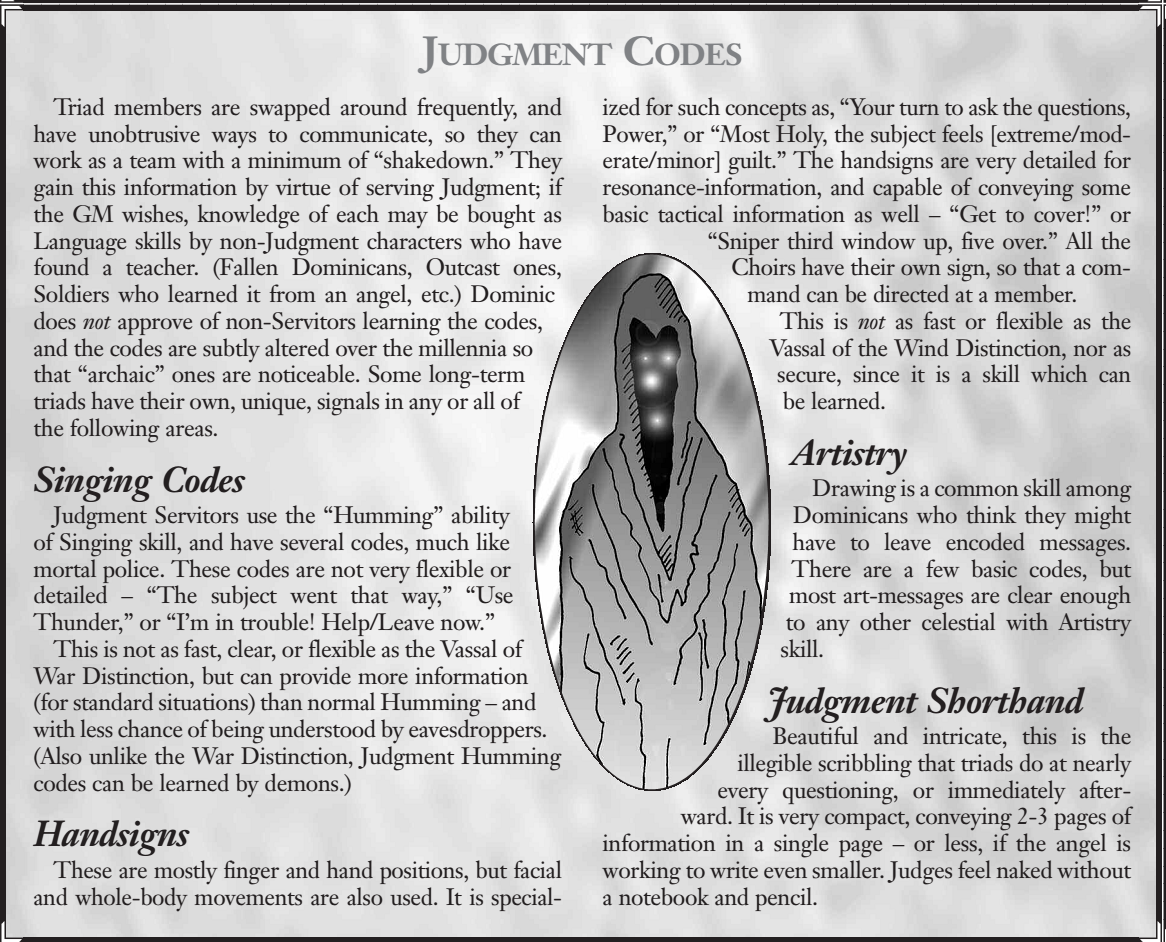
Game-cooperation triads require angels that work atypically flexibly for Judgment yet are also exceedingly loyal. Rarely is any single angel or even a duo allowed to work with the Game - you need a full triad, any cooperation is at Dominic's specific instructions, at least in theory. A very small subset of angels are allowed this job, and it requires a lot of Dominic's trust. It's a bit of a dubious distinction, though - even fellow Domincans are sort of appalled by it. Few of them speak of their training or work, but they know a lot about the habits and abilities of demons of the Game. They will typically be a Seraph, a Cherub and an Elohite or Ofanite, depending on need. Elohim are good at spotting treachery but vulnerable to Habbalah. Ofanim are combat-ready and can use Discord to their advantage, but are impulsive. Malakim are occasionally assigned to this, but their nature makes them less suitable. They will always be given artifacts, but never anything powerful or unique enough that its theft by a demon would be too distressing.
Infiltration or spy-triads are typically an Elohite, a Kyriotate and a Mercurian, or specifically tailored to the given situation. Seraphim and Malakim, while good at finding informaton, are rarely temperamentally suited to the job and are used only if necessary.
Local triads are assigned to a specific area, made of whatever Dominic feels will best guard the area, find dissonante or Discordant angels and deal with matters. They typically have Roles in the community and are based out of Tethers or safehouses. Duos are a form of local 'triad' in which it's just two angels, often with longterm married Roles in which both members are loyal and work together well. They are never sent out for any other form of triad duty without a third member, at least in most cases. Solitaries are local 'triads' of one, with a Role in an area and a job to provide info and backup to any other triads in the area. Typically, there will be several in large cities, especially those with Judgment Tethers, who will work together when called on to form a triad. Solitaries are watched very carefully by Dominic.
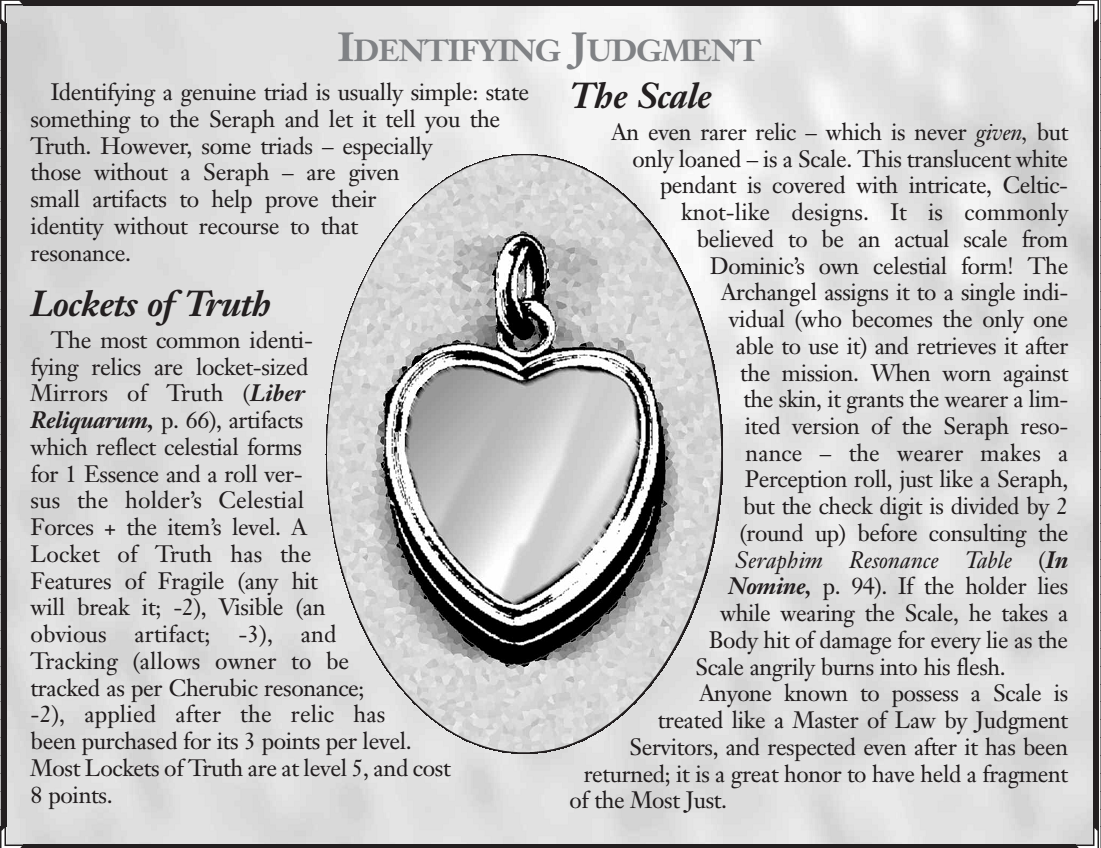
Next time: More Jobs and What A Triad Is Like
Rush to Judgment
Original SA post Superiors 1: Rush to JudgmentLong-term triads are those that have worked well and loyally enough together that Dominic doesn't split them up after jobs. They might be in charge of a specific area, and they're often based out of a Tether. Indeed, some of them are the triads of Seneschals. They meet regularly with roving triads as well as Dominic, to ensure their relationship doesn't taint their judgment. Being trusted this way is a sort of unofficial rank, and members of long-term triads have influence that those who have only been in roving triads do not.
Other triads are formed at need, and sometimes even contain humans or relievers, or trainees with no voting privileges. One common type is formed to investigate incidents and report back. Often these are two Seraphim and a Cherub or Malakite guard. There's also solitary Cherubs, attuned to Redeemed and instructed to trace their movements to ensure they don't get re-entangled with Hell. Allowing these attuned to become captured by Hell, unwilling and unFallen, is dissonant for these Cherubs as an act of injustice. Typically, these solitary Cherubim have other Cherubim attuned to them in the same way, in case both they and their attuned are threatened. It's also rare but possible for the Cherubim to dislike their attuned and believe it'd be more just to throw them back. This is, of course, heresy and must be dealt with.
Judgment angels are intolerant of the sins of others, and even the most relaxed dislike those that are more casual about sin than they are. Most Dominicans have no real concept of free time or off duty. Sometimes, all that keeps them from mass trials is another Archangel clearly allowing the behavior of their servants, and police in that case is for Dominic to bring it up with them directly while the Dominicans simply keep records for later. Triads visiting anyone except an angel of Judgment or the Sword will probably find some problem if they stick around long enough. This tends to upset younger angels of Judgment, particularly when dealing with angels of Destiny. Older angels are more concerned over whether the apparent sin (which might be just enjoying human food a lot) is actually a danger. Roving triads often end visits with something resembling a lecture on the dangers of being ensnared by corporeal life, relationships and so on, then take their notes and leave.
There are two main schools of thought among Judgment. The Righteous school is largely made of angels who remmeber the Fall, those that were made when Dominic was most bitter, those angels that rarely visit Earth, most Malakim and many Seraphim and Ofanim. They are the slightly larger school among angels of Judgment and they hold that sparing punishment is a bad idea. They rarely act politely, are quick to leap on perceived flaws and love to lecture. They hate the politics that keep them from bringing in all the Creationers and their sympathizers.
The Merciful school, on the other hand, is mostly made of seasoned angesl too young to exist during the Fall or truly ancinet angels that remember before the Fall. They believe their duty is to keep angels from Falling and that the best way to do it is to remind them of Heaven's love, not its wrath. They try to be polite, though they still don't understand why people don't like to be questioned in front of others. They attempt to restrain their instinctive reaction to minor sins and investigate instead to see if the sins are actually problems or just quirks. Some even go so far as to offer Outcasts sentenced to death a chance to repent and agree to imprisonment and retrial.
Both groups bring about the same number of angels for trial, though the Righteous request more arrest warrants. Both groups find approximately the same numbers guilty and innocent. The Merciful more often sentence angels to exile from Earth than to death. There are no statistics on how many Outcasts or Fallen result from their visits. In either case, Triads tend to take on the character of their leaders. If the Seraph wants to be merciful, the others won't publically contradict, even if they believe in harsher moments, though they will argue for them in private. Likewise, a Seraph that likes to rant will not be silenced unless their rank becomes unjust, though there may be many uses of the gesture that translates roughly as 'Softly, Most Holy!'
Dominicans hold themselves to even higher stnadards than everyone else, and they self-police strictly. They are even more distasteful towards dissonance and Discord among their own, perhaps because they feel it's a personal betrayal, much as Dominic feels every Fall as both a betrayal and a personal failure on his part. If their fellow angel is not lost, they will understand the reserve and confess quickly, asking for aid. The more they deny the problem, the harsher it gets. If it seemes likely that a Judgment angel will become Outcast soon and is behaving unreasonably, it is common for Dominicans to feel justified in killing their vessel and returning them quickly to Heaven. In most cases, they're even right and gain no dissonance. If they're wrong, it is unjust, however, and they will become dissonant and put under investigation. For the unrepentant Judges or those who commit egregious crimes, there are public trials. This is to show that even Dominic's angels are not above judgment, though onlookers do not always grasp it, and sometimes think it seems to be making an example, as demons do. Punishments of Judges are not harsher than normal, as that would be unjust, but they are likely to have extra crimes on the list, such as defaming the Word of Judgment.
Between this and the weekly visits of Dominic, it's rare for Dominicans to spend much time dissonant or Discordant. If they don't take care of it, then Dominic will determine the correct response - often Tether service or a painful slap on the wrist for the Truly sorry, while the self-serving receive public trial. Despite this, angels of Judgment react to becoming dissonant with the same range of reactions other Words' angels do. They are more likely to confess, especially if they thought htey were obeying proper strictures and accidentally did something unjust. Besides, it's not as though you can hide from Dominic. Any Dominican deliberately wanting to become Outcast has about a week to do it in - once their Heart is cracked, Dominic can no longer find them for the weekly visit, but will dispatch a capture triad to their last known location. He also assigns capture or investigatory triads to any area in which a Dominican's Heart was shattered. unless someone Truly saw the angel's soul-death, Dominic assumes neither Fall nor death.
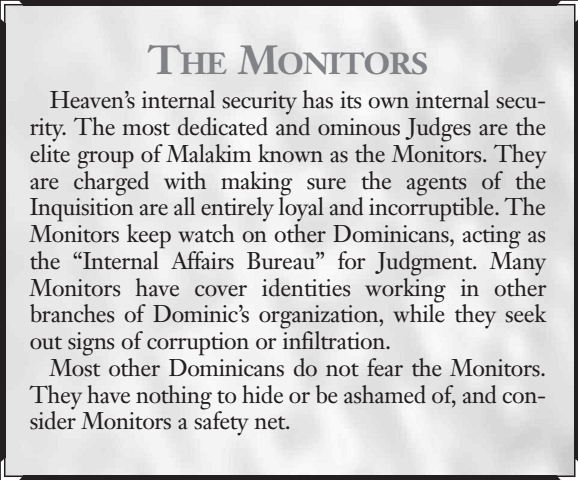
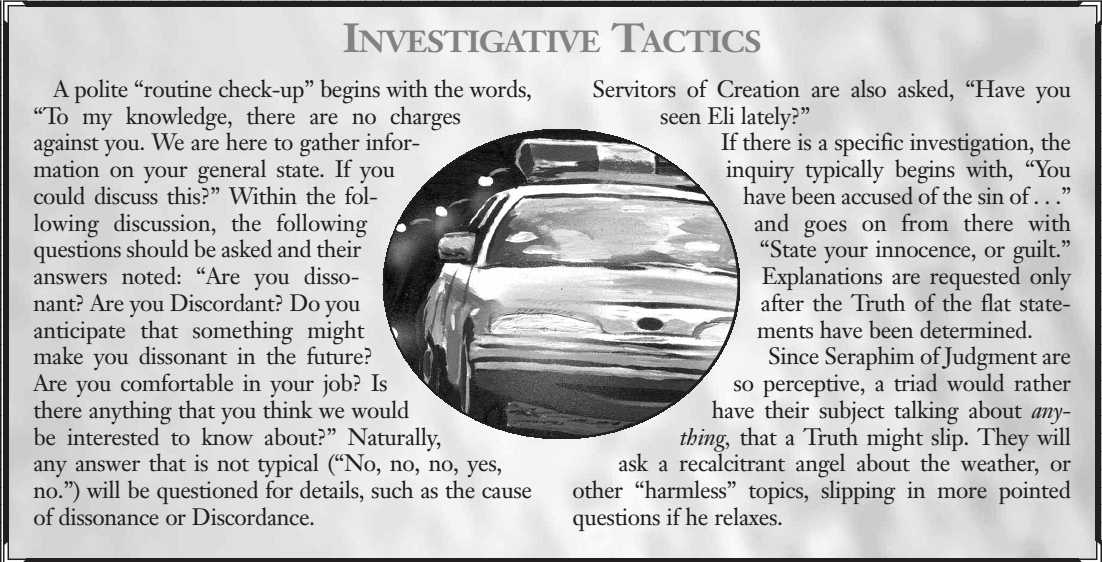
It's not always easy to determine what's heresy, what's sin and what isn't. You have to take into account hte Rites and dissonance conditions of the person being judged, determine if an action is for the greater glory of God, if an action is selfish or if an angel thinks they're doing right but are in error. Falling, of course, is the ultimate sin. While the tacit agreement with the Game does tend to put demons outside Judgment's jurisdiction, it's still a Rite for them to kill demons, corporeally or in soul, and any Fallen not reporting to a Prince is probably fair game, if for no reason other than their inability to invoke a Prince. Willful dissonance or non-dissonant disobedience of your Archangel are both also wrong, but can have mitigating circumstances. Anything that starts a new religion is probably sin, certainly if it doesn't come from Yves' instructions. The Seven Deadly Sins are especially important to be watched for, and any of them are grounsd for trial without extremely favorable extenuating cirumstances. They need not cause dissonance, and triads are often happy to handle overlap by charing a subject with more than one.
Envy is subtle, but one which has made many Fall. It's said that Lucifer envied humanity's importance in the eyes of God. An angel that envies others has lost track of piroities - things are just things, and wanting power is a bad sign. Gluttony, meanwhile, is a Princely Word, and it strengthens Haagenti even if you don't Fall. Triads often refer to it and Lust as 'overfondness for corporeal pleasure' and watch out for angels that overindulge in food, drink, trading cards or what have you. Greed is like gluttony, but more about hoarding than consumptiopn. Those who disregard their duties to gain wealth, art or material goods are suffering from greed. The Wind, especially, shouldn't hang onto stolen prizes too much if they want to avoid charges. It's bad enough to steal, but steal to fulfill your own desires...well.
Lust gets a lot of attention, in part because Andrealphus has wielded it so effectively as a Word. While nearly all the Host agree that God would not give angels the urge to share joy had He minded it, Dominicans are certain it can get out of hand easily. See also: the Grigori. They prfer that sex be restricted to the minimum necessary for a Role, and then only within the appearance of wedlock, to avoid giving a bad example to humans. Failing that, at least be discreet.
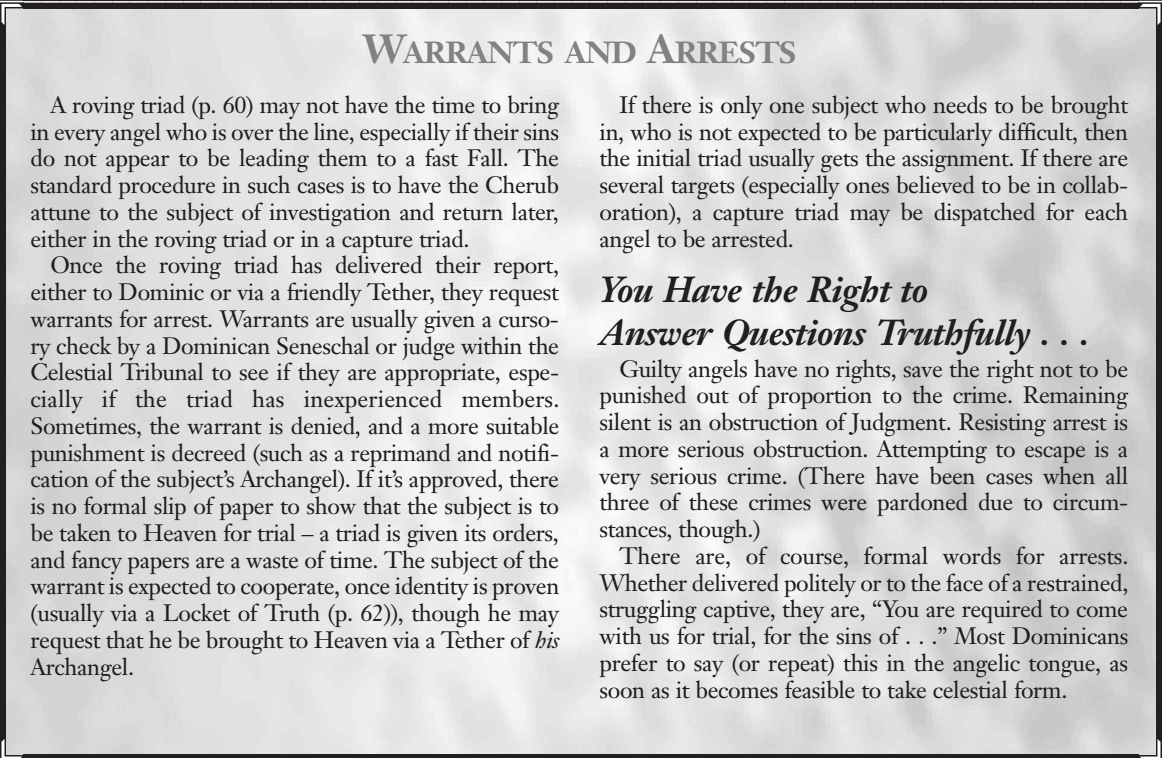
Pride was Michael's sin, indulgence in self-importance and willful blindness to the chance of being wrong. Some say Dominic himself suffers from it at times. When an angel becomes overconfident to the detriment of their plans and the danger of their allies, that's Pride. Sloth is laziness and apathy. It's fairly rare among angels, as Archangels don't want lazy servants on Earth. Wrath is the lightest of the seven sins, as long as it's focused appropriately. One could say that Malakim get away with it all the time. However, focusing on anger to hte extent that it destroy caring is never healthy, and Triads are particularly responsive to reports of Wrath in Mercurians and Elohim, or any angel that seems to be risking the secrecy of the War.
All of these matters justify immediate inquiry with the offender, but do not always result in trial. They are, however, time-consuming and frustrating. Fortunately, many Judges believe the process is punishment enough if there is no treason. That doesn't mean they don't enjoy harassing the difficult - it's petty and they can't let it affect their judgment, but they can enjoy minor revenge. They don't trust anyone that refuses to answer - if you won't talk to a Seraph, you're obviously hiding things. In Heaven, it's very hard to hide things, given the amount of Seraphim, Elohim, Malakim and Mercurians, all of whom see nothing wrong with resonating friends and associates. Thus, the desire to hide things is not Heavenly, and needs investigation. Being overly hostile to a Dominican is also suspicious enough to warrant inquiry - they're just doing their jobs, after all. Anything that hinders them could aid corruption. In general, trying to hinder them is a sign of possible treason, and they'll want to know why, even if it takes hours of questioning or dragging you to a Tether.
If a Seraph hears Truth in protestations of innocence, however, then you're innocent. Period. The Symphony's a powerful witness. If an action is dubious but a Rite, well, you can't punish someone for behavior their Archangel blesses. Dominic might raise policy questions, but that's not the work of a triad. Just document it and any adverse effects it might have as evidence for Dominic. Judgment also understands that some behavior is required to appear human. Triads never eat or drink on duty, but know that some angels must as part of a Role. Likewise, dating, the appearance of sleep rather than being on the job all the time and time-wasting hobbies are allowed.
Next time: Guilt and Punishment
The Final Judgment
Original SA post Superiors 1: The Final JudgmentJudgment's code of punishment is an eye for an eye. Rehabilitation comes after penance, and only with remorse as well. Punishment and penance are designed to fit the crime. Mistakes are sentenced lighter than willful sins, and sincere regreat means penance is more likely than sentencing. Even the lightest sin, however, will be judged harshly if the accused is also willfully blind to their effects on others. Once someone gets dragged back to heaven, the situation escalates from if it was solved on Earth, though once a while these cases do get dismissed. The most common punishment by far is reprimand, which does not even require celestial trial and can be administered on the scene. It's used mostly for incidents where an angel doesn't realize they've gone out of line.
Next most likely is penance, depending on if the accused will admit to wrongdoing. Penance is always something that gives plenty of time for reflection and enough hard work to purge and atone for guilt. It can involve anything from a special mission to temporary service to another Archangel. Punishment never, however, includes dissonance. It may include Discord, usually in conjunction with penance for someone with a minor crime but no real contrition. This Discord must be given by a Superior, and the guilty angel's Archangel will usually not appreciate being told they have to make time for it.
If a subject also needs to learn humility, they can be stripped of attunements, Distinctions or even Forces. It's meant to to teach them to work with others, not act alone, but Archangels still don't welcome their servants when they come bearing a note of what punishments they're meant treceive. Sometimes, an angel will be Cast Out from Heaven, as the Grigori were. It may have a duration or be attached to a mission of atonement, or it may not be.
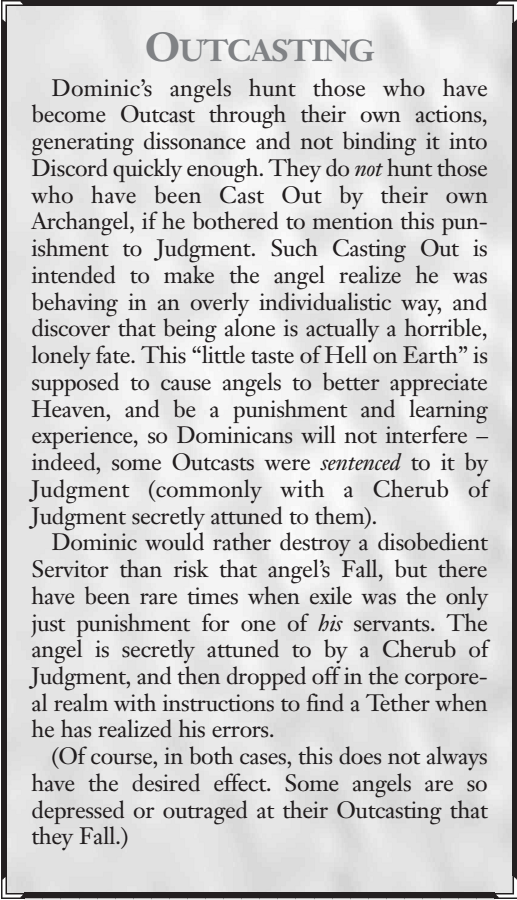
An angel too dangerous, to themself or others, to allow to be on Earth will be stripped of their vessel or, if a Kyriotate, of their Corporeal Forces. If they are bitter or defiant, they will also be attuned to a Cherub of Judgment to check for seditious activity. Treason may result in indefinite confinement in the Tribunal, if not destruction. Dominic does not trust other Archangels to make escape-proof prisons, and is very unlikely to release offenders to anyone else's custody.
The ultimate punishment is soul death. Any angel who becomes Outcast by their own actions is at risk of this sentence, though they can lessen it by throwing themselves on the mercy of the court, generally by ridding themselves of dissonance, finding a Tether and begging for help from any triad they meet, but the sentence may still be death. Any willfully disobediant Judge is also at risk of death, as corruption among Judgment is a serious crime. More often, soul death is the decision laid down on those deemed willfully malicious, too insane to comprehend their evil or otherwise likely to jump from the point where Michael hurled Lucifer into Hell.
If a judgment requires an Archangel to administer the sentence, that Archangel will be notified by courier so they can do it personally. If they wish to review the trial or bring it up in council, they will. If they are unavailable, the guilty party must allow another Superior to perform the sentence or risk charges of obstructing Judgment. For judgments of death, there's a waiting period for the angel's Archangel to be notified, and if that Archangel does not contest, then justice is swift. However, from the moment of sentencing to the day of execution, Seraphim with the Celestial Song of Tongues are posted at all major entrances of the Tribunal. If any angel can approach them and Truthfully say that the sentence is unjust and they have proof, the Seraphim will use their Song to halt the execution until the new data can be examined.
That's Judgment!
Next time: Putting demons to the Sword.
A Sword In Hand Is Worth Two In The Bush
Original SA post Superiors 1: A Sword In Hand Is Worth Two In The Bush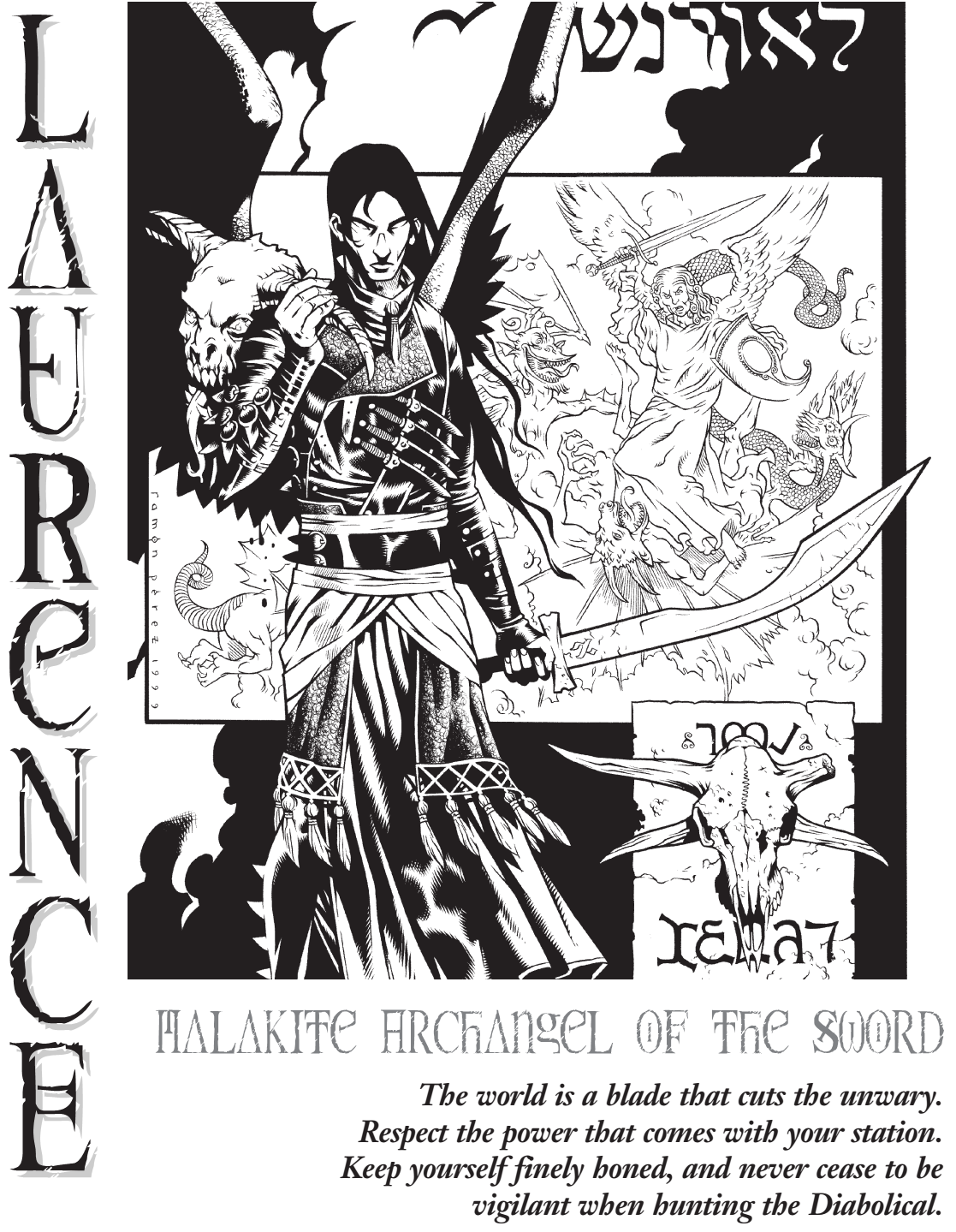
Laurence, Commander of the Heavenly Host and Archangel of The Sword, used to work for Uriel until the Purity Crusade ended. He was the top demon hunter, and suddenly he was an Archangel.
Bright Lilim of the Sword apply (Celestial Forces) as a penalty to any demon's attempt to resist their Geases. Laurence tries to get as many of them as he can, as they are so rare, but the Seraphim Council tends to care more about what the Bright Lilim want than what Laurence wants.
Scabbard is a Servitor attunement allowing you to 'sheathe' any number of weapons outside normal space, concealing them entirely. You can draw a weapon from thin air instantly, but any weapon stored this way must be one you can wield personally - the upper limit's about an M-60, practically speaking.
Purity of Purpose is a Servitor attunement allowing you to speak to a group of humans and quiet the districtions in their minds. They lay aside arguments and fears, focusing on whatever goal or problem you present for at least as long as you speak to them - longer, if you're a good speaker and they're good listeners.
Holy Fortitude is a Servitor attunement that lets you spend Essence to put off a vessel's death for a time, even your own. You must be able to see the vessel and spend 2 Essence immediately when death would happen. The victim makes a Will roll, with their Will tripled if they are currently working towards a sincere and righteous goal. They stay alive for (2*CD) rounds, regardless of any injuries they take in that period.
Divine Absolution is a Servitor attunement adapted from Purity - one of the few Laurence could manage. It allows you to touch a dissonant angel and remove one dissonance, at the cost 5 Essence and 4d6 soul damage to yourself, which heals at 1 hit per hour if you're in a Sword Tether. Laurence tends to grant this attunement only to ranking angels who will assign penance while they use it, and only to the truly repentant. Obviously, accepting payment or reward for its use would be horrible.
Laurence offers higher Distinctions, but does not grant any powers with them - just responsibility. Before he reorganized in the 1800s, each Holy Order had their own Distinctions, with many, many titles confusing everyone. Since then, Laurence only hands out three higher Distinctions: Major, Colonel and General. All former titles were granted one of these ranks but may use their old titles for formal purposes. Each Order is also led by a Grand Master, who will always hold an appropriate New Order rank. This does mean non-Laurentines have a bit of trouble figuring out rank structures still. Angels of the Sword expect people to recognize and use their distinctions, so Peliel, Malakite of Righteous Vengeance and a Colonel is known as the Colonel of Righteous Vengeance, or more formally by his old title, Grand Cross Puissant of the Order of the Eternal Sword.
Expanded Rites:
1. Fight a fair and honorable duel.
2. Lead folowers to victory over diabolical foes.
3. Forge a fine sword and consecrate it to fighting evil.
4. Baptize a sincere convert into the Church.
Common Sword Malakite Oaths:
1. I will remain chaste.
2. I will not partake of alcohol or drugs. (Some Malakim go further, regarding food as an unnecessary distraction and swearing to only eat or drink as necessary for their Role.)
3. I will not refuse aid to honorable souls in need.
4. I will never use trickery or treachery to defeat my foes.
5. I will be respectful to everyone, even my enemies.
6. I will always act as a model for how I believe others should behave.
7. I will give away anything I do not need and cannot carry.
8. I will not draw my sword unless I mean to kill someone.
9. I will never refuse an honorable duel.
10. I will not allow any insult to God, Heaven or my Archangel to go unanswered.
Laurence was created long after the Fall, shortly before the time of Christ, as a Malakite, made for war. He never knew a demon as anything but a foe, and he became a demon hunter under Uriel, Archangel of Purity. He went all across Earth, slaughtering thousands of demons. In time, he was even given the Word of the Sword, shortly after he converted to Christianity in the 4th century. In 715 AD, Uriel ordered the destruction of the beasts of myth, seeing them as a force too often used by Hell, and deciding it was time to make a new age in the wake of Rome's collapse, in which the possible and impossible were clearly defined. Conceptual purity, in other words. Some of the beasts that could travel between Earth and the Marches were also hunted to extinction, forcing Blandine to protest to the Host and to God, but it was too late. The dragons and gryphons were destroyed. Laurence was key in the cleansing, following his orders well. When Uriel was tried, the Seraphim Council was unsure whether to punish or reward the angels of Purity, for they had only followed orders excellently.
God took the matter out of their hands, bringing Uriel to the higher Heavens to be seen no more and elevating Laurence to Archangel and Commander. Laurence became chief general of the War, charged with forging the Hhost into a new Sword. Only Yves and Dominic seemed unsurprised by this. Laurence himself was shocked, but took to the new role eagerly. He moved his base from the Castle of Purity to the Eternal City, where he took stock of all Heaven could bring to bear, from its angels, Saints and Soldiers to more abstract concepts like organized faith, divine right and commerce. To Laurence, each facet of the War reflected the others, a complex game of finite principles and pieces. Earth was in turmoil - Rome alive by sheer inertia, Byzantium rising, conflict in the East. Laurence quickly settled into the patterns that would define his strategies for centuries, methodical and thorough. His precision and predictability did cause him problems, but Michael, David and the others were and are there to help.
For nearly 800 years, Laurence worked frequently won his battles. He had a good eye for usng the other Archangels, and except for his tendency to exclude Novalis, it worked out most of the time. When it failed, it was because the angels were imperfect in reality, unlike in his plans, or because Hell did not fight fairly. Hell won a lot more fights with individuals, particularly individual humans, then with massed demomic hordes. Hell's sneakiness and Laurences idealism made that very frustrating for him. In the early 16th century, though, Earth was getting dangerous. Hell brought technology and divisiveness to bear. Uriel's dream of a clearly defined world had come true, but backfired. People began to doubt God as impossible, became distracted by new sciences. Within a few decades, there had been Torquemade and the rise of Humanism. Laurence was deeply, deeply frustrated, as he saw the Church of Rome as one of his most valuable tools. Still, it was threatened from within, more and more. This set the stage for Laurence's most important lesson on humans.
Laurence tried to beat the demons at their own game, manipulating a mortal to alter the history of the world. In 1516, he approached a charismatic Doctor of Divinity with the errors that needed correcting in the Church, hoping it'd reinforce faith from the outside in. In less than 15 months, it all went bad. Martin Luther, Laurence's chosen agent, had not been let in on the secret, so he did it his own way and nailed his challenge to the door of Palast Church. Laurence watched the continuing crumble of the Roman Church and the rise of the Protestants with horror. From then onward, he had a new attitude, dividing humans into three camps: innocents to protect, sinners to rescue or destroy, and agents to cultivate openly. If humans were going to be stubbornly individual, Laurence decided, they must be willing agents, not dupes. The War, after all, was for and about them. Michael and the other Archangels began to hope more, though Laurence has still not learned to treat angels with the same individuality he does humans. With his newfound respect for mankind, Laurence took on the job overseeing the training of all Soldiers, regardless of Word, and the coordination of the Saints (or bodhisattva), but continued to treat angels more like chess pieces than people. As the modern age dawns, mor and more wonder if perhaps Laurence would be better off on the front lines than in the planning room.
Those who deal with Laurence for the first time often mistake his passion for anger. He's intense, he insists on obedience and he demands unwavering courage. Still, he is not an angry angel. He actually is somewhat fearful - he's at the center of the storm, trying to run a war only God and perhaps Yves understand. He knows his past strategies were flawed, but he is determined not to let the stain of his past failures ruin his present or future plans, or to let his fear rule him. Courage, after all, is not absence of fear. Laurence is a Malakite born, genuinely noble and willing to die to see Hell vanquished. He's also an optimist, believing that light must ultimately win, that God cannot be defeated by an upstart Fallen angel. Laurence is in many ways the perfect knight, fighting to his last breath to keep from being disillusioned.
Laurence has eight Oaths, all sworn by choice - he's not once been Dissonant. First: Never suffer an evil to live when it's my choice. Laurence answers only to God, so he has no excuses - he can't say that his Archangel gave him orders. He can justify letting demons escape only when his duties require him to pay attention to more important things, and even that pains him. He keeps a list of every demon he's met and every demon that opposes him, and it's rumored he's sworn to kill all of them, presumably with exemptions for the Redeemed. His hit list is made available to any of his angels, and killing a demon on it is considered a meritorious quest. Second: Never surrender or allow myself to be captured by the armies of Lucifer. Laurence's optimism is drawn from this oath: he can't lose. Lucifer must, ultimately, fail. Any other outcome is literally unthinkable. Third: Strive for perfection in all things; never lower my standards for the sake of ease or convenience. This is what drove Laurence to earn his Word, and it can drive his fellow Archangels mad that he refuses to accept less than perfection. He demands it of his angels as he demands it of himself. He does not do things the easy way, and while he knows that others will not live up to his standards, that even he cannot be perfect, he fervently believes that only by adhered to God's standard as much as possible will Heaven prevail - lowering your standards means accepting Lucifer's view. Fourth: Never question the will of my Superior. Once, that was Uriel. Now it's God. God doesn't talk much, but he made Laurence the Commander, and so Laurence will never question his post or step down unless God Himself orders it. Fifth through seventh: Respect your weapons, and treat them with care. Always use the finest weapons available. Never choose a weapon you don't respect. Laurence swore these three at different times as his philosophy evolved before he gained his Word. He never expected them to apply to the whole Host. He respects other angels now, but ultimately must think of them as weapons, not people. Because he can't give them jobs they're unworthy for, he drills them relentlessly. He can't respect Novalis and has lost all respect for Eli, so he doesn't include them in his plans. He respects a few of their angels, quite rarely, but not them. Eight: Protect and uphold the Holy Catholic Church. Put the welfare of the Church and its members above my own. Laurence swore this when he became Christian. It was his final oath, causing him much distress in 1054 when the Church split, but he managed to overcome it. He still embraces all of Christendom, but far prefers the Catholics. While others fear he'd risk Heaven for his Church, it's not so. He'd risk himself , but as he knows his position is more importan than himself, he must place the Host's welfare above the Church's.
Laurence believes that God is right and just and good. He knows God is omniscient and omnipotent and has a Divine Plan for all the world, which does not include Lucifer's victory. Laurence does not believe angels have free will, but instead are the instruments of God's will. Before the Fall, it was impossible to rebel, but Lucifer introduced Evil into the world, which can corrupt angels, causing them to Fall. An angel must perform according to God's will to avoid corruption, as any deviation from the Divine Plan is evidence of Evil's taint. That is why Laurence expects unquestioning obedience and has such high standards. That the Divine Plan is not always known does not matter. Laurence will obey it as he understands it, confident that God will reveal all He deems necessary to reveal. As for how Lucifer rebelled in the first place, well, that's the Question of Evil. Laurence has no answer, but doesn't care. Evil exists, thus it must somehow be part of the plan, and it is Laurence's job to expunge it. Laurence is a staunch Catholic and believes in the Trinity. He believes God sent His only Son to Earth, to die for mankind's sins. Jesus was the Messiah and will return at the time of Final Judgment. The Holy Spirit is the medium by which God's will is communicated.
The Christian doctrine of Jesus' nature as both God and man is important to Laurence's views on humanity. If God could incarnate Himself as a human, they must be both free-willed and important. Laurence also notes that God has sent many human prophets with messages even angels were not given. Thus, he has come to accept that free will is part of humanity and that Heaven can only guide and encourage them, not control them. He's yet to be convinced this is so of angels, and inf act believes that angels exist for man's benefit and should therefore act strictly according to their roles. This doesn't mean humans get to do as they please, though. They can choose selfishness and damnation, but the virtue of the Church is that it imposes strict, faith-based rules for peuple. Laurence knows the Church is imperfect and not always correct, but that's okay. If humans could be relied on to obey God, accept Christ and be selfless on their own, that'd be ideal, but they can't, so even rote obedience to the Church is better than selfishness.
Laurence is a busy, busy Archangel. On top of organizing the Host, he rules the Eternal City, oversees the Halls of Worship and is responsible for the training and assignment of Soldiers. He coordinates the Saints and bodhisattvas of Heaven, and he also plays at politics in order to increase the power of Christianity. (He's always honorable and open, but he very much is a partisan when it comes to faith.)
As Uriel's Angel of the Sword, Laurence was given dominion over questers and demon-hunters among the angels. In 745, however, his Word was expanded beyond the literal. His sword is the combined might of Heaven, a metaphor for every weapon of light, from Marc's financial powers to Novalis' ability to cal hearts, though Laurence tends to ignore her when he can. It is his job to array these resources on the field, cordinating them against Hell.
Laurence was present for the founding of the Roman Church, witnessing Peter in Rome around 60 AD. He witnessed the crucifixion of Peter as well, long before he got his Word, and he did nothing because the Romans were human and not tainted by the diabolical, but he admired Peter and grieved for him. He had little time for theology in his hunting, but in his travels, he marveled over the quick spread of Christianity. He was not convinced of Christ, however, until the 4th century, when Uriel converted after the first Council of Nicea. Laurence, ever loyal, converted as well, swearing to defend the Church Peter had made. Shortly therafter, he was made Angel of the Sword. When Laurence became an Archangel, he envision a universal Church as one of his greatest weapons, but by then it was already fragmenting. When the Church of Rome and the Church of Constantinople split in 1054, he was torn - both factions claimed to be the original, and most believed it temporary, so Laurence embraced both Churches. As the dcades passed, it became clear the rift was permanent, and Laurence had to choose, as his oath could not apply to both equally. While Constantinope was more vital and potent militarily, Laurence chose Rome because of Peter and Uriel. He has not forsaken the Orthodox, and he considers himself patron of all Christians, even Protestants - they didn't change the essential Gospels, after all. Laurence does not hate or dislike Jews, Muslims or even Buddhsits or Hindus, but he believes Christianity is correct and has the greatest chance of saving mankind, particularly the Catholics.
Laurence has quite liked Pope John Paul II and the directions he moved the Church in. John Paul traveled, working hard to expand the Church's reach and keeping the USA's connection to them strong. He tripled the number of Catholics in Korea and did surprise visits in Denver. Laurence was really happy, and while he knows that John Paul will soon die and looks forward to speaking to him and getting his advice more directly, he worries about where a new leader might take the Church. (And I have no idea what he's thoughts on Pope Palpatine or Pope Francis might be.) Still, while Laurence may have his dobuts early on, he has none now. He would risk everything for the Church, or at least much of the Host thinks he would. The other Archangels work to be sure this is a strength, not a weakness for Hell to exploit in their commander.
Next time: War planning
Crossing Swords
Original SA post Superiors 1: Crossing Swords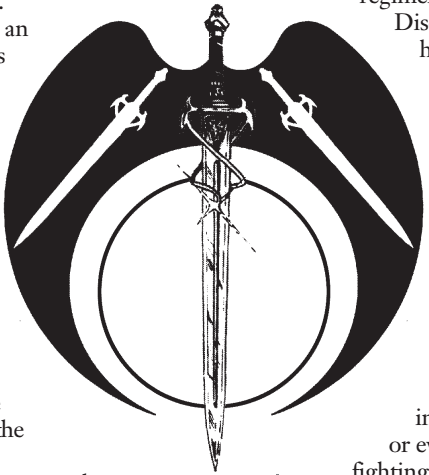
Laurence's symbol.
It's Laurence's job to plan Heaven's strategy in the War. Each Archangel has their own agenda and fights within their own sphere, but Laurence coordinates them all so that Hell can be defeated as a whole. Like Baal, Laurence sees the War as a chess game - but unlike Baal, he believes it's fixed, with all pieces in play. Only under the pressure of great events will he admit that the rules can be changed. This is frustrating, because Hell cheats. Those that say his inflexible nature dooms him to fail, however, overlook his many victories. Laurence is an unparalleled master of strategy, and when Hell wins, it's always by doing something unexpected that he has not prepared for. Laurence has never been caught off-guard the same way twice, and after millenia, there's only so many new tricks left. When the War follows a plottable course, as it often does, Laurence does not fail. The pieces he puts in play, on the other hand, can.
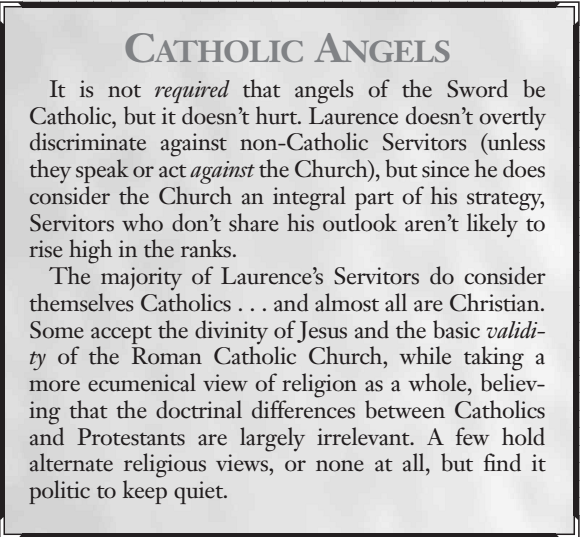
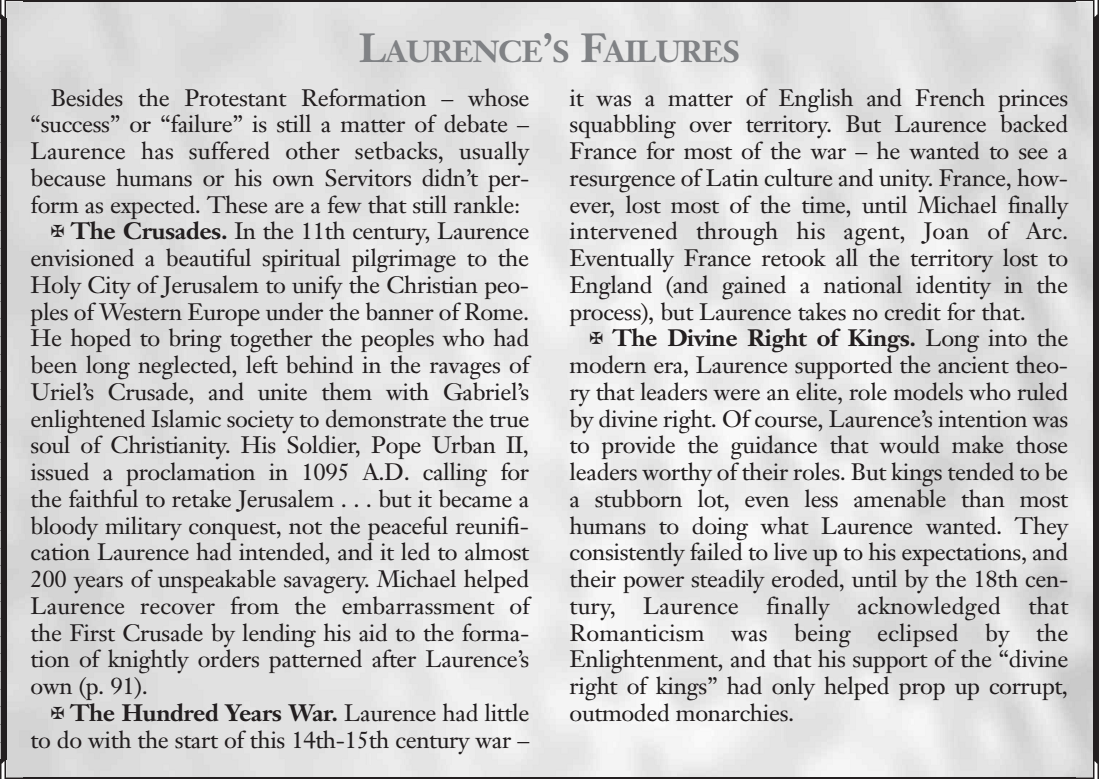
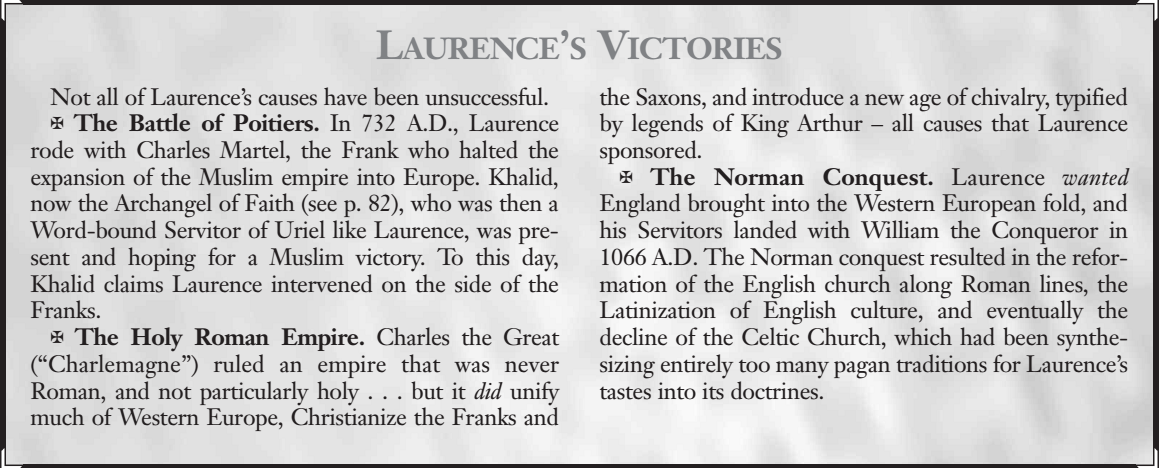
Laurence has three main doctrines in the War. First: Hold That Which Is Ours. Laurence takes what Christ said to Peter seriously. Te Host's power must be built where it is strong, and so he encourages every Archangel and Wordbound to vigorously defend their Words. Given how Hell assaults them, this often becomes very aggressive strategy despite how it sounds. Laurence also puts a very high priority on Tether defense - it's more important to him to preserve the divine Words and Tethers than destroy infernal ones. Second: Strike to the Heart of the Enemy. When it's possible to take the offensive, Laurence doesn't hold back. He doesn't want angels to just slowly grind down Hell, taking out random demons. He wants to destroy important targets, hard and fast. Killing one Wordbound is more important than a dozen minor demons. Destroying a Tether weakens Hell more than killing every demon in a city but leaving it intact. Demons fear Laurentines because they know when the Sword attacks, it picked an important target and has dedicated itself to utter destruction of it. And third: Win Souls. The hearts and minds of humanity are the ultimte battlefield of the War. Thus, Laurence encourages missionary work, trying to bring as many humans to God as possible. Ideally, Catholics, of course, but any selfless cause will do. Laurence prefers noble causes over merely being good and religious causes over secular ones, Christian over other relgiions and Catholic over other Christians, but he approves of even an atheist teaching illiterates to read as a light against Hell.
Laurence needs diplomacy with the entire Host, which is a tightrope over a pit of spikes that few other angels need to bother with. His youth and idealism are what keep him strong. Sure, his harshest critics say he can't look the facts in the face, but maybe that helps him some. Michael's never actually accused Laurence of being unfit, as he trusts God, but he's not shy about telling Laurence when he's fucking up, either. Laurence takes it with good grace, but it's a heavy weight to always be under the eye of the first Commander. They fought once, in a duel they both say was just practice, though some say Michael proposed it when he felt Laurence was getting too haughty. Laurence lost handily and has been more humble since, but he's confided to his closest advisors that he doesn't think he's ever really earned Michael's respect, and it'd mean a lot to him if he could.
Laurence doesn't get Eli. He looked up to the guy once, but Eli's abandonment of Heaven was an act of betrayal, and he wishes all of Eli's angels were transferred to other Archangels, before Eli drags them down with him. He doesn't get Novalis, either. If she were just a Wordbound, he could understand her, but as an Archangel, well...being nice is fine, good even, but this is a War. Some demons might Redeem, and that's good, but you don't extend hospitality to the rebels. Novalis is extraneous, and he wishes she'd stick to her own domain entirely.
Khalid was Uriel's left hand as Laurence was his right. Khalid is far older and believed that he should have been made the Commander of the Hhost. Now, Khalid is the Archangel of Faith and fierce promoter of Islam, as fiercely as Laurence is for Christians. Their rivalry dates back to the Battle of Poiitiers. Laurence has not held a grudge, however, and even defends Khalid at Council. Khalid never speaks openly against Laurence, but privately disdains both Laurence and the Church. Laurence hopes to one day truly reconcile.
Laurence is friendly, or at least not unfriendly to all the other Archangels. He and Dominic are long allies in supporting the Catholics, and Laurence htinks Dominic is essential to the Hhost. David is a friend, a fellow Malakite whom Laurence includes in all his planning seassons. LAurence does not work closely with Jean, but respects him and trusts his judgment as well as trusting him to counter Vapula. He'll always help Jean promote his innovations. Janus is a warrior Archangel, but is one of Laurence's more outspoken critics. Laurence tries to ignore his words and does not often include Janus in his planning councils. The other Archangels have their parts to play, and in exchange, Laurence helps them when he can.
Superior Opinions posted:
Same deal as before.
Blandine: His influence on men shapes more dreamscapes than he knows. Some of them aren't on my side of the Marches, but Yves trusts him, and I trust Yves. I prefer him to Uriel.
She is the general of the broadest beach-head of the human soul. I let her do what she does best; she always, always comes through for us. Sometimes we fail her , and I regret those times deeply.
David: Steadfast. Determined. Focused. It's fair to say I admire the youth, and we've worked well together. His Soldiers and mine mesh nicely; they do good work, permanent work. I do wish he would spend more time considering the realities that his plans ignore. I could do better, and he knows it. But Laurence has an edge on his soul that puts his sword to shame, and we need that.
David's courage and steadfastness are unequaled, and he is an asset to our cause. Of course, there is more to waging war than brute strength.
Dominic: The Malakite of the Sword... He is valuable, well-suited. Incorruptible as only his kind can be, and he moves with purpose to bring order and purity to the humans, with his favored Church. His sword is still touched by the designs of Uriel, in so many ways. I approve.
Dominic? Dominic has a thankless task and performs it well. None of us likes to think we're less than perfect or that someone we trust might be an enemy. Dominic knows the enemy can come with an army - or as a whisper in the night. It is his job to hear the whispers.
Eli: Nice kid...a little intense, but that comes with the job. I know he's upset that I'm not up there in Heaven, but I think he's doing fine without me. I have faith in him - it's too bad he can't reciprocate.
What in the Hell does he think he's doing? Does he think being one of the first Archangels excuses him from participating in the War, that his job is over and now he can take a vacation while the rest of us try to save Creation? I fear Dominic may be right about him.
Gabriel: He glows with the same fire that consumed Uriel, but his is a more tempered flame. He burns brightly, but he flickers with uncertainty. He has not yet been through the crucible...we shall see what emerge.
Gabriel's Servitors are dedicated and noble, but Gabriel herself cannot be relied upon. She is a primal force whom I've given up trying to direct. In her rare moments of lucidity, she delivers amazing intelligence, and I know she possesses insights even Yves does not.
Janus: I dislike his predictability. We don't need some idealistic demon-hunter lining the Host up to be smacked by Hell and blinding them with glorious speech. We need to move more quickly, inside and behind and under and above...Michael understands. Why isn't Michael there? Tell me that!
He takes the war directly to the enemy, and I respect that. I'm glad to have his power on our side. But he needs to stop complaining about how he thinks things should be and learn to work as part of the team.
Jean: We don't work that closely together. He leaves my angels to their work, and that's fine.
Some of Jean's Servitors have a habit of getting too absorbed in their projects, and forgetting there's a War going on. But Jean doesn't. He may withdraw into his Halls of Progress at times, but when he emerges, it's always with a brilliant idea. My patience has always been rewarded.
Jordi: He is as deadly and graceful as any of God's creatures. He hunts the diabolical, with skill and cunning. He kills what needs to be killed. Nut he always votes to protect the works of man. He is not my enemy, but he is not my friend.
He protects an important part of God's Creation, and he does it well. But Jordi needs to realize that God gave Man dominion over the beasts for a reason. If we lose humanity, we lose the War. I hope someday he'll come out of the wilderness.
Marc: He understands the role of commerce...he isn't just about his blade, and I respect him for that. I've heard some unpleasant talk about his strategies; I don't repeat it. Bad for morale, bad for the whole team. I like his strategies; he remembers that there are a million fronts, and that not all of them involve blood. Perhaps he wishes it were otherwise; I don't know. But he does his job. He needs to learn about Vacation Time, though.
Marc doesn't get nearly enough credit for his role in the War. He may not engage the enemy directly, but he strikes at Hell's soft underbelly, the realm of money and influence peddling. He finances a lot of our operations, and he teaches mankind that one can be virtuous and prosperous.
Michael: He is brave and noble. His talents seem wasted in the Eternal City, though. He should be down there carving up the vessels of Lucifer's servants, not moving our warriors around like chessmen. He's a terror, or can be...but he expects merchanical perfection from the angels, and as much honor from Hell as he has himself. His sight is keen, but his vision blurs when he looks at the War from a distance. We elders try to counsel him, and we try also to remember that he must have been given his post for a reason.
I am humbled by his skill and strength. It sometimes worries me that I and not he hold the title of Commander of the Armies of God, until I see the damage that can be done by the lack of overall coordination, and realize again that we need a commander and not simply a champion. He views me as a youth still, and I always welcome his advice. Perhaps some day I will earn his full confidence.
Novalis: Mmm... He doesn't like me. I like his intensity: it's bright and it's warm. He loves his fights, and I don't, but he is what he is , you know? He has so much to learn, still. He's never learned to let his hair down except to dry the sweat and blood from it. He's never let himself see that we can win just by bringing humanity a little peace... Happy people don't invite demons in. I don't think Laurence knows that. And I think he's pretty much alone, inside.
She constantly hinders operations with her insistence on showing mercy to diabolicals. Peace is a wonderful concept, but peace is for after the War is over. I wish she and her Servitors would concern themselves more with plants and less with humanity.
Yves: Some are inclined to judge him harshly, because he hasn't already won the War for us. After spending eons waiting for the Earth to cool, haven't his fellow Archangels learned patience yet? God didn't select Laurence on a whim.
I respect him. I admire him. There are days when I envy him, and one or two days when I think I'm lucky enough to understand him. I'm glad the Halls of Worship are left to me, though. He made some mistakes there that he's been wise enough to avoid making again.
Andrealphus: I could make all the jokes about swords - but really, he and his angels are so foolishly ethical, always interfering in other people's pleasure. They should learn that the ultimate part of one's desire is proving your control by knowing that you're doing what the other person doesn't want...
He has taken one of God's greatest gifts and perverted it into something filthy and degrading. Do not underestimate Lust, for it has caused more humans - and angels - to go astray than perhaps any other sin.
Asmodeus: An impudent pup, blinded by idealism. He's a child pushing pieces around on a board he doesn't understand. Laurence worried me more when he was down on Earth, carving up our forces. I wish him a long career as General of the Host.
By killing their own kind, his demons do some of our work for us. But he is crafty and his spies are everywhere, forcing us to be ever-vigilant.
Baal: Am I supposed to accept this... whelp as my adversary? Bah. It is laughable to think of Laurence as Michael's replacement. Yes, he is a competent tactician, but this game bores me. It is time to end it.
It is good that he underestimates me. Pride blinds Baal more than my supposed naivete could ever blind me. I am secure in the knowledge that even if I should fall in the final battle, God's forces will prevail, and all Baal's carnage will avail him not.
Beleth: He brings bright dreams...knights in shining armor, puerile fairy tales. And his Guardians of the Marches keep the darker dreams at bay. But they can't protect humanity from itself. I am the darkness that Laurence dares not gaze into.
I pity Blandine, who must suffer over what her lover has become. But I do not pity Beleth. Killing her will put two souls out of their misery.
Belial: It doesn't matter how sharp the blade is; apply enough heat, and it'll melt. Someday, I'm going to light that kid up like a candle.
He's probably more responsible than anything else for Gabriel's madness, and I'd welcome the opportunity to prune the Word of Fire to one bearer. If Belial wasn't held in check by Baal, he'd be as great a danger to his own side as to ours.
Haagenti: Annoying. Gets in my way. Stops people eating. Spiky, too. Someone should sort him out - what do we have an army for, anyhow?
What a disgusting creature. But dangerous. One of the deadly sins, indeed. Someday, that obscene, ravening maw will be shut forever, when I drive my sword through his skull and pin his jaws together.
Kobal: So, God's on Generalissamo Number Three...they seem to have staffing problems up there. Anyone who takes himself as seriously as this boy does is just begging to have a "Kick Me!" sign pasted on his back. And you know, that's not a bad idea...
What have we to fear from this laughing buffoon? Kobal can only threaten those who are insecure. The Holy Spirit is a shield against scorn and mockery.
Kronos: We need not deal with Laurence directly. We defeat him by defeating Heaven in the War. Laurence's fate is to fail.
He worries me. Some say he's a dark reflection of Yves. I don't know about that, but somehow he has access to a lot of classified information, and I want it stopped.
Lilith: Heh. How charming to know the General of the Host is younger than me. What I'd give for the key to unlock the chains around his virtue... But he's best avoided; much too dangerous. If you get any Geases on his Servitors, though...call me.
She chose to walk away from God. She cloaks herself in the ideology of liberation, but never forget that she represents the consequences of free will exercised selfishly - the freedom to choose Hell over Heaven.
Malphas: Laurence is proof that the whole is not greater than the sum of its parts. A sword is better at cleaving than unifying. How many different ways can I fragment his precious Church before he sees the folly of relying on anyone but oneself?
I'm tempted to see Malphas' hand in every schism, but I have to remember that he can't dictate what humans will do any more than I can. Still, if not for him, the Church would be far stronger, and we might never have had a Dark Ages. He is one of our most dangerous foes.
Nybbas: Oh, please! Knights in shining armor, saints and martyrs, sacrifice, chastity, honor, virtue, yadda yadda yadda... That's all so pre-post-modern! The kid needs to update himself, get a little anti-hero thing going, maybe a female lead to give him something worth fighting for... But that church-motif has got to go! I'm sorry, but the public media is no place to be preaching moral values.
He condenses everything into a shallow tale of sex and violence, devoid of depth or consequences, and the masses swallow his pabulum. But that vacuous wretch cannot conceal the power and glory of the Word of God.
Saminga: Nasty, nasty Malakite! He's so sickeningly virtuous, and he kills my best servitors. I want him dead! Dead , do you hear me? Dead, dead, DEAD!
Those whom he claims are beyond redemption. He's a horrow-show beyond description, but flesh is flesh - living or undead, it cuts as easily.
Valefor: He's so busy looking for demons, he can't see when we've come and gone. Anyone want a sword?
He doesn't just steal things ...he steals virtue. He robs people of their integrity and respect and leaves them mourning the loss of their possessions. These thieves should lose their heads, not just their hands.
Vapula: Religion is an old, failed mortal paradigm. Laurence is a crusader for the past, when I'm trying to lead the world into the future.
Vapula embodies the dangers of knowledge untempered by wisdom. His science is literally godless - not every new innovation represents progress.
Humanity: They are the reason for everything. The War cannot be fought independently of humanity...we can only win by winning humanity. It is their souls we are fighting to save.
Soldiers of God: Those who know about the War, and serve willingly, are our greatest assets. Do not risk them needlessly, but do not deny them the right to risk themselves, even sacrifice themselves, in the battle against evil, just as we would.
Soldiers of Hell: I will never understand how humans can damn their eternal souls to Hell, knowing full well what they do. But damned they are, so excise them like a cancer.
Pagan Soldiers: They are foolish, succumbing to the promises of old gods, false gods. But some act with a misguided sense of honor. Save them if you can, and destroy their patrons when possible, but don't let them interfere in the War...above all, do not let them become a resource for the Other Side.
Sorcerers: They've sold their souls to Hell for knowledge they could gain for free if they chose the side of the light. Pity them, but do not spare them.
Saints: I am angered when I see angels behaving as if the Saints are being given the privilege of helping us. We are honored to have their help. I see the fruits of our success every time I walk the streets of the Eternal City and meet the souls we've helped save.
Ethereals: They are figments; their time is past. They are not a part of God's plan, and they must not be permitted to interfere with mankind's destiny. Those who are harmless may be ignored, but those who align themselves with Hell must be eradicated.
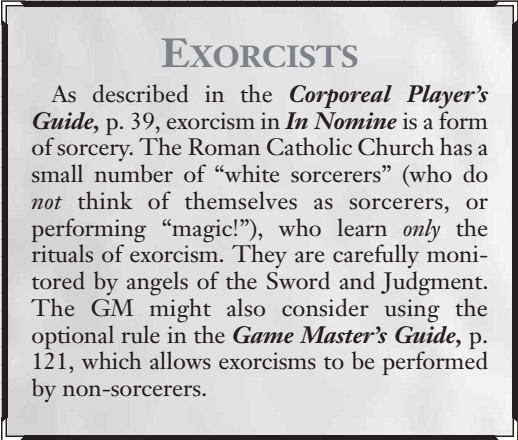
Next time: The Eternal City
Really Good Dumb Sword Jokes Are Hard
Original SA post Superiors 1: Really Good Dumb Sword Jokes Are HardThe Eternal City lies at Heaven's heart, a mix of the new and the ancient. Laurence rules over it, but angels of all Superiors can be found within. It is, after all, a city, home to millions of souls, human and otherwise. It resembles both ancient Rome and modern Tokyo, and Christians within it often call it New Jerusalem, but in truth it's more like the template on which the Earthly Jerusalem was built. Like Jerusalem, it has seven gates, which Laurence has named for the Cardinal Virtues: Faith, Hope, Charity, Fortitude, Justice, Temperance and Prudence. It is surrounded by a wall of semi-precious stone, though no one expects it to be useful if the City is attacked, least of all Laurence. Rather, the walls are symbolic, representing Hewaven's defense against evil, and when Lucifer's armies are finally defeated, they will dissolve into mist.
Roughly analogous to the location of the Temple of Solomon are the Halls of Worship, which dwarf Laurence's halls of state both in importance and size - deliberate on his part, to emphasize the importance of human belief. The Halls are a huge network off cells and corridors made of all kinds of materials. Its exact nature is subjective, relying a lot on the observer and their beliefs, but within the Halls, representatives of every religion and belief gather. Laurence openly expresses his desire that the Church of Rome should one day occupy all of it, of course.
Laurence's own Cathedral, the Church of the Sword, stands near the Halls of Worship, roughly corresponding to the site of the Church of the Holy Sepluchre. It is not subjective at all - it's a Catholic church in design and usage, with an immense cruciform sword behind the altar. It is a sanctuary, which anyone may enter and, once inside, from which they cannot be removed by force without their consent. Only Laurence can expel someone from it, and he will always give them a fair hearing...but he has no mercy for those abusing the blessing of sanctuary for unworthy reasons. Laurence's angels keep their Hearts in a crypt beneath the Church, and below that is a vault containing Laurence's mightiest weapons, in preparation for the final battle. Only Laurence knows what is kept there, and the tw Cherubim guarding the door do not allow sightseers, but rumor holds it's a big, big thing.
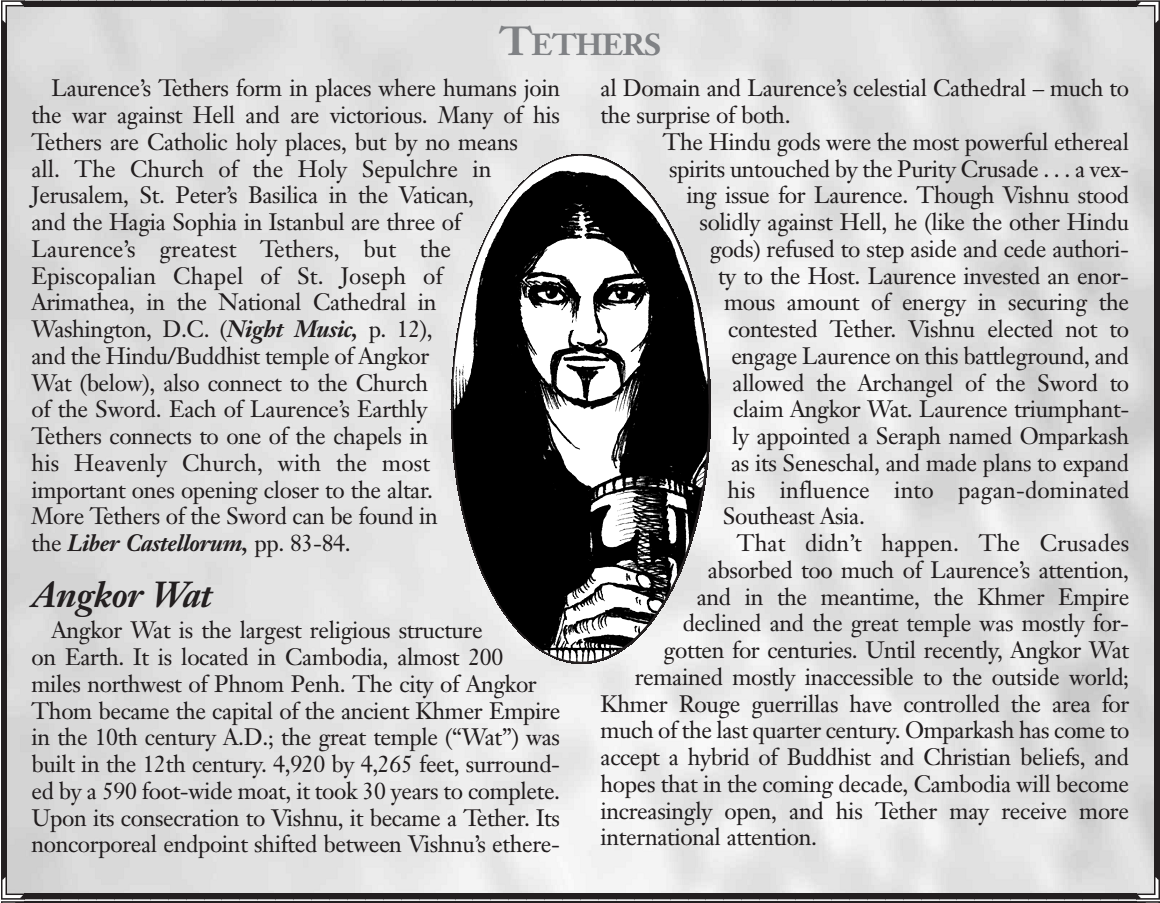
Variations on Laurence are presented, too. Laurence the Boy Scout is a child in the company of adults. He runs the War as if it were a game, with rules everyone must follow, and Hell cheats. He can't cope, and it terrifies the other Archangels. Laurence was appointed by God, and he won't step down, no matter how obviously incompetent he is. Laurence the Paladin embodies the highest ideals of chivalry and is the perfect Arthurian knight. His servitors are modern Lancelots, though no less effective for their strict codes of honor, and even non-Malakim take oaths of chastity, poverty and temperance. They might all carry swords. (Honestly, this is only slightly goofier than normal.) Laurence the Martinet is worse than Dominic about humorlessness, and he can't abide any idea not his own. His angels must obey without question or thought, and there is no room in his ranks for doubt, sympathy for ethereals or non-Catholics. Even one point of dissonance is a mark of shame, and more than that means Outcasting.
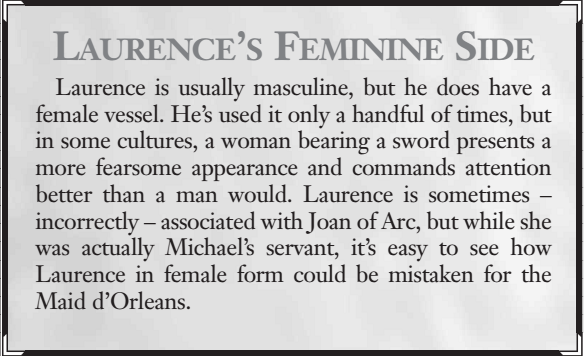
Angels of the Sword strive to live up to Laurence's high standards. They see themselves as role models for other angels and for humans, believing that it isn't enough to just be an angel - they have to be angelic. They have a reputation as goodie-two shoes, but only the youngest and most idealistic could be mistaken for boy scouts. Sure, they love good deeds and moralistic sayings, but the veterans of the Sword wear armor that shines on;y when they've had time to wash away the blood. They're used to taking orders, and they trust their superiors, because they assume no one would be given rank and authority without earning it. It works quite efficiently, but it does discourage individual initiative. Angels of the Sword with no orders and no superior to turn to can function fine, but not as well as they would with clear instructions. In the absence of actual superiors, they tend to stratify themselves in whatever company they keep. They need hierarchies, and the first order of precedence is rank - unranked angels will obey angels with Disticntions from almost any Archangel, if they have no conflicting duties or orders. If there aren't any Distinctions, they'll tend to go by Choir, with Seraphim on top, then Cherubim, and so on.
Because disobedience of his orders is dissonant, Laurence is very careful these days about his orders. When he was new, he was stricter than Dominic and more micromanaging than Jean. It resulted in a lot of dissonance due to narrow instructions, and he's learned that he needs to not give any more direction than necessary and to delegate more specific orders. He makes his intentions clear but leaves the methods to his angels. He would never say, for example, 'take Highway 41 to Tifton, Georgie, find the Tether of DEath south of there and bring me the Seneschal's head.' So much could go wrong there and cause dissonance - the highway might be washed out, there might be better methods of travel, the Tether's location could be wrong or the Word it's to might be wrong, the Seneschal might already be dead or want to Redeem, the Seneschal might only be killable in a way that doesn't involve the head being intact. There's too many chances for dissonance. Instead, Laurence would say, 'there's an infernal Tether near Tifton, Georgie. Shut it down.' He'd also almost certainly give the order to an officer, who'd filter it on down to the angels doing the actual mission, giving them broader latitude.
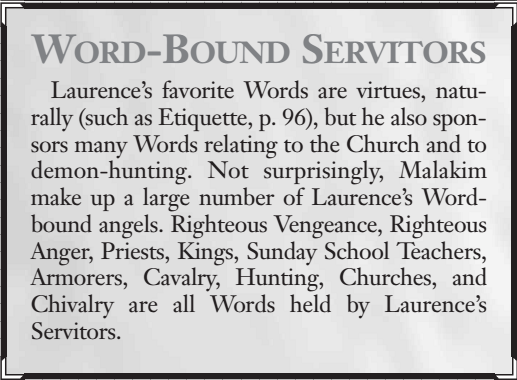
It is still possible for Laurence to accidentally set his servants up for dissonance due to bad information or the unexpected. When this happens, angels can invoke Laurence or use the Celestial Song of Tongues to contact him. If this isn't practical, you're expected to do your best, eat the dissonance if you have to and talk to Laurence later. If it was truly no fault of yours, he will absolve you.
For the first 11 centuries of his leadership, Laurence's army was highly idiosyncratic. Unique Distinctions got handed out and leadership was given to those angels that earned them as needed. By the 10th century, however, Laurence had organized the Holy Orders for use in major campaigns. By the 19th century, they had many rivalries, making coordination hard, and Laurence became concerned that Malphas might be influencing them. Besides, the old feudal model was becoming obsolete. Michael encouraged him to modernize, but Laurence had already been planning a reorg anyway. The result was the New Order. The old Orders were not abolished, but all Distinctions awarded for them were retired. Angels of the Sword would now follow a chain of command independent of Order, with military ranks. They could serve in an Order, still, but promotions would be based on doncut regardless of whether it was in service to an Order or not, and they must still obey higher ranks regardless of affiliation. In practice, things haven't changed too much. Angels of the Sword still do individual quests unless gathered for a specific mission by an officer. There's no standing units in the army, after all. Despite this, all of them report to at least one ranking superior, who is responsible for knowing where they are and what they're doing. Because angels of the Sword are disciplined and obedient, it works quite well, giving them suprising flexibility and autonomy. At any time, Laurence need only say the word and a thousand independent questors will be summoned to gather as a unit. Honestly, Laurence's organization of the entire War is similar. He has no direct authority over the other Archangels - it's just his job to determine grand strategy and make plans. It's up to each Archangel to interpret their part in Laurence's plan and act on it. Of course, it's to the benefit of all to act in organized fashion, so there isn't much dissent - just a lot of creative additions to protect various Words.
Warrior angels have been forming groups dedicated to specific causes since long before Laurence's ascension, but it was never so formal under Uriel. Laurence encouraged it, hoping that raditions of honor, dedication and chivalry would spread in the Host and humanity. Every Order must be approved by Laurence,a nd gathering a dedicated group and earning his approval is a quest in itself. The leader of an Order must be Master-ranked at least, and most are Majors or Colonels. These Orders are not always restricted to angels of the Sword and a few even have human members, but membership in some requires Sword attunements, and each implictly gives fealty to Laurence, so most Archangels do not permit their angels to join. At one time, each Order had its own Distinctions between Master and Grand Master, but with the New Order that's no longer used, though angels with these titles may still use them formally. Even in Laurence's ranks, not everyone belongs to an Order. No special privileges come with it, and no one with dissonance or Discord can join one. Dissonant members are given the same chance as any to fix the problem, but those who dishonor their oaths are expelled and amde infamous and shamed among the Sword, some so much they seek service elsewhere. These Holy Orders are most popular among Cherubim and Malakim (for whom the membership oaths count as Oaths).
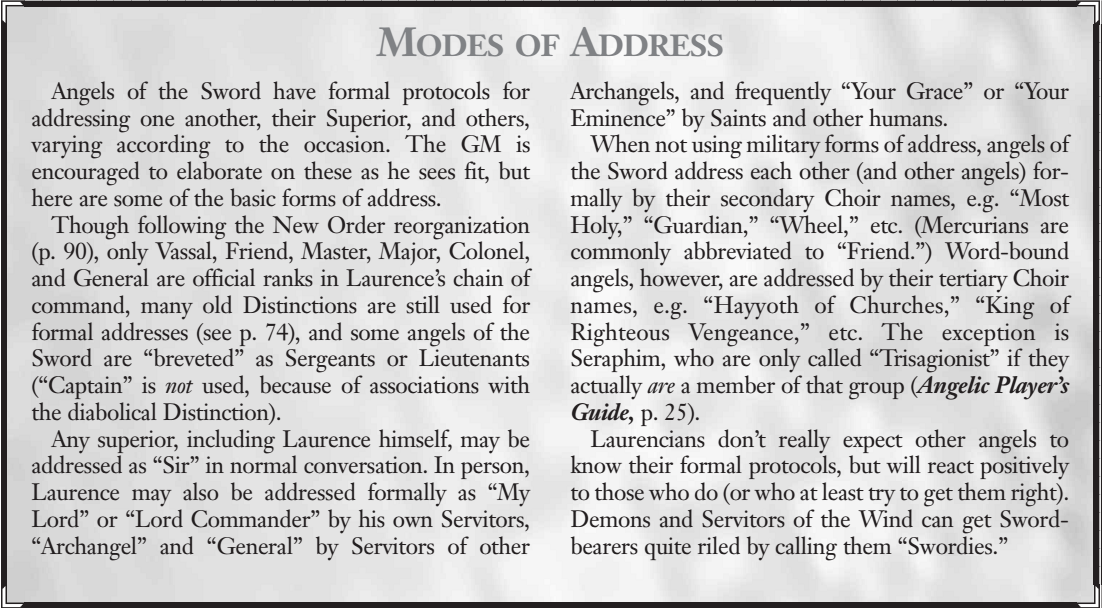
The Order of the Holy Cross is explicitly devoted to defending the Catholic Church. It was formed before the split in 1054, and the entire split was heartwrenching for them. When it appeared that the Order would become divided as well, Laurence stepped in and dictated that where the two Churches differ, the Church of Rome would be supported. However, many members still work among the Orthodox, defending them and hoping for reunification even now. In addition to the Nicene Creed, members of the Holy Cross must swear: I will defend and uphold the Holy Catholic Church, and place the well-being of the Church and its memebrs above my own, second only to my dedication to the Sword. Anyone, even humans, may join. The Grand Master is a Malakite General named Paul, who spends much of his time in Rome, directing the angels and Soldiers that work in the Church.
The Guardians of the Marches are an elite cadre, mostly Malakim, who serve as border guards between the Marches and Earth. They keep the surviving pagan spirits mostly out of human dreams, though some of them have come to deeply sympathize with the pagan spirits over the centuries. They'd never shirk their duty or their oaths, but have concluded that the pagans might have some place in the Divine Plan. Many of them see these spirits can be very different from demons, and doubt that their oath not to suffer an evil to live applies to them. The oath they take is this: I will not permit any ethereal spirit to invade a mortal dreamscape or the corporeal realm, nor fail to eject those I discover, if it is my choice. Most of the Guardians were former servants of Uriel from the Purification Crusade, and rumor has it that their Grand Master, the Malakite Tahariel (who prefers his older title of High Commander and March Warden) hopes to gain the Word of Purity himself and begin the Crusade anew. This will not happen if Laurence has any say. Tahariel is a hardliner on the guard duty and does not appreciate those who show leniency with ethereals. Blandine offers her Dream Walking attunement to all of the Guardians, but she has warned both Laurence and Tahariel that she will revoke it if the Guardians become overzealous and threaten her Word. The Guardians work mostly in the Marches, but can and will go to Earth to pursue spirits. In the Marches, they are firm but not ruthless, ejecting ethereals but not killing unless they prove dangerous fighters or show emonic sympathies.
The Order of the Sacred Heart serve as ceelstial medics, and most are Christian. They minister to their fellow angels and to Soldiers and others involved in the War. They must know the Songs of Healing, and many know other protective Songs as well. quite a few have the Purity of Purpose, Holy Fortitude and Divine Absolution attunements. While there are several Mercurians in their ranks, the Order are not pacifists and will happily face demons in battle. Besides healing, they also offer counseling and advice on removal of dissonance, sometimes even assisting Outcasts. Laurence and Dominic permit them to offer sanctuary due to the oath they take: I will offer such aid, healing and sanctuary as does not conflict with my duties to the Sword to all servants of Heaven in need, and to the truly repentant, and turn over anyone in need of more assistance than I can give to a higher authority. The Order accepts Saints, and its current Grand Master is a bodhisattva who runs it from Heaven, but it doesn't like to permit living mortals to join, as the work is dangerous and a mortal healer is likely to be put in grave danger.
The Order of the Eternal Sword is Laurence's most feared Holy Order, and all members must have the Hunt attunement. All are fierce fighters, mostly Cherubim, Ofanim and Malakim. The Grand Master is Colonel Peliel, Malakite of Righteous Vengeance. The Order singles out demons (and, rarely, humans or ethereals) to be killed with extreme prejudice. They will hunt the same demon, over and over, killing as many vessels as it takes until they get a chance to soul-kill. Their oath is: I will not rest until my chosen target is permenantly destroyed, nor will I devote myself to any other activity but its destruction, except for those dictated by my duties to the Sword. SOP is for two members to perform the initial pursuit, contact the tarrget and attune themselves to the prey. One then retreats to Heaven. The one that stayed behind will hunt the target to the death. Should they arrive back at their Heart in Trauma or should their Heart shatter, the second immediately takes over the pursuit, along with a partner to act as their second at least until the first hunter exits Trauma. In this way, a demon marked for death will always have an angel in pursuit. Being targeted by the Eternal Sword is a terrifying prospect for a demon, and it's said that even Hell is not far enough to run. Other demons will avoid the target for fear of becoming targets themselves. Angels of the Eternal Sword know their reputation and value it, so they don't choose targets casually. They study their potential targets, choosingly only those of exceptional evil or those who have done great harm to Laurence's Word or the Catholic Church. It is claimed that they have never failed to eliminated a target, eventually, and rumor has it that Laurence himself has taken up the hunt before to maintain that record.
Next time: Choirs of the Sword
It's Okay, Though, Laurentines Don't Get Sword Jokes Anyway
Original SA post Superiors 1: It's Okay, Though, Laurentines Don't Get Sword Jokes AnywaySeraphim of the Sword are regal creatures, conducting themselves as knights. Most carry swords, if only ceremonially, and they see it as their job to ensure no other angels of the Sword slack in the virtue. They aren't shy about lectures, and many like to grab the Purity of Purpose attunement. Unsurprisingly, they can annoy other angels, but do try exceptionally hard to live up to their own standards, and mostly they succeed. They are often officers, and while some are active in the field and all at least get rotated to the front lines to keep them from seeing the War in the abstract only, they often operate on a strategic level.
Cherubim are common in the Sword, and they're usually NCOs. They get experience leading small groups and are often squires to the Seraphim knights. They have a reputation for being big, tough and dumb. They aren't usually too dumb, but with their ability to attune on sight and their faith in their superiors, they don't often feel a need for high Ethereal Forces, focusing instead on strength and endurance.
Ofanim of the Sword are wandering knights, questing on Earth and seeking missions of vengeance and redemption. While Laurence's Malakim have a fiercer reputation, the Ofanim are often the most skilled fighters. They like the Hunt attunemnt and can be just as relentless and violent as any when facing demons. They often serve as scouts, snipers, spies and solo operatives, as they're at their best with relative independence. Sometimes this can frustrate Laurence and his angels, but none question the loyalty or skill of the Ofanim.
Elohim of the Sword are fairly rare, as Laurence encourages a subjective worldview in the form of Catholicism, which can be hard on them. Those that join him are most comfortable with firm orders, because obeying can never cause them dissonance. They often serve as lieutenants, advisors and spies for the Seraphim. In the field, they are excellent interrogators, with no compunction against torturing the evil. A few of them become solo questers, most often against pagan or demonic cults, which they're good at tracking down.
Malakim of the Sword are common, more common than any other Choir. They are surprisingly versatile - some are crusading knights or vigilantes, but others are foot soldiers or officers. Their methods range from the traditional to teaching humanity morals. All of them, though, are fanatics in purging evil. They also serve as Laurence's internal police and guardians against Church corruption. With their resonance and attunement, they're very good at sniffing out corruption, and demons fear them for good reason.
Kyriotates of the Sword have the most human contact of any of the Sword angels, as they all live a human life in addition to their celestial one. They manage much of the Sword support network, and frequently they have access to armories, churches or records departments. They are tireless hunters with strong roots in their communities, and they look to team up with other angels to hunt down demons. With GM permission, if their host-vessel dies in combat and another suitable human dies in the same fight, they may be permitted to replace their old host with the new onw free, rather than for the 5 point replacement cost.
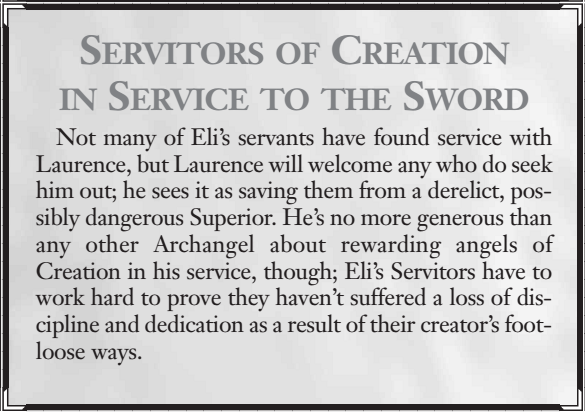
Mercurians of the Sword are not noncombatants, most of the time. Sure, they can't hurt humans, even Hellsworn...but htey're often skilled snipers or carry summonable relics just in case they run into a demon. When not fighting demons, they work as teachers and morale officers, to prepare humanity for its role in the War. There aren't many of them at high rank in Laurence's armies, though.
Laurence spends a lot of time working with Saints and Soldiers, too. He likes to talk to the Saints in the Groves who are between incarnations, to learn more about their human perspective. Theoretically, all Soldiers of God and Saints are under his jurisdiction, and he's meant to be informed of all human resources and have the right commandeer them. He won't usually call on someone else's human servants without need, but more out of respect for the human's loyalties than propriety. Some Soldiers exist without his knowledge, which annoys him, but he accepts that some Archangels just don't cooperate. Soldiers who are known to him can, if they can somehow contact him, ask for Servitor Attunements of the Sword as well as those of their patron, as can any Saint. Laurence is also one of the few Archangels to give Distinctions to humans. A few Soldiers have reached Master rank, though Laurence will not give them higher Distinctions while they still live. At least one Saint has made Colonel, however.
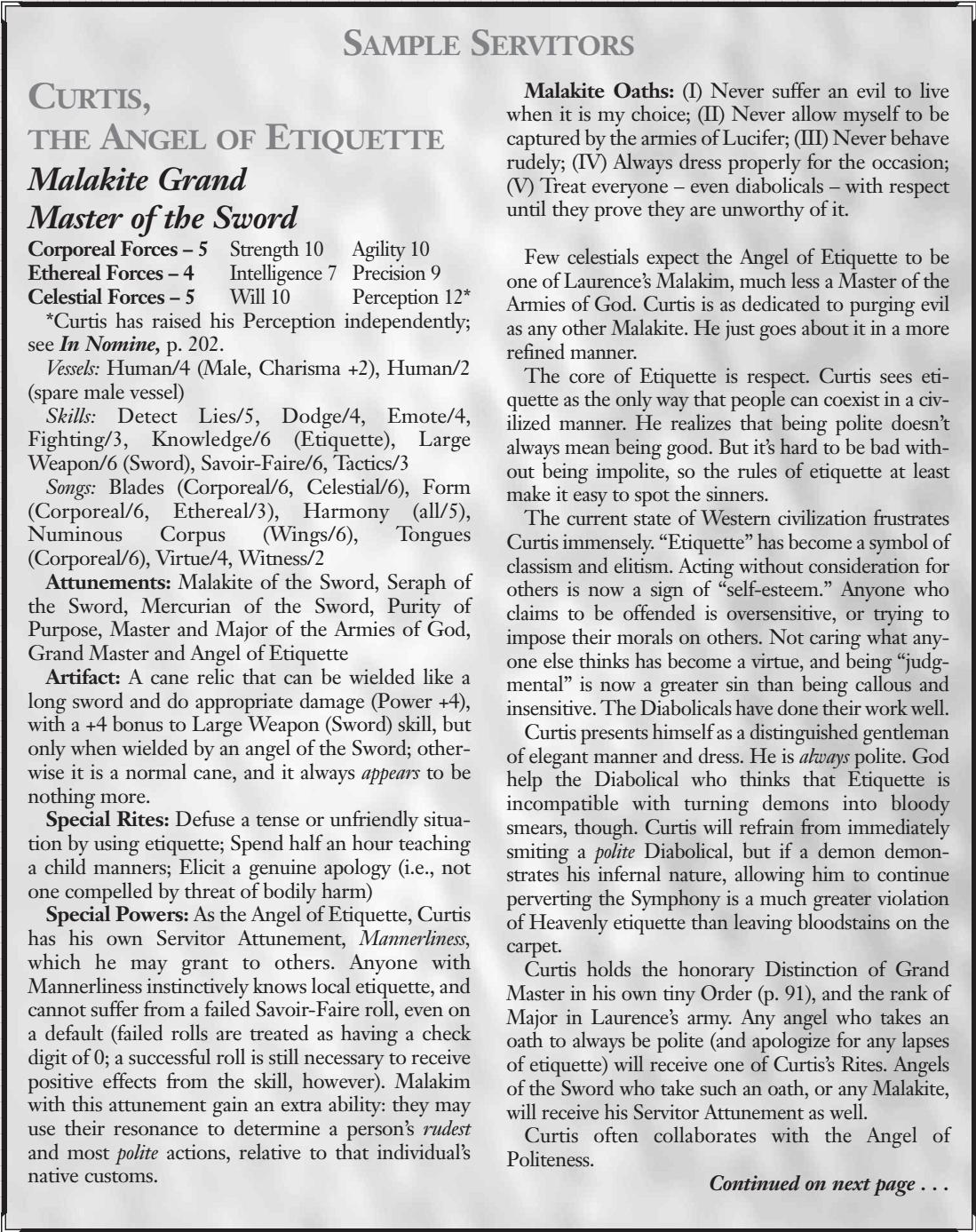
Laurence doesn't have many Redemption candidates, but he's had his fair share. They tend to believe that if they're going to change sides, they might as well go straight to the top, and often the most zealous converts become the best demon-hunters. Laurence likes Redemption, and the truly repentant will find him as loyal to them as they are to him. For those who have the slightest doubt, however, he is the wrong choice. He's exceptionally thorough, and a former demon will emerge either perfectly pure or not at all.
Angels of the Sword trained thoroughly well before they're ever let out of Heaven. Most start as relievers, often known as pages, fledged with great ceremony. Likeswise, the first Earth mission usually gets a dedication ceremony. The Sword likes ceremony. Most training takes place in the Groves with Michael's troops, and any angel of the Sword with no fencing skills will be roundly mocked. Those that work among humans also train with Saints to learn human ways and traditions. Catholic theology, while optional, is encouraged. Laurence also encourages his angels to spend time among the Redeemed in his service, to learn about the demonic mind. When an angel of the Sword leaves Heaven, they may be idealistic, but will not be ignorant or unready.
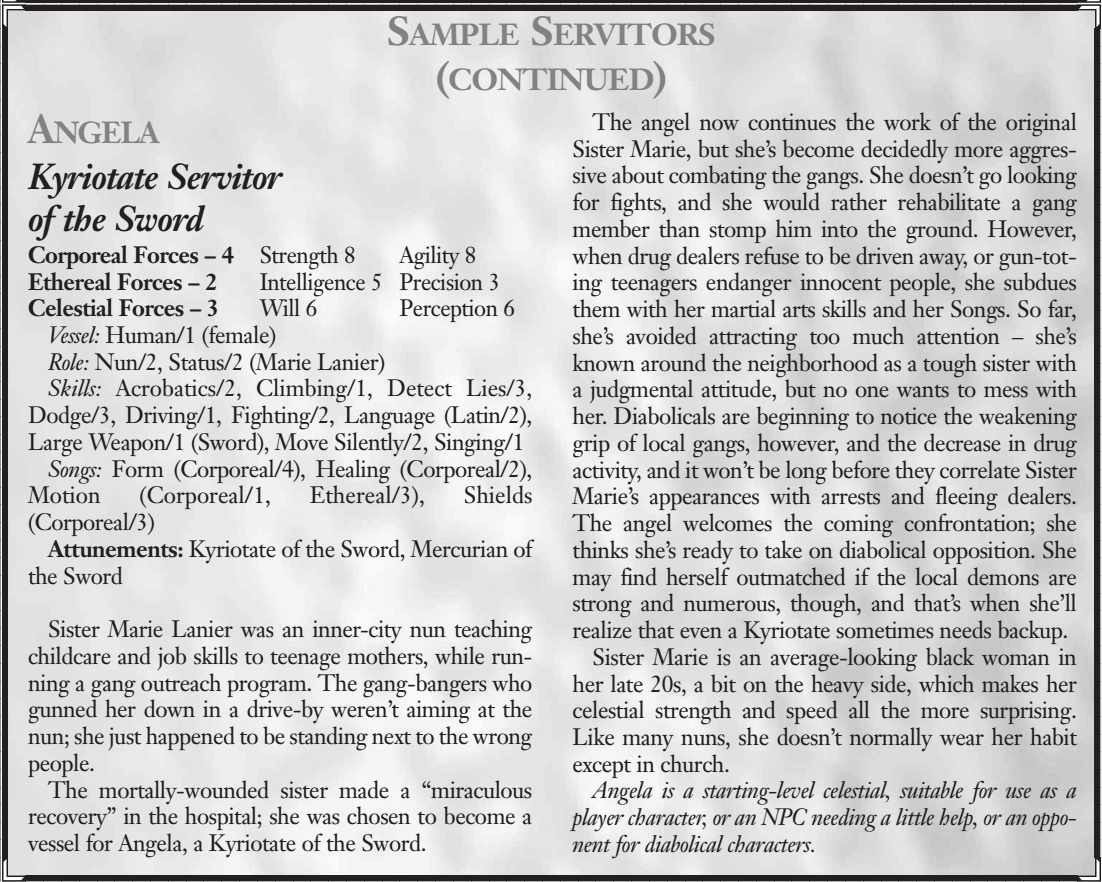
Angels of the Sword don't spend a ton of time in Heaven, for the most part. They only have three real jobs there. They plan the War, they train and they do ceremonies. Only the highest ranks help in planning. Training is everyone's job, though, and they can find trainers in the Eternal City or the Groves. Those willing and able to teach are sometimes assigned to train others. And, make no mistake, the Sword has a lot of ceremonies. Ceremonies for basically everything. They do love their tradition, though other angels tend to find it a bit of a waste of time. Being asked to serve in a ceremony is great honor, though, and no sensible angel is going to refuse it.
Most of Laurence's work in the Ethereal is handled by the Guardians. Besides them, though, there are some pagan-hunter angels who are trained to detect ethereal influence on Earth and track it back to the source. Some even quest to hunt down and kill spirits or find the Domain they're coming from. If an angel of the Sword finds an infernal threat in the ethereal, they are to report it up the chain so either one of Laurence's ethereal trackers can be sent or Blandine can be notified.
On Earth is where most of the Sword's work is done. First and foremost, the Sword hunts demons. When other angels find a demonic plan that needs to get shut down, they often call Laurence's hunters. The Sword is the Host's backbone, responsible for maintaining a visible presence against evil. There are four main jobs they do on Earth. First is garrison duty, which isn't too boring, really - it could be Tether defense or it could mean being the only angel in a town, responsible for stopping any demonic influence there. Laurence expects proactive defense to keep Heaven's territory secure, and most of his angels will feel obligated to cease their hunt or quest to help when asked. Refusing to lend aid to any angel, even Creationers or Flowers, will be punished severely if it means losing ground. Second, hunting. When not defending Heaven's assets, Sword angels should be hunting - literally or metaphorically against demonic operations, or seeking information. Demons outnumber angels, so it shouldn't be hard to find a demonic threat.
Third on the list is recruitment. Angels of the Sword are instructed to always be on the lookout for worthy humans and potential Soldiers - but anyone that can serve Heaven is good. Not all do so knowingly, as angels of Laurence run charity groups, recruitment drives for public service and work for the Catholics, all to lead humans to Heaven and undermine Hell. Finally, angels of Laurence are responsible for training Soldiers and developing human assets. They run training camps, and Soldiers make up much of their support network. Laurence likes to see every Soldier get to know at least one angel personally, and many of their operations receive Catholic support.
Next time: Questing
Testing Your Sword
Original SA post Superiors 1: Testing Your Sword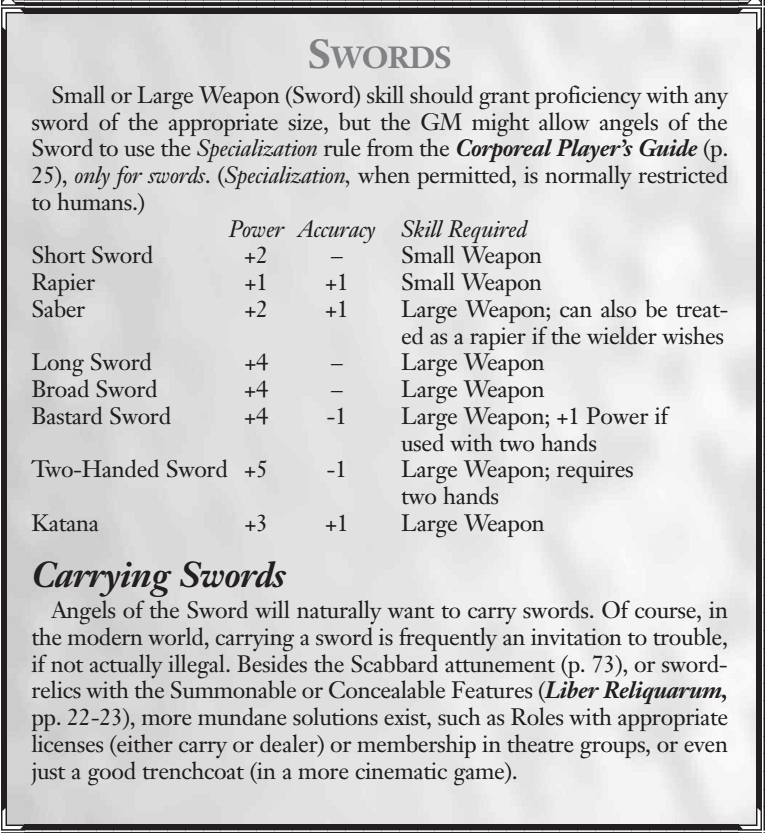
It is traditional among Laurentines to believe that you are not truly an angel of the Sword until you have gone on a quest. Laurence sees quests as a means to refine yourself in God's service or realign yourself with His will if you have fallen prey to corrupting influences. A quest is anything that serves cause of Heaven which is difficult yet attainable and has a concrete indication of success. Most commonly, angels quest to bring back the head of a named demon. Others include ending a cult, recovering a relic, building a new church and congregation or learning a secret Song previously unknown to the Sword. Most formal quests are consecreted with ceremony, but all that is truly required is the permission of an immediate superior. Quests are always acceptable activities for the Sword and petitions are usually approved unless you're already doing something critical. It is expected that you will not return from your quest until you succeed, and failure is a mark of shame that can only be removed with a new, more difficult quest. Particularly difficult quests, such as soul-killing a Baron of Hell, recovering one of Laurence's Swords from a Prince or destryoing an infernal tether will earn reputation and even Distinctions, but quests should be undertaken for the glory of Heaven, not the glory of you. Laurence sometimes permits quests as a means of shedding dissonance or Discord, and angels with the Divine Absolution attunement may assign a quest as a condition of absolution. Angels may be charged with quest based on their abilities and the seriousness of their sin, and the quest must be consecrated by the Song of Witness. If the quest is done, the dishonor is removed. If not, they usually don't return.
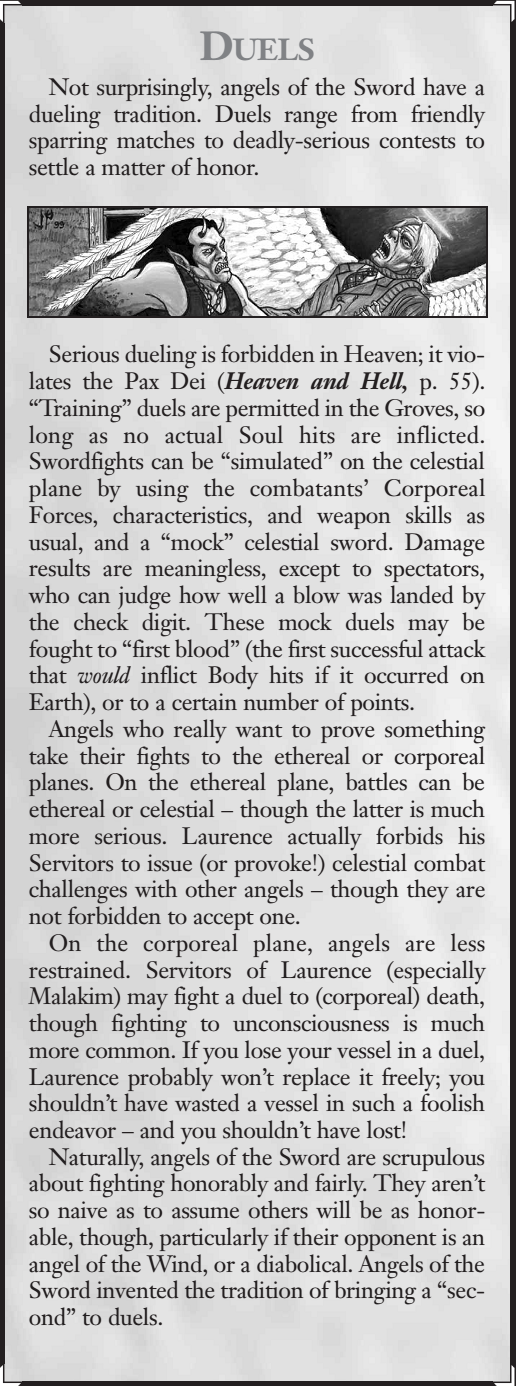
Laurence rewards angels after missions based on what was lost or gained by Heaven. Any mission in which Hell made a net gain is unsuccessful, and any mission in which there was no significant gain on either side is only a mild success. A very successful mission is one in which Hell suffers a defeat, even a mild one, and it's clear tha the Sword made it happen. Extremely succesful missions must change at least the local landscape of the War, such as destroying a Tether, soul-killing a potent demon, or otherwise improving the standing of the SWord in an important area. A spectuacularly successful mission is one that significantly impacts the War - weakening a Prince, establishing a new Tether to the Sword, securing a city for Heaven and so on.
Laurence's angels are so conscious of their honor that any punishment is so shameful that the humiliation alone will keep them from repeating the sin. Most of them consider the worst punishment possible to be a public lecture by Laurence. Thus, while Laurence is known as rigid and strict, his punishments are rarely very severe unless he believes you're in danger of Falling or not learning from your mistakes. In that case, he is merciless. Besides scolding, minor sins usually result in uinpleasant or boring jobs for weeks or years, depending on serverity. Alternatively, you may be assigned a quest to redeem yourself. Sometimes, Laurence will assign dissonance before sending you on a short quest to remove that dissonance. Longer quests may be accompanied by Discord, such as blindness, Stigmata or even Vulnerability. He sometimes imposes Aura or Bound, but never Celestial Discords. Serious crimes get more serious punishments, beginning with remove of privilages such as artifacts, servants or vessels, or even attunes or rank. Laurence never removes Forces, which he considers to be senseless maiming of an angel. Actual betrayal is punished by Outcasting or death, depending on if Laurence thinks you can be redeemed and how much damage he thinks you could do if you Fell.
Angels of the Sword are highly conscientous about maintaining 'proper' relations with each other, other angels and humans. Impropriety is strictly frowned on. This doesn't mean they can't be friends, but most of their friends will be other Laurentines. They tend to segregate by rank and Choir, not out of regulation, but because that just tends to be who they feel closest to. Exceptions tend to be the result of shared Earthly service.Too much fraternization outside your rank can raise eyebrows - camaraderie's encouraged, but it's dangerous to get too close to someone you order around or someone who orders you around. Friendships can be casual or intimate, and Laurentines do fall in love, but duty must always come first, and Laurence tries to separate those who seem to be getting too close. Many Laurentines prefer to stay casual, though that can still involve sex, or even avoid romance altogether. There is no official position on angelic chastity, and there are rumors that Laurence has taken lovers, but many of his angels prefer to be chaste. Relations with humans are more striclty monitored. Angels of the Sword try not to disillusion humans about the divinity of angels, after all. That means a certain aloofness. They can be friendly ,even fond, but becoming too partial is discouraged, and Laurence forbids sex with mortals. He disapproves of sex with Saints but realizes he can't control that. Don't expect to get promoted if you do it, though.
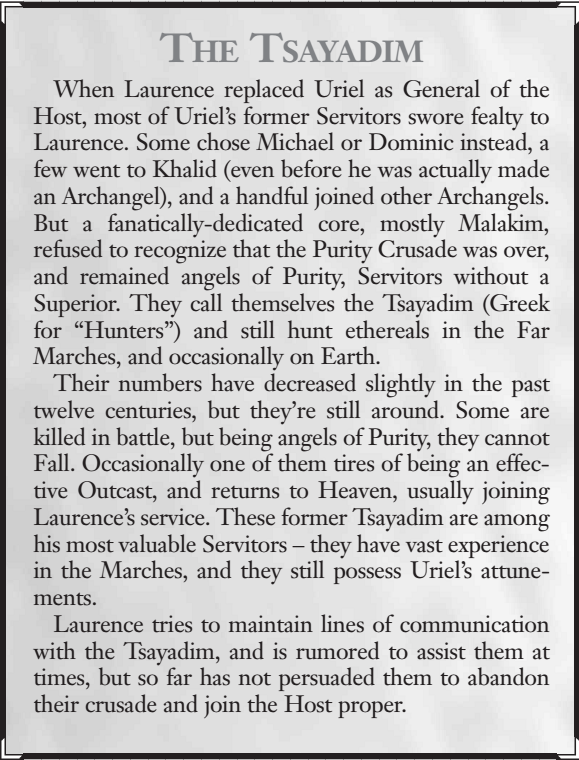
Laurence doesn't discourage friendships with other Words, except Flowers. (It's not forbidden, but he doesn't approve.) Other angels, however, tend to find the Sword hard to approach. Stone and War get along best, and there's often a strong element of competition with War angels. Judgment and the Sword often work closely and respect each other, but true affection is rare. (Laurentines are instructed to cooperate with Judgment as much as possible, even in investigations of their own, and in return Judgment tends to turn over wayward Sword angels to Laurence.) Few other angels make much of an effort to befriend Laurentines - even if they're the first to be called in for help. The angels of the Sword accept this with grace - it's just one of their burdens.
Next time: the Firstborn
War - What Is It Good For
Original SA post Superiors 1: War - What Is It Good For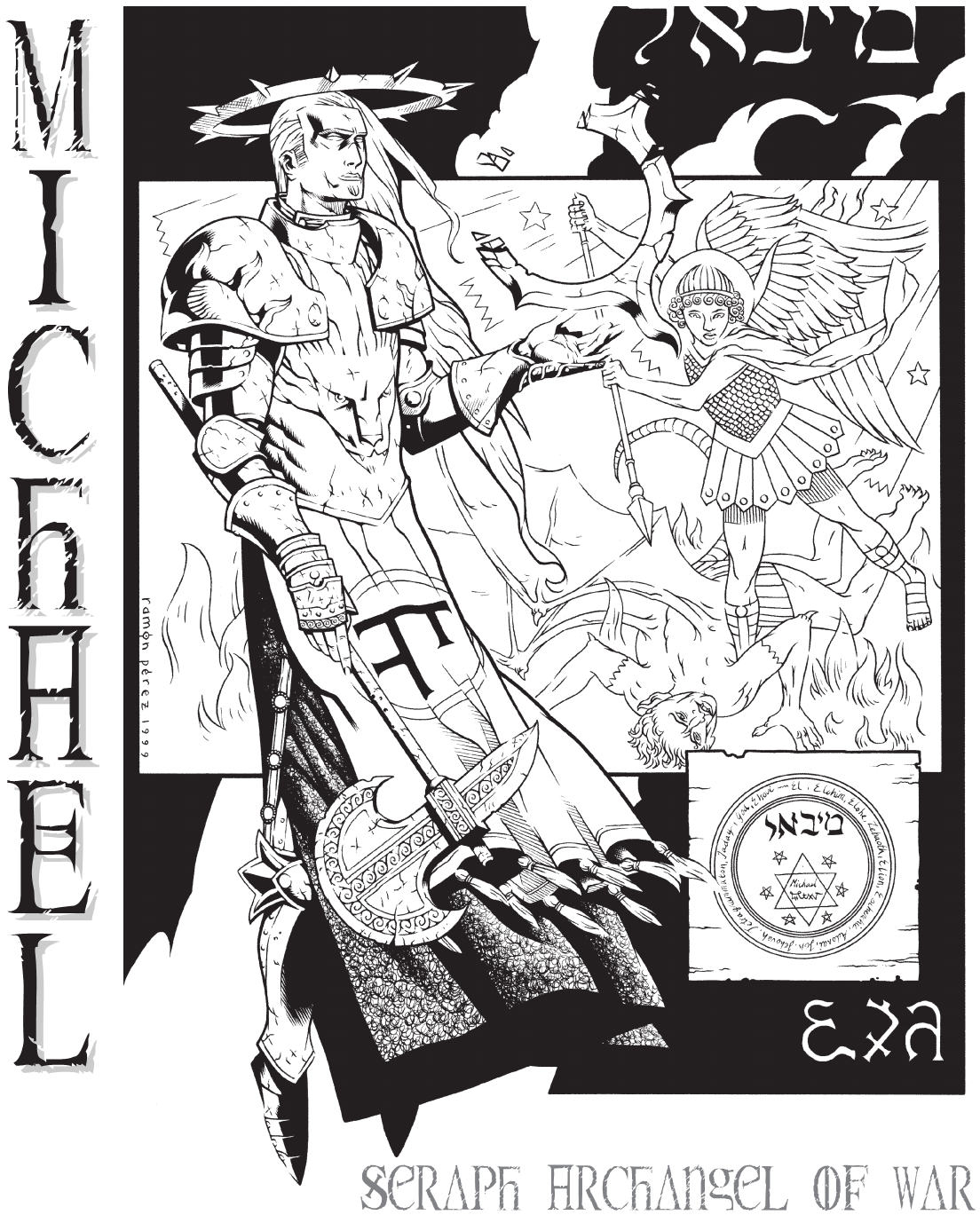
Michael is the axe-wielding Firstborn, the eldest of angels, created by God before any being but Yves. He is the most potent of angels, and he defeated Lucifer in combat and personally hurled him into Hell.
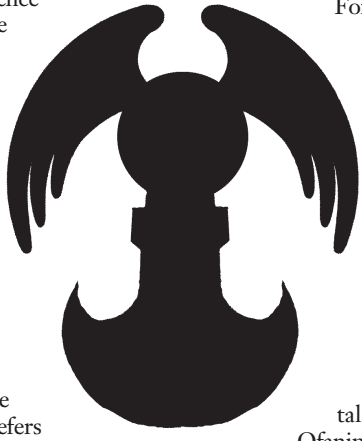
Michael's symbol.
Bright Lilim of War can, with eye contact, make a Perception roll and detect someone's greatest weakness in combat. (CD) is either a bonus to the Lilim's attack or a penalty to the subject's Dodge, at the player's choice. This can be used equally for combat training and actual combat.
One to One is a Servitor attunement that works when in single combat. When attacking a single foe continuously in hand-to-hand combat, you get +1 Power each round, cumulatively, with a cap of (Corporeal Forces). This lasts only while you face the same foe, hand to hand, without stopping for even one round.
Blood Oath is a Servitor attunement allowing you to swear up to (Ethereal Forces) blood oaths. Each must be agained a named enemy you've faced in battle. Should you fight them again afterward, you get +2 to the CD of all attacks against them, but -2 to the CD of attacks against anyone else while they're present, due to distraction. The Oath is taken while shedding blood and can only be dissolved by the vessel-death or soul-death of the enemy. If two Oathed foes are present at once, you take no penalty for ignoring one to attack the other.
Sure-Footed is a Servitor attunement ensuring you never lose your footing or balance. If you are somehow physically thrown, you land on your feet. If the fall is too great for that, you subtract (Corporeal Forces) from the fall damage.
Michael can teach a number of secret Songs, including the Songs of War, Battle and Blades, and possibly the Songs of Creation and Life.
All of Michael's higher distinctions are granted individually to those who have either done great deeds in Heaven's name or been constant in skill and service. There is no strict hierarchy, however. These distinctions have general titles like Hero or Champion, individualized for the event that got them given out - the Champion of the Thera Crater, for example, or the Hero and Slayer of the Worm of Saminga.
Expanded Rites:
1. Conquer in a struggle of some sort, like an argument, sports or a battle, that lasts at least 6 hours.
2. Succesfully defend an outpost.
3. Tutor a pupil or pupils in combat for 3 hours.
Common War Malakim Oaths:
1. Never leave a comrade behind in danger.
2. Always offer an honorable foe a fighting chance.
3. Never leave resources in the hands of the enemy.
4. Protect other soldiers.
5. Protect all civilians.
6. Set an example of courage to others.
7. Share my experiences with others so that they may learn from them.
8. Inspire others with a story of heroism every day.
9. Always keep my weapons in good condition.
10. Tutor someone in fighting or strategy every day.
11. Never refuse an appeal for help from an innocent.
12. Never refuse a call to battle from another angel.
13. Never refuse an honorable challenge to a fight.
14. Never refuse a challenge to a fight.
Michael was the first made of the angels, eldest of all but Yves. From the start, he competed with the others, for while all served God, his was the essence of challenge. From the Fall to this day, he has been War. When the universe was made, Michael was there, helping Lucifer, Baal, Eli, David, Gabriel and Uriel make it to God's liking. He and Baal stirred the matter of creation, and Michael has always been pride that he was the first of the angels, strong and brave, though he's rarely realized others might be bothered by it. Lucifer and Baal were his trusted brothers, though inferior in strength or skill, and Michael was so secure in his knowledge of God that Lucifer never even tried to tempt him. He never saw the Fall coming, and it shocked him to his core. He has never once considered that his side might have been wrong - he knows Truth, after all. He rose to the challenge with all his strength, defeating Lucifer in the moment of the Fall and hurling him into darkness. It was a hand-to-hand fight, and the deed that earned him the title of Archangel of War, the Champion of Heaven.
The demons encamped themselves in Hell, and Michael and his angels went to face them. Sympathetic to humanity, he strengthened them by action and inspiration. In popular culture, he founded the epic of the heroic figure - Gilgamesh, Horatius, Odysseus, Roland. The heroes fought darkness and won - and the winning was important. Winning matters more to Michael than honor. When you fight for God, the ends justify the means. By arms or by wits, War must win or die.
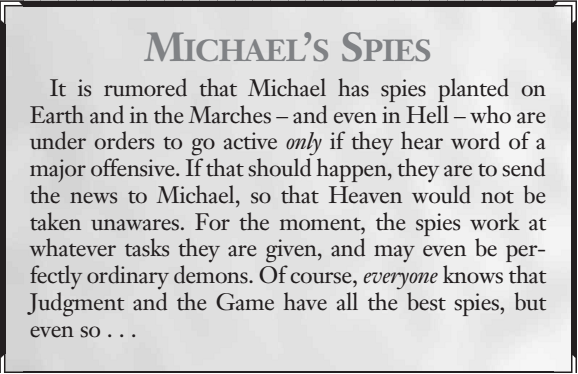
Millenia ago, Michael found himself placed on trial on charges of vainglory and pride, of encouraging heathenish cults and traditions and fighting for his own glory before Heaven's. Michael claimed that first, he had reason for pride, as he fought for his victories, and second, that pride and glory inspired fighters, both mortal and angelic, and thirdly, it was none of Dominic's concern and Dominic had no right to presecute him. Dominic found Michael guilty, though God pardoned him for his ceaseless efforts in Heaven's cause. Michael was disgusted by what he saw as a power play, and he stepped down as Commander of the Ghost, letting Uriel take the position. However, he saw the Purity Crusade as wasteful, energy better spent facing actual foes rather than creatures that were no threat. Perhaps it was honorable, or perhaps just a gambit to unite Heaven, but it was a fool's errand. Michael believes that it is better tha Uriel was removed, as Laurence at least realizes that demons are the true foe.
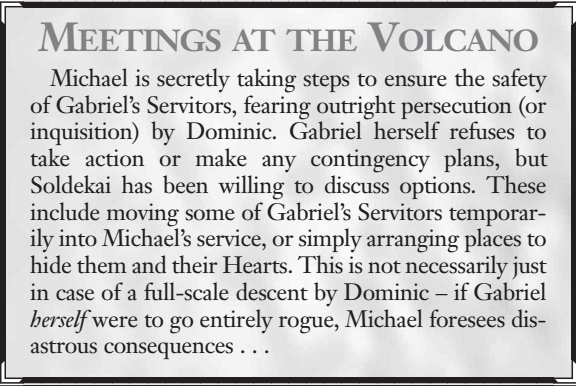
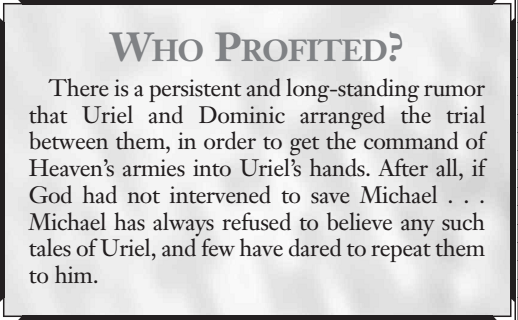
Michael has returned to bsuiness of War, continuing to foster the cult of Hero and Champion and favoring young warriors who face the darkness. After the foundation of Islam, Michael saw the persecution of Gabriel as unjust, and while his views were based largely on his dislike of Dominic, he also saw danger in driving away one of the most potent and violent Archangels, who was also one of his oldest comrades. He and Yves for once found common cause in defending Gabriel, but it was too late to prevent her self-exile. In recent years, Michael is very concerned with Gabriel's instability, and he worries that she may Fall before the coming of the Apocalypse. If that happened, much as it would pain him, he would face her in battle, as he beleives a sane Gabriel would have wanted.
Michael has pioneered the use of practical techniques - military intelligence, planted agents, division of the enemy, gathering neutral allies and hostage negotiation. After all, he does what wins. His manner of combat has often differed from Laurence, but he hasn't let it cramp his style. With the rise of the media in the 20th century, Michael has even overcome his natural Seraphic distrust of fiction to promote his Word and the ideal of the Champion, which he pioneered in pulp magazines and superhero media. Humans could, he saw, be inspired to fight for goodness.
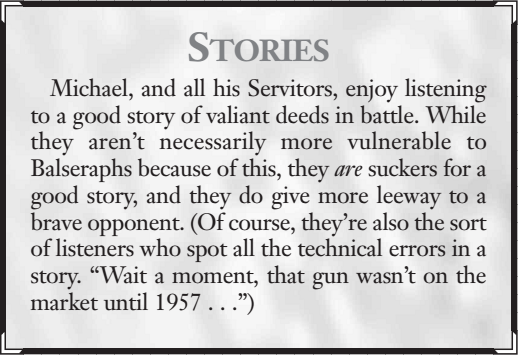
Michael divides the universe into three categories: those who are inferior to him and should pay attention to him if they know what's good for them, those who are his equals, such as Baal, and those who are his superior: God, and that's it. Accepting Laurence's direction is not the same as considering him a superior. Subordinates face Michael as gruff but honest, assuming they've been brave and fought with good intention. Those who have not will be interrogated and whipped back into shape. He may protect his own from Judgment, but he expects them be responsible to him. Michael is one of the Archangels who truly is free of fear. He has beaten Lucifer before, after all. If Heaven loses, it won't be his fault. He'd be happy to help any other Archangels get rid of their qualms, too. For a while now, he's been suspicious of Yves, the oldest of beings, who knows much but says and does little. It may be that Yves is closer to God than any other, but he still refrains from advocating direct action, claiming to protect the Symphony's Destiny and allying with Dominic, forcing Gabriel into the path that led her to exile. Michael does not understand or trust Yves.
Michael's Word encompasses struggle, strife and battle. All of life is a struggle with others, as competition is the only way to establish your truth. Truth matters to Michael, as a Seraph. He proves his Truth on the bodies of his foes, fighting as proof of it. He encourages humans to grow and excel by strife. He never backs down from an argument with other Archangels for this reason - if their position is True, they'll win. If he wins, clearly his position is correct and True. If they should win, then their position evidently held merit he had not previously realized. The only being against whom he will never fight is God. This doesn't really make him comfortable to deal with, though. He's prickly, takes insult easily and is exceptionally proud. He's protective of his angels, but he expects them to give him their best. His Word also covers the peace that comes after war and the negotiation of treaties after fighting, to ensure that matters are arranged by honor and justice after one side wins. He shares this with Marc, and the two often work closely in that arena. Michael's Word also includes war to depose tyranny - war as a force of natural justice. In the past he once worked with Dominic in this aspect, but in the last few millenia they have grown apart, and Baal has taken advantage of this to strengthen war is a thing of pure violence, without justice.
Next time: Michael and other people.
War Never Changes
Original SA post Superiors 1: War Never ChangesMichael knows that God exists, created him and made the universe. God is right, Lucifer is wrong, and that's all there is to it. If Michael doesn't understand God's plans...well, he doesn't have to. He just needs faith. Michael resents being forced into politics, but will take any strategic action required to support his Word and keep Heaven on a professional footing rather than wasting time debating matters like Peace or Heresy. Fortunately, he can usually count on the warlike Archangels without need for long discussion, as he's rather impatient.
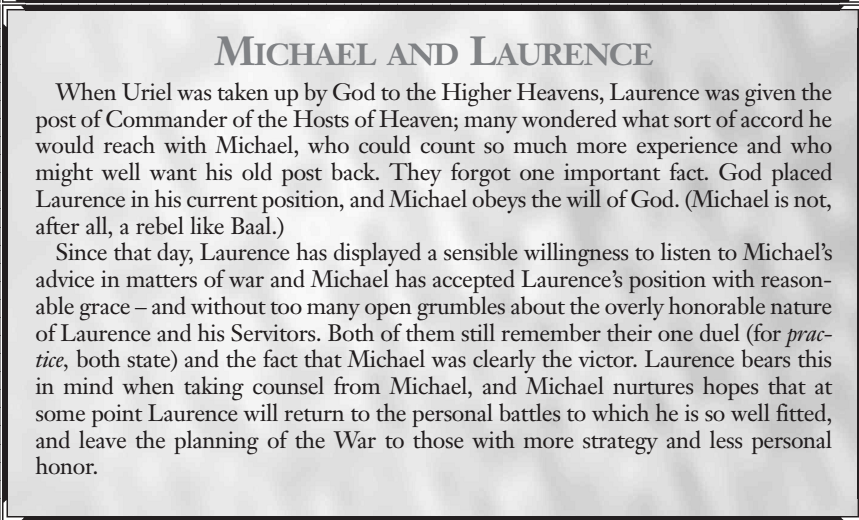
Superior Opinions posted:
Blandine: So many humans dream about a warrior or champion to protect them. This is Michael's role, and I must admit he serves it well, though he often acts in a more brutal manner than I find appropriate.
Is it really a good idea to quell the fears of mankind in a world of false imagery? How does that prepare them? I often wonder if Nightmares aren't better for our case; I'd like to see Blandine take the initiative to control the entire realm of Dream. Contentment isn't an attribute of a good soldier.
David: One of my oldest comrades-in-arms. He believes that he can fight alone, perhaps even defeat the whole of Hell alone, but this doesn't alter his capabilities. Still, he knows what he's doing in battle, and he understands that this is a War we have to win by any means necessary. My Servitors aid his.
Among the few I consider worthy of the title of Archangel, David stands unique. He and his angels are brave and strong, and never pick a fight themselves. I can't think of anyone I'd rather have at my side in a fight than David.
Dominic: The fact that he dislikes me is irrelevant. His trial is past and done, by God's command: he has his part to play and his Word to support, as do I. I find no particular fault with his Servitors, and shall save my time for clearer dangers. If his personal passions cloud his judgment, that is his error and not mine.
Dominic is no warrior. Some of us battle in iron and blood against Lucifer and his brood, but Dominic just skulks around the Council Spires whispering soft accusations. Anything that doesn't fit his rules is automatically a sign of Hell's influence. He should look under his own robes once in a while and see the corruption hidden there.
Eli: Well, hey, you have to admire his enthusiasm, you know? Thing is, he doesn't stop to think about what happens after the fight's over. Everyone else has to pick up the pieces. He's got style, though. An individualist. Gotta love that.
Maybe Eli is doing what he needs to be doing - and I won't help Dominic persecute him - but the middle of the War is no damn time to go AWOL! His Servitors are good fighters. I have nothing to say against them. I just want a little talk with him .
Gabriel: He is one of the few who knows the battle which we fight in. His passion is a fire which will hold him steady through his battles. His Servitors can be cruel, and feel my wrath for it, yet they have an ardor that few can match. Courage is their flame, a constant one.
I am concered by her unpredictability, but I would not take action against her. She carries the original spark of the Divine. If the situation deteriorates, I would not hesitate to do what must be done...though it would be a tragic day for us all.
Janus: He appreciates that we need to be moving on all fronts. He's more effective than Laurence, and we need speed and range in our fight. We should have him out there and on the front lines. He understands that we need action!
I have never doubted Janus' dedication or strength. If only he could learn when to husband his strength, or when to sustain an effort. And I don't need changing.
Jean: I'd appreciate his work more if he didn't keep trying to interfere in mine. My Word is little concerned with his, but he seems to consider my Servitors as automatic auxiliaries. We have more important things to be doing than attempting to dismember every adversary in sight bare-handed. Laurence at least lets me work in peace.
He's a tinkering, slow-moving, over-analyzing craftsman. He does good work, but he needs to remember his ancient principle of Lightning more often, rather than getting lost inside his gadgets. And he doesn't trust humans enough.
Jordi: We have had our differences; his armies have laid waste the land and left no place for my animals behind. Purposeful war is a folly of humans and ants: most of my animals are wiser. Still, he works for the greater victories, and as long as he does not engage in petty politics, I will not oppose him.
One of my oldest brothers, but we work in totally different areas. I protect his animals where I can, but if the War threatens them, then it threatens them. It's not as if the humans are any safer.
Laurence: I am humbled by his skill and strength. It sometimes worries me that I and not he hold the title of Commander of the Armies of God, until I see the damage that can be done by the lack of overall coordination, and realize again that we need a commander and not simply a champion. He views me as a youth still, and I always welcome his advice. Perhaps some day I will earn his full confidence.
He is brave and noble. His talents seem wasted in the Eternal City, though. He should be down there carving up the vessels of Lucifer's servants, not moving our warriors around like chessmen. He's a terror, or can be...but he expects mechanical perfection from the angels, and as much honor from Hell as he has himself. His sight is keen, but his vision blurs when he looks at the War from a distance. We elders try to counsel him, and we try also to remember that he must have been given his post for a reason.
Marc: He's not the sort of person I'd care to have as a negotiator. He's too fond of the idea of Armageddon, and not open enough to the idea of compromise. Our team needs to be pulling together, and we can't function when half of it is engaging in dominance struggles or at each other's throats. The thing is, he's a peacemaker too, and a good one. I just wish he didn't think war always has to come first.
Marc and I often work together, but he surrenders too much of himself to win his battles. I appreciate the lengths he's willing to go to, however - he understands that this is a War which we must win , by any means necessary.
Novalis: Sometimes I think the parts of him that could actually relax, or imagine a world at peace...well, they're all burned out. He's been fighting too long, been War so much that he's lost the chance to be anything else. I feel sorry for him. He's wonderful at what he does, but when you look in his eyes you can see that he's gone past expressing himself in anything but force, however much he cares. He needs to let go, and I'm not sure that he can any more.
If she'd had her way during the Fall, we'd all be hanging from Lucifer's walls, trying to explain love to Balseraphs. Thank God she wasn't distracting me back then. Plants can be very effective - she doesn't use her full potential. At least she does understand the concept of protection.
Yves: War is a harsh Word to bear. He has gathered the years of his Word around him as a shield to protect himself from all other things. Time can refine the vision, or distort it: it will become clear, regardless.
I stood by his side to defend Gabriel. I don't think we've really talked since without fighting. He's wrong about so much.
Andrealphus: My Servitors and I know all about struggles and battles, even if we don't use quite the same methods as he does. At least he doesn't preach against sex - he's far too violent, but not really moral opposition in the way that some of the others are.
Andrealphus refuses to see what he has lost. Once his Love ennobled the brotherhood of warriors - now his Lust degrades them. It would be a mercy killing.
Asmodeus: He is undisciplined, arrogant, and proud. It is unreasonable and unjust that God should have pardoned him for his sins. I await Baal's inevitable victory - and am glad to share news of Renegades from War's ranks with Dominic.
There is something worse than Dominic, and it's Asmodeus. Give me just one more piece of reliable information of their collaboration, and I look forward to sharing it with the Seraphim Council.
Baal: At Armageddon I will test my strength against Michael, and I will conquer and prove myself the stronger. In the meantime, there is no one else of sufficient mettle to measure myself against - and two old acquaintances can talk. But if my Servitors should be defeated by his, there'll be Hell to pay.
Baal...he's wrong. But he fought for what he believed in, and he's my brother still. We can talk while we're waiting for Armageddon.
Beleth: I want his fear, and I can't have it. There has to be something which Michael fears, some ultimate damnation or loss or degradation - and when I know what it is, he'll pay for all the times he dared to laugh in my face.
I have to admire her skill as a commander. It's a pity that it's wasted in the service of Hell. The fear of God is a part of Heaven; if I knew a way to get her back, I'd use it.
Belial: He's a bully with an overblown reputation. I'd try to deal with him myself if it wasn't for Baal's attitude that only he gets to kill Michael. One of the few strong Archangels, and a dangerous lunatic.
A brute and a lunatic, but strong through destruction. I'd like him disposed of - both because it'd weaken Hell, and because it'd strengthen Gabriel. Unfortunately, he has enough sense to avoid me.
Haagenti: Too big a mouthful at the moment. Give me time. Only hunger lasts forever.
The mindless gluttony that drives good soldiers to sack and loot. A Prince who fought his way up from the bottom deserves wariness - but let him get in my way, and I'll show him what age and experience count for.
Kobal: Poor Michael. Poor, poor Michael. In his stubbornness and blind integrity, he goes on struggling and perpetuating this inane War, mirroring Baal till the two are a matched joke. He achieves nothing, and he only continues to cause humanity pain by making them live in the middle of his War. I could laugh. But after millennia it grows stale.
Kobal is a corruption of the human spirit, and he steals their hopes of victory, of success, of anything - he destroys a warrior's spirit with despair and mockery. He's more of a threat than he seems.
Kronos: Michael's Fate? Yes, heh as one, just as the whole of Creation does. For the moment, he is already rejecting Destiny. His blind struggles will lead him where they must.
I don't pretend to understand him any more than I do Yves. He's as incomprehensible and as mystical. But I do know that he is evil . My fight is to bring the universe to what God wants, not to let it fall to some Fate.
Lilith: He understands about mercenaries and free agents, and I know where I stand when I'm dealing with him. I'm not stupid enough to try to face him in battle or meet him down dark alleys.
Sometimes she has information. And she knows better than to lie about its value. But she should never be trusted. Not even by the Princes. She'd rather be on her own side.
Malphas: Sowing discord between Michael and the others...now that's hardly a challenge, given his sense of pride and thin skin. Always useful, though. He's blind war - you just need to point him in the right direction.
Malphas flatters himself if he thinks he can divide my Servitors. I'm quite happy to have him splitting Hell into Factions, however; he's dangerous and perverse, but at least he's doing one useful thing in his life there.
Nybbas: He's prime footage, baby, I'll give him that, but it's so passe after a while, know what I mean? All war, war, war, not a hint of Archangel Sex Scandal Rocks Seraphim Council, Prosecution Expected, Tune In Tomorrow! And his guys are just such a skew on the population curve when he has his people meet my people. You'd think they didn't even watch television.
Of all the frauds and fakeries in Hell, he's done the most to damage the traditional values of heroism with his propaganda and feel-good nonsense. A man does not have to be a tortured antihero to stand up for what he believes in. He's polluting the classic stories which have inspired generations, and I want it stopped.
Saminga: Everything dies. Including Archangels. But he kills a lot of people. That's good too.
A pile of slime which Baal knows how to point in the right direction. An effective weapon for Hell, but about as intelligent as one of his own zombies.
Valefor: You mean I'm supposed to get worried about a fossilized old relic who's as rusty as his axe? I can outrun him any day you care to name, and any of my Servitors stupid enough to stand and fight deserves what they get. (Oh, and if any of them do get hold of that axe of his...let me know.)
He's not a serious danger on the battlefield, but he can cause a great deal of pain to humans by stealing the trophies which they treasure. After all, it's only natural for a man to care about what he's won through his blood, sweat and tears...
Vapula: One must have a suitable opposition for beta-testing in the field, and for the worthy to prove themselves against. Deluded and wrong as Michael is about God's purposes, I have to respect his raw strength. Fortunately there isn't a brain associated with it.
Insane and dangerously intelligent. A formidable strength to their side. It's a pity he's a Punisher - with him and Jean cooperating, the situation would be very different.
Humanity: They are part of the universe, and god has set us to protect them from the snares and corruptions of Lucifer. It is as simple as that. Every soul who goes down into Hell is one lost to God, and every soul who struggles to become greater is one who will know the presence of God in a way that the angels may never know. I won't patronize them by assuming they can't be strong - part of my task is to inspire them to reach for the heights. And defend them when they try.
Soldiers: They've got the guts to stand up and fight in the face of Hell - I approve. They're not cannon-fodder, and any of my Servitors whom I catch with that point of view are due some humility.
Sorcerers: Apart from the facts that they're usually selling their souls for what they're doing, and that they have the life expectancy of hamsters on highways, they can be intelligent. A few of them try to work independently of Hell - those can be useful allies, as long as the Hyena doesn't catch on.
Ethereals: Uriel made a mistake in turning them into enemies. Some of them knew the meaning of honor, and hated Hell nearly as much as we do. I still know where to find those particular ones, too.
A darker Michael will do literally anything to win. He'll sacrifice soldiers to win battles, sacrifice battles to win wars, all in the name of the greater good. He believes that humans must struggle to fight their way to Heaven, and any casualties are acceptable to win. He might force or blackmail other Archangels to support him and use their angels as cannon fodder. The War at any price. In a comedic campaign, he's lighter, the Macho Man with bare chest and blazing guns, with explosions behind him. In quieter times, he's in the corner with beer and pipe and combat boots on the table. At meetings, he's always fretting about how everyone should be out storming Hell. With his angels, he's one of the boys, out to crack heads and kick asses. Ther are rumors of duels and competitions with beings of all stripes.
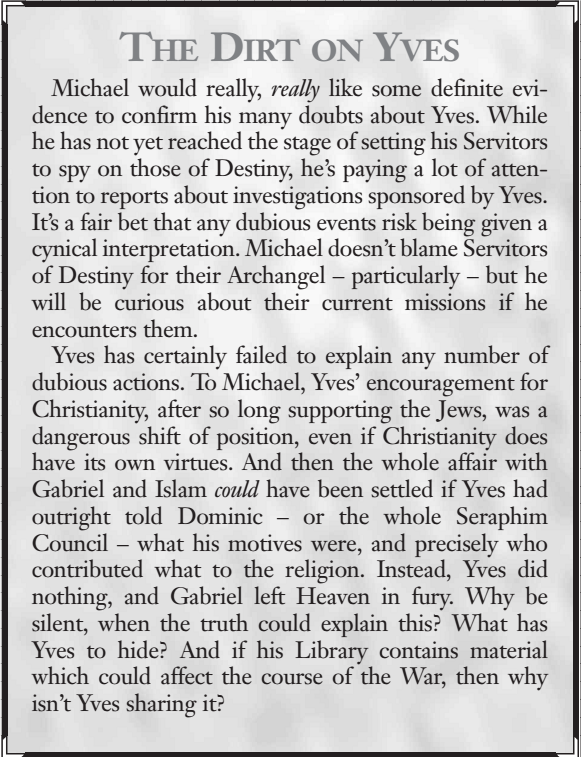
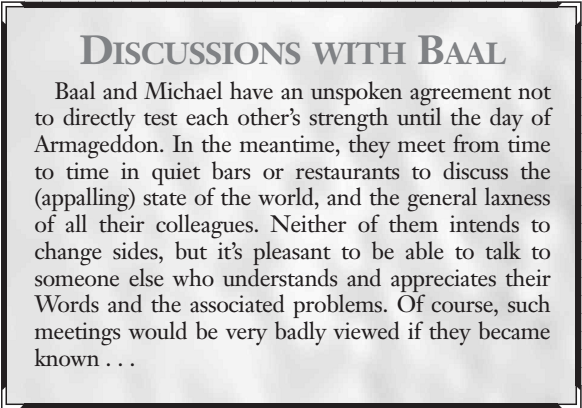
Michael's more than a little hypocritical about Dominic.
It is said that when Lucifer called the angels to him during the Fall, Michael came to speak against him. None of the newly Fallen dared to strike the Firstborn, and he went to Lucifer alone. Lucifer asked him how he could be content to submit to God instead of testing himself and conquering in freedom. He offered Michael leadership. Michael said simply that he served the Truth of God, and that Lucifer had made himself the Lie and was Light no more. Then there was war in Heaven, and Michael cast Lucifer down.
The Fallen of War have their own stories. They say that when Michael duelled Laurence, he demanded a price for letting Laurence live. The cost was this: that Laurence would never interfere with Michael's actions or command him. He could make suggestions for Michael to take or leave, but he would not accept orders. They say Laurence agreed and was spared. They quote this story to support their own actions in Falling, saying it proves that the strong can do as they will. Angels of War and the Sword deny it entirely.
None will claim the tale, but there is one about Michael and Yves, at the birth of Islam. They say that Michael went to the Library, for the first ime in decades, to speak to Yves. They walked together, and three times Michael asked him why he acted as he did. Three times, Yves told him he'd been acting as he thought best. At last, Michael said that if Yves would not trust him, he would not trust Yves, and left the Library. He has never returned to it.
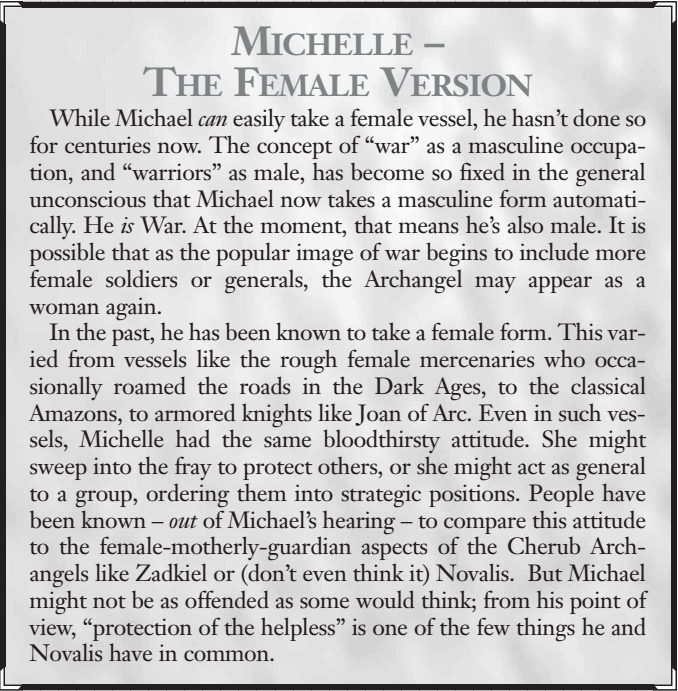
Michael rules over the Groves as his Cathedral. The high treetops belong to Janus and the underground to David, but ground level is Michael's. His angels work there with the souls of the Saints to train and perform war games. They are not forbidden to go to other parts of Heaven, but they like being on their own turf, and most Warriors can be found in the fields, clearings or tents of the Groves. It can be unnerving to visitors, especially as some of them enjoy challenging strangers to spar. Those who decline will not be molested, but will not be accepted in the way those who are prepared to fight will be. The endpoints of Tethers are scattered about the groves in rough stone arches, convenient for moving supplies ot troops. They often serve as nexuses for casual gatherings, chats and games. The tents are a reasonable distance fro mthe practice grounds, to avoid collisions. There are a number of low and unmarked buildings about the camp, where relics, weapons and records are stored, which can extend down several levels, though never into the Catacombs. They are guarded by angels of War who check the identity of anyone claiming to have been assigned weapons, as sometimes a Warrior will try to get something big and dangerous without going through authority.
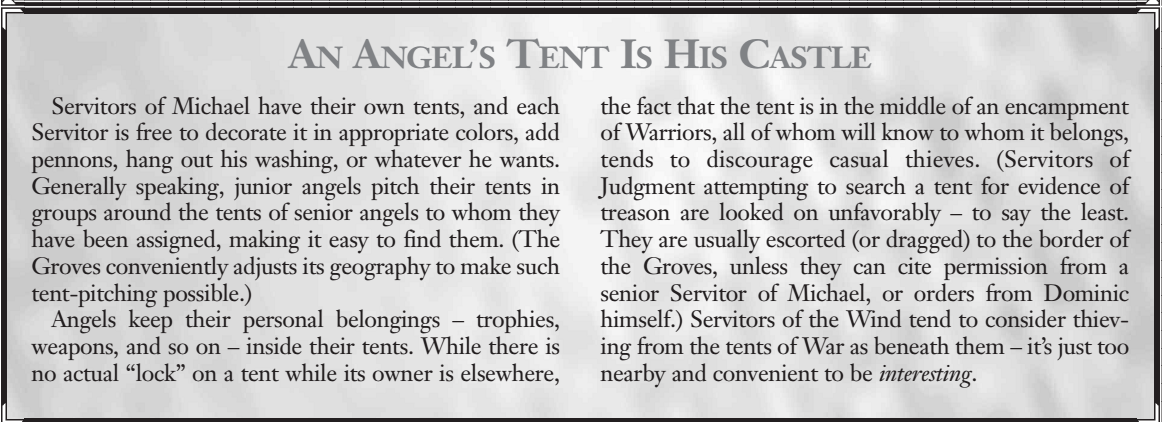
The Relic Bunker is a low bunker believed to house most of the relics handed out to angels of War. Despite numerous attempts by the Wind, it has never actually been breached, even with explosives. The only entrance is guarded by several Cherubim, Seraphim and Elohim, who reqire authorizaiton to let anyone have anything. They don't allow visitors in for any reason, instead bring out assigned items. Often, orders will include return of the relic, and the Cherubim get quite annoyed at damaged relics - even to the point of challenging to duels, as failing to keep weapons in good condition is unsuitable for Michael's angels.
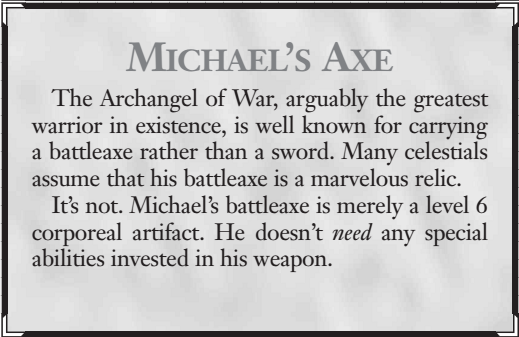
Next time: More of Heaven
War In Heaven
Original SA post Superiors 1: War In HeavenThe Military Records bunker exists because while Michael hates Dominic, he firmly believes in military intelligence. It holds all records, Distinctions and so on, but on the lower level it also contains data gathered by his agents. Most Warriors and several other angels suspect but can't prove there are secret records down there. At the bottom is a lock only Michael can open, holding his personal records of all useful mercenaries, allies and non-hostiles he can count on, which includes ethereals, sorcerers and even some demons. Judgment would not be happy to learn this. Entry to the upper bunker, to check on records, takes permission from the Cherubim on duty. The lower levels with the confidential information needs permission from a superior officer and clearance to get past the Malakim and Seraphim on guard. No one but Michael gets into that locked area at the bottom. The secret records are also encoded, just in case an angel accidentally finds a way in from Yves' Library.
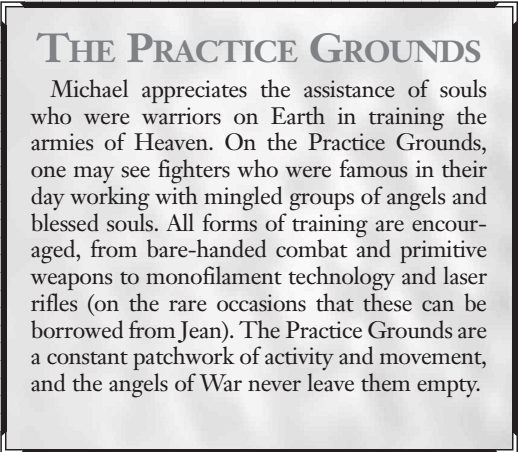
Michael's Feasting Tables are overseen by Doxas, Angel of Glory, who leads the rest of the Warriors in feasting and song, telling of great exploits. While anyone is theoretically welcome, obvious outsiders are going to get asked to tell a story of their own deeds. Cowering or being unable to will result in being ejected or isolated. Creationers show up often to hear the stories, as do the souls of children, however much the angels try to stop them.
The Dueling Grounds lie at the center of the Groves. They are used by warrior angels to settle matters of honor. While more peaceful angels dislike it, Michael, Janus and David all ecnourage their angels to settle things there. Musashi and Cyrano de Bergerac will serve as seconds for those that require them and any senior angel of War can be a judge. The duel is always stipulated first - first blood, first serious wound or yield. Weapons of all kinds are available, and bare-handed fighting is also allowed. Duels to the death are forbidden. Anyone that cheats are atttacks after a yield will be suppressed by the Warriors present to watch, and there's always some. The excuse of getting carried away by enthusiasm is not approved of but is understood...as long as any Seraphim present say it's true. Malicious cheating will result in being ejected from the Groves and reported to your boss. If the cheat is an angel of War, theat reputation will spread, and they don't like cheaters.

Warriors stick together almost as much as David's angels do. They are often seen as prickly, oversensitive and too proud for their own good, as well as prone to starting fights. However, they do share a brotherhood of warriors, no matter where the battle takes place. They enjoy humans that imitate their courage, stubbornness and self-sacrifice. Many of them can see more similarities in those humans than in some angels, and it can lead to a camaraderie that amazes angels that are used to the idea of angels of War being proud and arrogant.
Less thoughtful Warriors tend to divide others into a split of combatants and civilians. Combatants are expected to hold their own in a fight, stand up for themselves and handle reasonable injury. Civilians are unfit to fight and must be protected to the death. This applies to both angels and humans, and a civilian may be treated with more respect than a half-hearted combatant that fails to do their best. A Mercurian of Flowers who won't fight may be wrong, but they're be treated better than a Malakite of Lightning that tries to avoid combat. Warriors like those who stand by their beliefs, even if those beliefs are incorrect. More perceptive Warriors believe that anyone can struggle for their beliefs, just in their own ways. They avoid the civilian/combatant dichotomy, judging others by situation and merit. They also only give assistance when they feel actually needed, ignoring those situations where someone should be able to do it themselves.
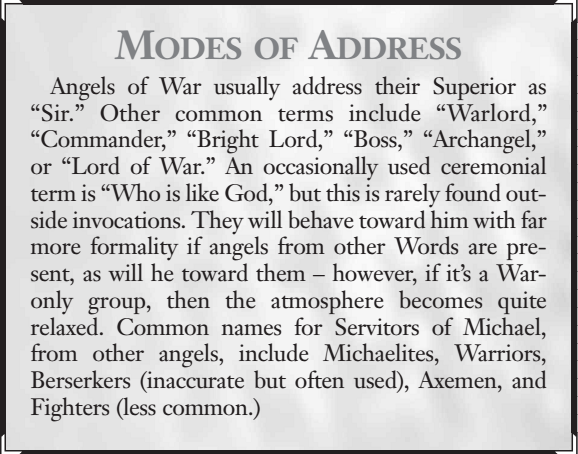
Michael runs a military organization, but a rather personal one. Junior angels obey their seniors, but there's rarely a direct chain of command. Angels take orders from Michael, obey any seniors present and get the job done. Any angel of War that ignores information or help from another, even a junior, and screwed up as a result will get a reprimand, as would any Warrior that followed chain of command into error. Winning is what matters. Of course, those angels that make a name for themselves and collect Distinctions or trophies are better supported, as they've proven superior and worthy of respect.
The most common organizational structure for angels of War resembles Celtic warbands, with a group of similarly ranked fighters under one chapion. However, they also tend to have a number of skilled specialists. They may even include humans or, more rarely, ethereals, Lilim, Outcasts or Renegades. This needs clearance from Michael at the earliest opportunity and should not be waved in front of Judgment or those that might take offense. Michael himself sometimes assigns non-angels to a group, too. Stories of each others' deeds are traded between angels, and it's said that Doxas, the Angel of Glory, can recall the deeds of any Warrior and often does. While a holder of a higher Distinction would not expect other Archangels' servants to know it, they would expect any angel of War to recognize their name and eed without reminders.
As one rises in power, Michael expects you to give time to training others, even as he does. Junior angels are usually assigned to learn from seniors, if not serve them, and older PCs are expected to keep an eye on younger angels of War around them and keep them from too much trouble. If several angels of Michael are in an area, they usually understand who's in charge, deciding it via spars, cooperation or just comparing stories. That angel will be in charge of coordination, passing on orders and taking care of everyone else. If there's a Tether nearby, it'll be the acting base and the Seneschal will be the de facto information relay, if not always the one in charge. Squabbles about who's best are unusual, especially when they might endanger an operation, and will earn rebukes from Michael.
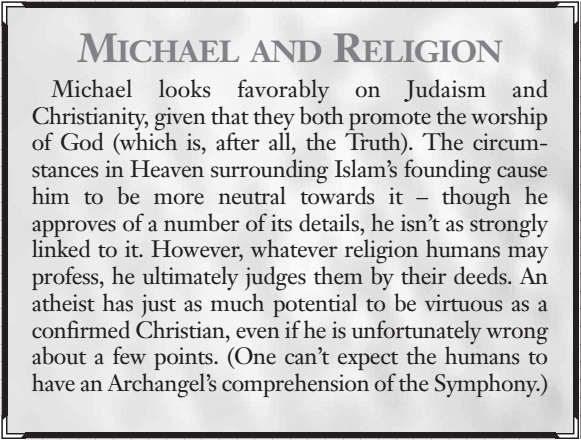
Michael tends not to sponsor structured organizations on Earth, leaving that to Laurence and Dominic. He instead works with separate human agents, each with their own cell, that can team up as needed. Often it'll be one Soldier, angel or Saint that gathers a team of various skills around themselves, who may or may not be either Soldiers or aware of the War at all. The head can then contact other heads or the local War Tether as circumstances dictate. This means that if one cell is found, it won't compromise other groups necessarily. However, it also means a cell can be lost or corrupted without anyone knowing about it. To prevent that, Tethers of War usually ask for regular check-ins from the cell head.
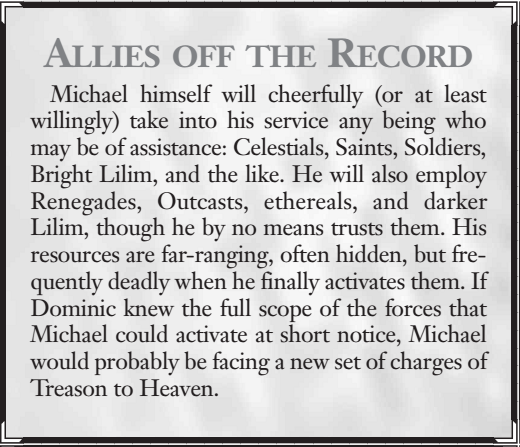
Humans serving Michael have unusual freedom, for Soldiers. Angels of War tend to look at them more as younger siblings than as mere humans, considering them bound in the brotherhood of warriors, regardless of gender. Some of these humans may be rather unenthused about humbly obeying non-War angels, having grown used to more equal relationships. It's unlikely to lead to outright disobedience, but could lead to questioning reasons for orders or offering their own suggestions. Michael believes that if angels are, in fact, superior, they should be able to handle this and besides, humans are supposed to think for themselves anyway. Soldiers of War aren't always martial or military. Some work with the police, hospitals, schools or - well, anywhere that the spirit of War can prosper. They're people that stand up for their rights and the rights of others, who will risk defeat for the sake of victory and who believe deeply in their causes. A local Tether or ranking angel will have the names of all Soldiers and aware humans nearby, and may activate them as needed.
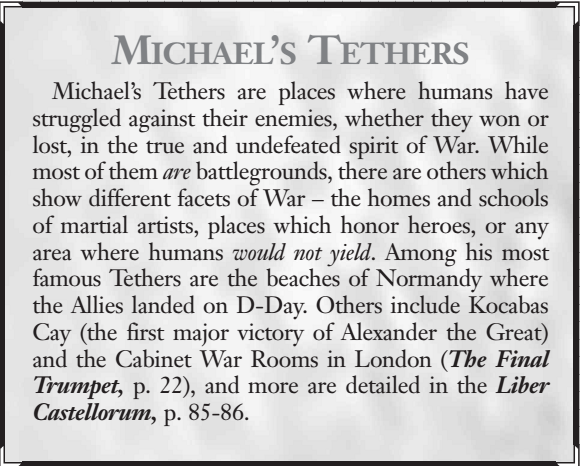
Michael is known to his angels as tough but fair. He expects a lot from them, and doesn't bother with performance reviews or codes of honor - he just wants them fight Hell wherever and whenever they find it. This means both freedom and responsibility. Angels of War can pick their methods and targets, but they have to answer to Michael and their own conscience. Michael's usually understanding if you had good intentions, but he expects you know you fucked up and to take your punishment 'like a man.' Michael is kind of aggressively masculine. Further, you have no one else to blame - any fuckup is your fuckup, and the guy you have to report it to is Michael himself. In return, he will protect you. He'll yell at you if you do wrong, but he won't let anyone else do it. Ambition is generally out of a real desire to excel and help people, not just a hunger for power, which Michael discourages when he finds it. He prefers camraderie and angels that help each other and tell each other stories. Some things, however, are beyond both Michael and his angels. They don't understand cowardice, indecision, inaction or giving up. Anyone who does any of those things is going to have a lot of explaining to do, and would probably be best off asking to serve another Archangel. Michael will usually allow this, preferring to lose one of his children then make a non-warrior try to serve him with unacceptable faults.
Next time: Codes and trophies
There Is Only War
Original SA post Superiors 1: There Is Only War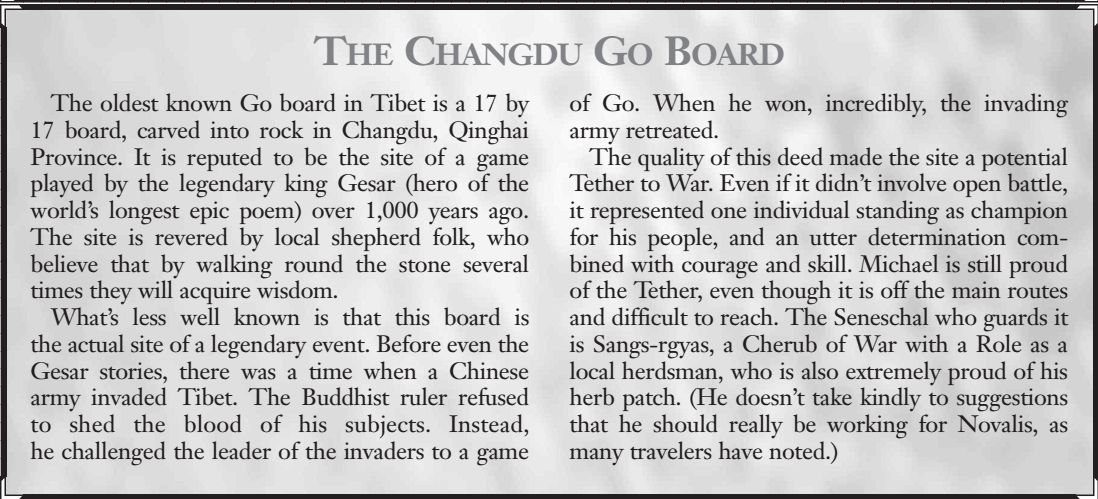
Angels of War have devleoped a complex code of signs made from things like rocks or broken twigs to warn each other. It's very basic, with messages like 'Demons of the War near here' or 'this place is watched', and enough angels have Fallen that the code isnt' totally secret, but few demons or other angels would think to look for it as a matter of course, or know its full range of meanings or how to make them. Older angels of War also remember the days when each knight had their own colors, device or shield. It's rare these days, but some of them develop their own personal sigil, signature fighting style or calling card on their kills. It's more common among the older angels who lived among medieval humanity, but it's an occasional fad among young ones. These tokens can also be used to quietly signal other angels of War about your presence without alerting the ignorant. The use of symbols may be temporary or permanent among groups of Warriors, and on Earth it can result with clashes with Stone-founded gangs. However, even if they aren't as regimented as Laurentines, Warriors always know which flag is theirs to rally to are deeply protective of their standards. Beyond that, well, others call it vanity or gross, but Warriors like to take trophies. After all, they won, so they deserve it. It can range from taking weapons to body parts, and it occasionally you meet an angel of Michael with a necklace of dried demon ears, but the most beloved trophies are the standards of demonic armies or the insignias of potent demons. The top would be a Prince's personal sigil, but that happens rarely at best.
Michael's reward and punishments come at the ends of missions - he doesn't keep general watch over his angels. Indeed, that might not even come from Michael directly, but from whoever's in charge of an area. If an angel of War notices a sin or problem, they're just as likely to demand an explanation on the spot as to report them to the boss. Either way, a senior angel will tend to haul the sinner in for one-on-one chat, assign a punishment themself for a minor offense or report it to Michael. Rewards and punishments not directly from Michael tend to be minor - a relic, a Rite from a Wordbound. Punishment will usually be a loss of a relic or tool or just getting beaten up or forced through grueling training. The worst they can do, though, is spread the story of your failure, as that ensures it'll never get forgotten.
Michael himself handles the more serious rewards and punishments, generally focused towards what you did to earn them. An angel that liks Songs but runs low on Essence might get a Rite, while one that prefers sneaking missions will get powers related to stealth. Michael prides himself on known his angels enough to give them what they really want, after all. He always rewards recruitment and gathering useful intelligence, as well. Punishments for failure depend on the consequences and whether it was clearly your fault. If it wasn't, you might not even get punished. Michael knows you can't always win and will just expect you to feel bad about it. If it was your fault, though, Michael will take your shit away for your error, and will expect you to accept it. Resenting your punishment or complaining means you haven't learned and won't be given much until you do. Michael does Cast Out angels, but only if he thinks it'll help them understand their problems. Usually, these are angels wo are too eager to fight and feel too bound by Heaven's discipline. He hopes they change their mind after firsthand experience. He tries to track his Outcasts, so he can destroy them if they fail to learn. If he believes an angel is corrupt and will Fall, and that this can't be avoided, he'll kill that angel in battle.
Warriors believe in reducing the enemy ranks, and evn if they like to fight, most of them will admit that Redemption removes a demon from Hell and gains strategic information, so it's win-win. However, most of them aren't very good at talking to demons about the philosophy of Redemption and service to Heaven. Their Redemptions tend to be carefully orchestrated campaigns of gaslighting and forcing events to make a demon see the light, or the kind of heart-to-heart, man-to-man chats that can end in violence if they don't work. Michael himself, if asked to Redeem a demon, will do his best to ensure they survive - but it's going to hurt. If they do survive, they'll be debriefed by Elohim, Seraphim and Mercurians before any thought is given to where they should go next. Those that serve Michael are not given solo missions for years, as much for their own safety as anything else, but are often given jobs where knowing Hell's methods is useful.
When a Warrior Falls, the angels of War remember them as a brother or sister, and will gladly try to get them to Redeem if it seems possible. This can involve forcing them to face old friends, showing them the distasteful side of other demons and generally trying to get them to leave Hell behind. If it fails, they will kill the Fallen as quickly as they can, with more dedication than some Judgment angels.
Newly made angels are trainees, and about half of them are relievers while the other half are full angels. They are taught to fight, first by the blessed souls and then by other angels. They meet with angels of Stone, Wind and the Sword, but are never sent outside the Groves unless they want to go. Young angels of War tend to be insular, prejudiced and overenthusiastic about storming Hell. Michael tries to send them to Earth as soon as they have the skills, to get experience in areas without too much risk. Unfortunately, their attitude hasn't really helped his angels' image as rude, aggressive and dangerous to be aorund.
Seraphim of War take Michael as their role model as well as their champion, strengthening themselves to face evil in any form. While not all of them are axe-wielding furies, many are. Most of them have a two-step view of dealing with Evil. Step one: identify it despite its lies. Step two: kill it. The only healing from Evil comes via truth - the truth that it's been destroyed and that every living being has the strength to choose to fight it. This tends to make them blunt and harsh, but also menas that they will whatever they can to fix a problem and won't leave it alone, however painful it may be for everyone involved. Truth is truth - it's not kind or gentle.
Cherubim of War are even more paranoid than most about supernatural threats, given their ability to detect natural ones in advance. Their reaction to learning about demons threatening their attuned tends to be 'kill them before it becomes a problem.' They're twitchy and often torn between staying to protect their attuned or going out and preemptively murdering nearby demons. Under more normal circumstances, they can be calm and placid, as they can sense danger early on. They're normally unfallapble, even in the midst of chaos, as long as the supernatural dangers aren't showing up.
Ofanim of War feel the need to move constantly, taking rest as a defeat, a choice not to be currently working. Even when they should be relaxing, they fiddle with plans, maps and messagers. It's frustarting even for other Warriors. They can be excellent strategists, though, ando nce committed to a plan, they can be almost as calm as Elohim, finding the right moment to go into action. They are also more resigned than most to retreat, even eating dissonance if they think it's necessary. They understand that sometimes you need to live to fight another day, and they sympathize with that urge. They aren't cowards, though - just pragmatists that like to pick their ground and will take dissonance over a bad stand. Better still, though, is to plan a campaign of hit-and-run attacks.
Elohim of War can tell when people are ready to fight and die, and they tend to use this as their standard to judge others by. They are thus immensely good at psychological warfare. Any enemy that won't be willing to die can be scared out of fighting, and that's one less enemy to worry about. This leads to a bit of a behavioral dichotomy. Most of the time, they're quiet, unobtrusive undercover agents trying to avoid notice. But when they want to break someone's courage, they will fight flamboyantly, threatening maiming and torture, even carrying it out if they must. To them, all situations must be judged by the circumstances. There are no hard and fast rules. Other angels can find these sudden shifts in behavior troubling, though.
Malakim of War can sense danger, and they're always listening for it. They tend to be entirely relaxed when they can't feel it coming, and tense when they can, though they're not stupid enough to relax in situations that need caution. Their laid-back attitude can bother other Malakim, who tend to feel that evil can strike at any time. They're also fond of telling stories about their exploits, comparing trophies and so on, which annoys some angels. However, even the most ascetic angel must admit that they fight evil thoroughly, efficiently and as muchas they can - they just like to do it with style.
Kyriotates of War use vessels, and that means that once they get any host into an area, they can call a vessel out of nowhere. It's very annoying for demons that think they have the Kyriotate cornered in a small body, especially if the vessel is armed. They don't tend to gather a circle of hosts as other Kyriotates do, as they usually have their vessel to live in. However, they will possess humans when they must and they think strategically. Typically, they specialize in using small, convenient hosts like rats or sparrows to get into places, then call out the heavyweight vessel.
Mercuarians of War need to genuinely like helping people, because all the other angels of War expect them to smooth over any arguments they cause. As it is, while they don't hate doing it, they tend to prefer avoiding unnecessary fights. If assigned to an area or group, they study the local customs to avoid causing offense by accident. However, there is a certain status to being Michael's only diplomats. They might grumble, but they wouldn't want to lose the job. When needed, they will take their place, confident and stylish. They are also the best of their Choir at knowing when to abandon diplomacy and call in the killers.
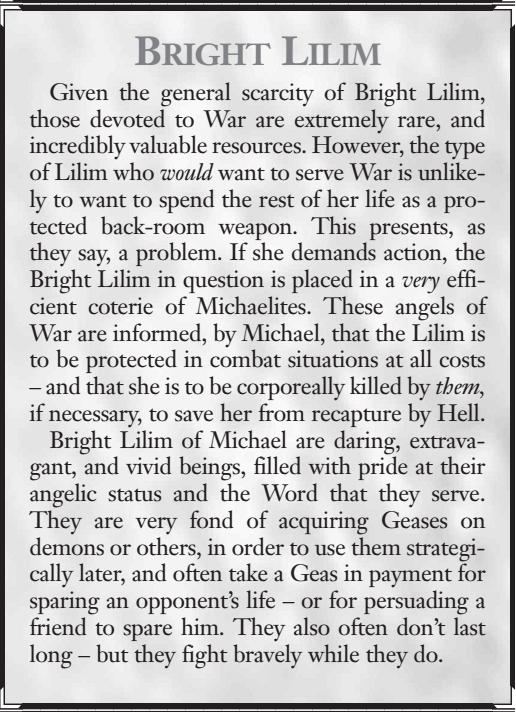
In Heaven, angels of War do four things: they serve as guards, train others, train themselves and help the blessed souls that come to the Groves. They guard Heaven's walls alongside the angels of other Words, and tend to feel that they are the most vital to the job, as it was Michael who threw Lucifer from Heaven. It's usually Malakim and Seraphim that do the guarding outside the Groves. Inside, it's Cherubim with help from Elohim and Seraphim. They also watch Tether endpoints, less to guard them and more to be ready to help as needed, and there is no Choir preference for that. Training, of course, is for everyone, of any Choir or age. However, when a student becomes advanced, they tend to learn from their own Choir, as angels don't move in the same way across Choirs. The blessed souls that come to the Groves tend to enjoy sparring or telling their stories, which makes them easy to deal with. Those in grief or pain or who have come to the Groves to understand and rid themselves of cravings for violence are mostly cared for by the Mercurians and Elohim.
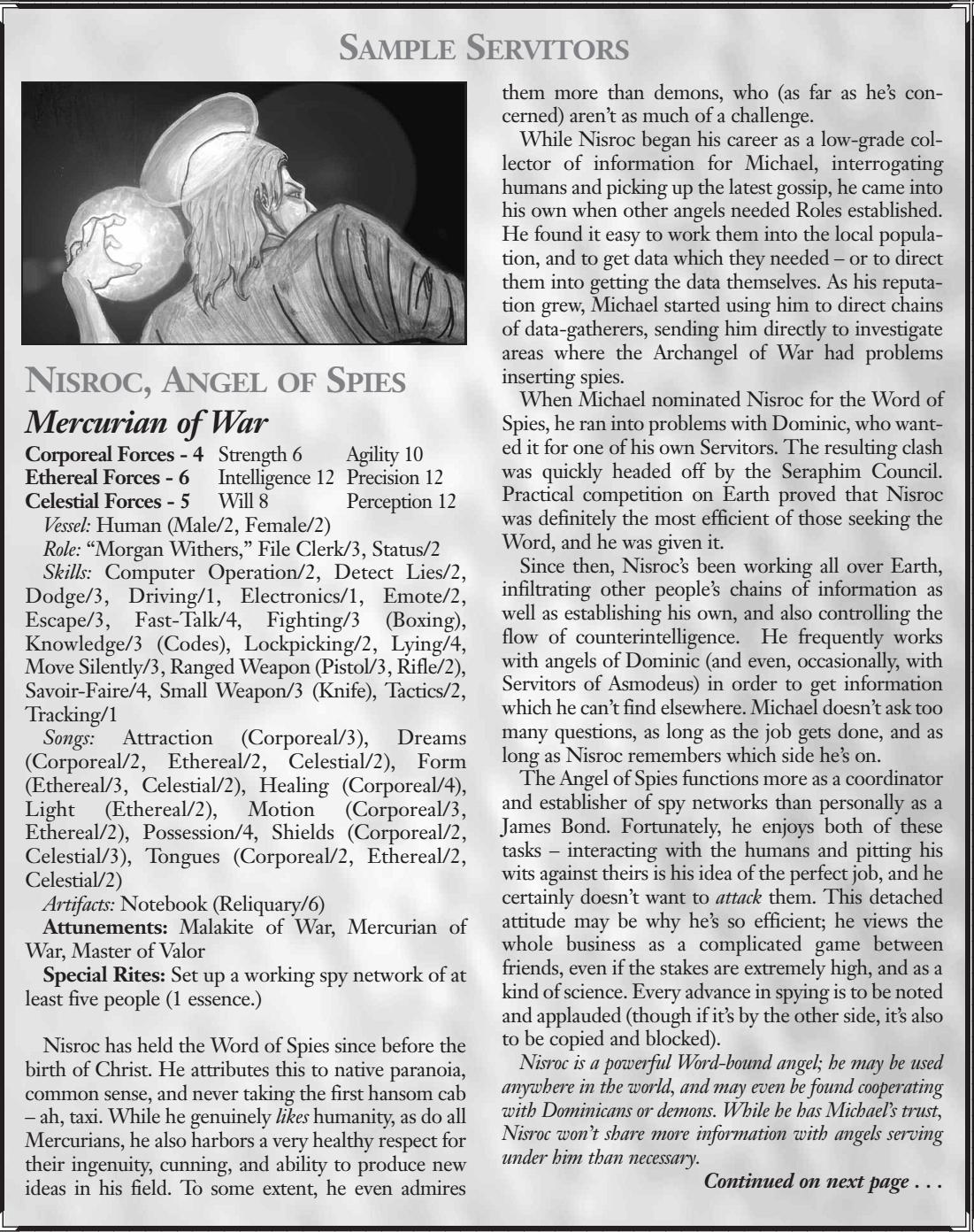
Next time: The end is coming
And End to War
Original SA post Superiors 1: And End to WarAngels of Michael are in the Marches for two reasons only. First, they have a mission that brings them there. Second, and much more rarely, they're backing angels of Dreams. If they're on a mission, which might involve dealing with ethereals, fighting dmeons or just inspiring a human, then it could be any Choir, though Michael prefers to assign Elohim to evaluate, Cherubim to protect and Mercurians to negotiate with ethereals. If they're assigned to help Blandine, though, they're usually muscle, and thus Malakim or Seraphim, who may or may not be informed that they're under orders of the local ranking angel of Dreams, to permit retreats. If they aren't, Michael will give them personal instructions about how far they are to go and when they might want to retreat, if ever.
On Earth, Michaelites work either in offense or defense - and the best defense is a good offense. They hold their ground, sure, but also guard, spy, recruit, fight and help allies. Seneschals guard their Tethers to the death, and angels assigned to help them or guard other objects tend to be Cherubim, perhaps alongside some other Choir to get information on any attackers. Spies are usually those who can lie well - Elohim, Mercurians, Cherubim and Saints. Seraphim, Malakim and Ofanim are too easily identified, and will only be used for unique missions. Kyriotates make excellent spies, though, Michael regularly uses them to infiltrate spying operations by others, and rumor has it, even other angels' efforts, to copy their information. Recruitment is mostly the job of Malakim, Mercurians and Elohim, who can judge the qualities of the humans they deal with, and these recruitments usually happen incidentally rather than by assignment. Some angels of War are assigned just to wander Earth in search of trouble, solo or as a team. Others are traveling strike teams, heading wherever Michael needs warriors, though often with at least one Mercurian to serve as their diplomat. Lastly, angels of War are sent to help other angels. Whoever asked for the help will tend to want to get them full details on the job, so that they get a group that can handle it, but often angels of other Words don't have the training to accurately estimate a situation and ask for the wrong people. In those cases, the Warriors like to take over the mision entirely, rather than leaving it in the hands of someone they think is an idiot. They aren't dumb, though, and will listen if it's urgent or if Michael specifically tells them to.
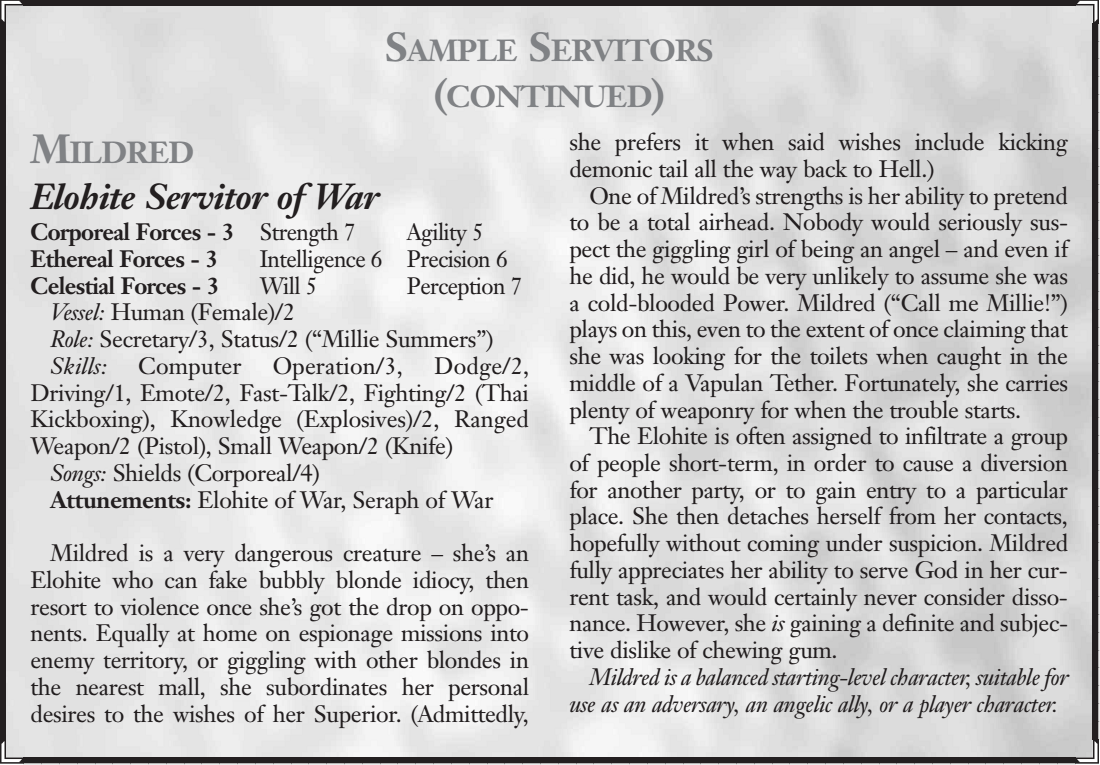
Sometimes, angels of War are given weirder jobs - working their way into the media to collect and preserve the experiences of human fighters, protecting neutral areas or even sheltering ethereals or 'good' sorcerers. The first set of jobs are simple - Michael wants to protect his Word from Nybbas and the tendency to make wars into simple sound bites. If that means communication channels are a new battlefield, so be it, the truth of War must be preserved and spread. Protecting neutral ground and people, though, that's part of Michael's belief that anyone that isn't against him can be made an ally. Ethereals are useful, neutral ground must be kept free as a place where they can meet angels or be safe from Hell. Of course, other Archangels might not agree, so only trusted angels of War get these jobs.
While they might not admit it, Warriors do suffer self-doubt and regret. They try not to show it, of course. They support each other in these times, reminding each other of their purpose iwth stories of past glory or just being there for a brother or sister. They often react to stress with self-indulgence in alcohol, sex, food, gambling or other methods. Other Warriors understand and accept it as long as it doesn't affect their skills or responsibilities. There's nothing wrong with relaxation, after all, especially if it helps you do your job. But if your indulgence makes you fail, well, first they'll tell you to stop, and then may force you to go cold turkey, since responsibility is the price of freedom. While proud, though, Warriors aren't stoic. They weep for dead comrades and the Fallen, and grief is respected by angels of War.
Befriending other angels depends on their Word. Angels of War are rarely comfortable around Judgment or Destiny, and tolerate Flowers only as support staff, aggressively 'protecting' them from getting near battle. Stone, Fire, Wind and the Sword are valuable allies, and Animals, Dreams, Trade and Lighting are useful in their area, though unreliable outside it. Angels of Creation are too variable to predict, but are dedicated. After first prejudice, of course, an angel of War can get to know people, and even Judgment or Destiny can earn respect by hard work and determination. Few Warriors admit to prejudice, instead claiming to 'strong feelings on the subject.' Any Warrior that regularly hangs out with a Judge will have to explain themself often, though, an the Judge will need to suffer hazing, but the excuse of 'well, he's a good fighter' is commonly understood. Some of them ore perceptive Warriors can even grasp views that don't center on struggle and battle and appreciate them. This lets them be more polite to other angels, and Michael tends to use them as inter-Word liaisons or for mixed forces. They are no less fervent about War, of course.
Every Warrior knows it's dissonant to flee unless ordered to do it. Not only that, it's shameful and acknowledges defeat. Retreat isn't just inconvenient - it goes against the nature of War. But sometimes, it has to be done. Sometimes, it's obvious that a battle is lost and that staying will just mean more casualties and no gain. Sometimes, you're needed elsewhere, or you're luring demons into a trap, though that only tends to happen on large scale and with retreat given by order. It is the duty of every angel of War to balance their pride and integrity against the reality of a battle. If fighting means they'll die for no useful purpose, better to take the dissonance. Michael wil ldeal with this case by case and may remove the dissonance if he believes it was taken in a good action, like protecting fleeing civilians. Motives matter, and it's rare for any angel of War to have never taken dissonance for fleeing. Senior angels have the authority to command younger angels to retreat, saving face and dissonance, but they'll be taking the dissonance themselves for it. Michael will understand if circumstances warranted it, but there's always a sense of guilt, probably not helped by the fact that most of the younger angels will have opinions on what was done wrong. (Angels of War always have these opinions.) An angel that orders a retreat will only do it after much consideration and a belief that it is absolutely necessary. Otherwise, they will fight to the death. If an angel from another Word has authority, they can order a retreat, and tend to agonzie less, but for angels of War to avoid dissonance, they must fully accept that the order-giver is in command, and they tend to dislike that. Just pretending they're in charge won't work, nor will it prevent dissonance - that's just trying to game the rules, and no right-thinking angel would do it. Older angels of War rarely manage to make the younger ones appreciate orders to retreat, but when a younger angel has just gotteen their first dissonance for fleeing, they're ready to listen to the tale and share their own. Angels of War do have standing orders to retreat from any Demon Prince unless they think their death will accomplish something...which, sadly, they often think they can.
When dealing with Judgment, angels of Michael tend to start things off on the wrong foot, despising and provoking them, which definitely doesn't help. Judgment tries to be noble and unbiased, but the angels of War don't make it easy. Michael will support them and protect them and he expects them to show confidence, but he doesn't appreciate being pulled into needless fights. If an incident could be avoided, if the Judgment angels are actually right and especially if it risks one of Michael's secret operations, it's best not to get too aggressive. After a few encounters, most angels of War figure out how far they can go. Very young angels sometimes challenge members of a triad to duels, but older angels tend to force them to stop and apologize. War prefers to take care of its own problems, but the older ones know when and how much to cooperate. While they'll clear it with Michael first, they're prepared to work with Judgment, usually when cross-Word corruptin is involved. This lets them control how much Dominic gets access to, after all.
The game then moves into adventure seeds, Most of them aren't especially interesting, though one of them involves Stone trying to take over a Game prison camp and turn it into a redemption factory if possible by literally disguising themselves as demons of Kobal, and another about Michael trying to send in a team to extract a (paid, non-Soldier) asshole human contractor in the War.
The End
So, what next? We can look at the GM's Guide, the Player's Guide series, the Revelations series, the Liber series or the next in the Superiors series.